

What’s it Like to Travel in Mozambique?
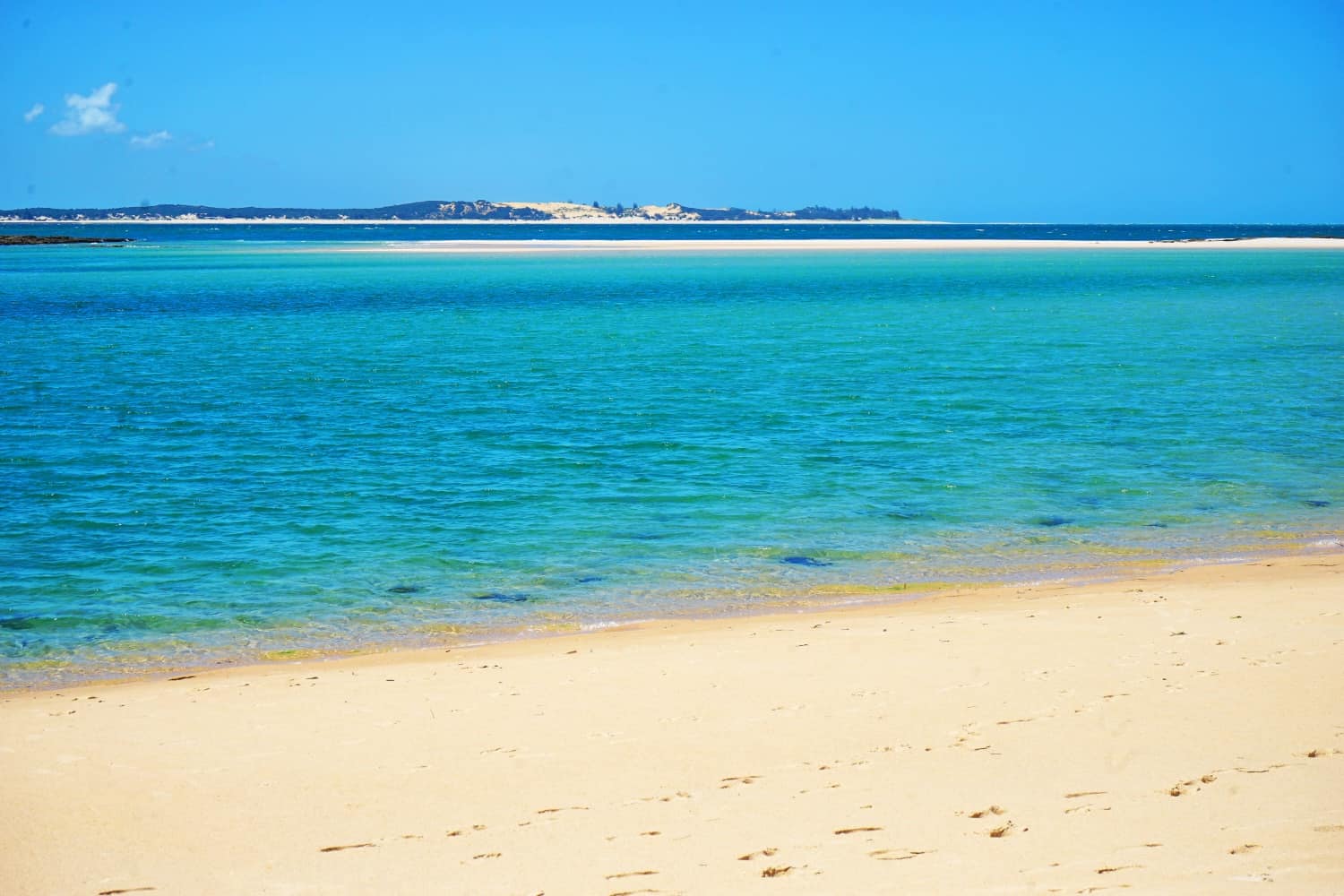
Mozambique is my new favourite country.
Before I arrived, I had no idea what to expect from this little-visited Southern African spot and if I’m being honest, I was filled with trepidation. I had zero experience travelling Sub-Saharan Africa and the prospect of taking my first steps into the region (and doing so alone) was intimidating.
Especially because when I started researching travel in Mozambique online, I quickly realised just how few travel bloggers have been to Mozambique, how few trip reports there are, and how, if you venture into forums, you’ll find dozens of people announcing how unsafe it is and how, under no circumstances, should any woman travel there alone.
So I packed my bags and went anyway, because one of my favourite things to do when I travel is to shatter perceptions of a place.
And Mozambique? It’s perfectly safe for women travelling alone. It’s beautiful. It’s exciting. It’s adventurous. It makes you feel alive. The locals are so welcoming. The food is delicious. The beaches are out of this world.
The travel may be tougher here, but the rewards are far greater.
I tiptoed into Mozambique, wondering whether I’d be fleeing to South Africa in just a few days, but instead had to drag myself out of the country several weeks later. I can’t wait to return.
This is what it’s like to travel in Mozambique.
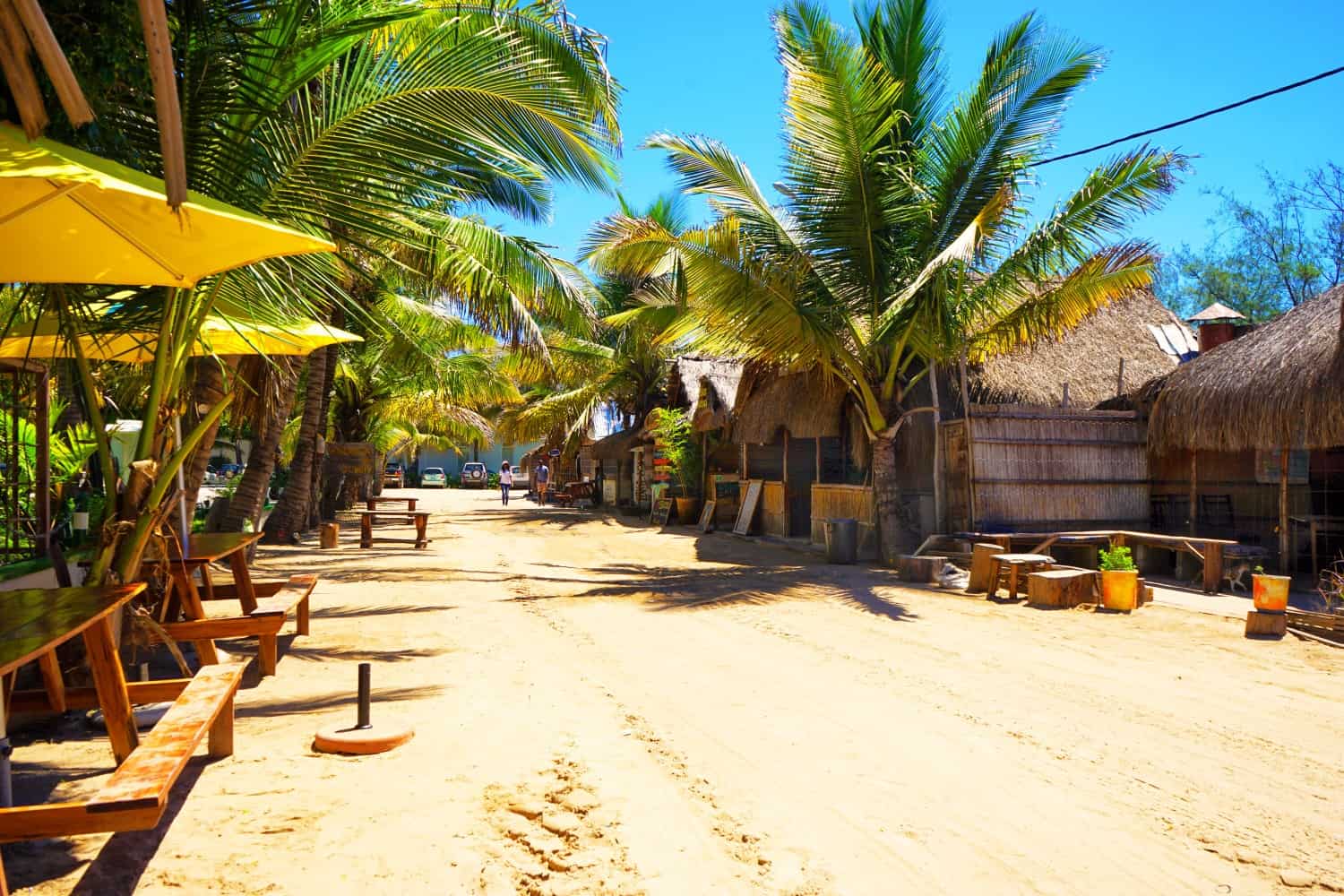
Don’t Believe Everything You Read
Confession: I was terrified when I arrived in Maputo.
It wasn’t that I had no idea what to expect, but that I had read so many scary pieces online that I was expecting nothing but danger. Let’s a take a look at some of the quotes I stumbled upon, from articles, blog posts and comments in forums:
Criminals are forceful and ruthless, often work in groups, and carry firearms. Expats and tourists have been targeted in the past, so be sure not to display any signs of wealth: jewelry, running shoes, cameras and purses should be left in the hotel or hidden extremely well. Women should never walk alone on the beach or take the bus unaccompanied. Unfortunately, attacks on female tourists have been increasing. Parents, DO NOT let your children travel to Mozambique! I had a very rough start. Within hours of my arrival in Chimoio I was cheated by moneychangers, had my laptop stolen in a hostel, had to abandon a horrid bus where we were squashed like sardines with stereo blasting. To top things off I was unable to get cash since ATMs very randomly accept cards in Mozambique. I wouldn’t recommend it. I did it a few years ago with my then Girlfriend. In the capital Maputo the hostel had guards on the gate to make sure no-one broke in. Armed guards at the ATM too.
Does that sound like a safe and wonderful country you’d want to visit?
Yeah, me neither.
So, why did I go? Because part of the reason why I even started a travel blog is because I love getting to show the reality of misunderstood places around the world. And in amongst the horror stories I found online, there were gushing reports of life-changing trips in a beautiful country full of welcoming locals.
So I went, and you know what? I felt just as safe in Mozambique as I do in many places in the world. I wandered on the beaches on my own and only ran into locals who wanted to make friends and show me around. I carried my camera and my phone in a bag and took photos and wasn’t mugged. It’s all anecdotal, sure, but I didn’t feel like I was travelling in some kind of dangerous, lawless country. I felt safe and welcomed in Mozambique — it felt no different to wandering around in Southeast Asia, for example.
I learned a valuable lesson here, in not believing everything you read about a place, and the importance of checking it out with your own eyes before making a judgment. Don’t let the fear-mongering online put you off visiting Mozambique — I felt less safe in South Africa, which is a place most people wouldn’t have any qualms about visiting.
If you are nervous about travelling to Mozambique, make sure you’re reading reports and experiences from people who have actually been to the country. It’s too easy for people to leave horrible comments on articles online, speaking about how Mozambique is dangerous, when they haven’t even been themselves.
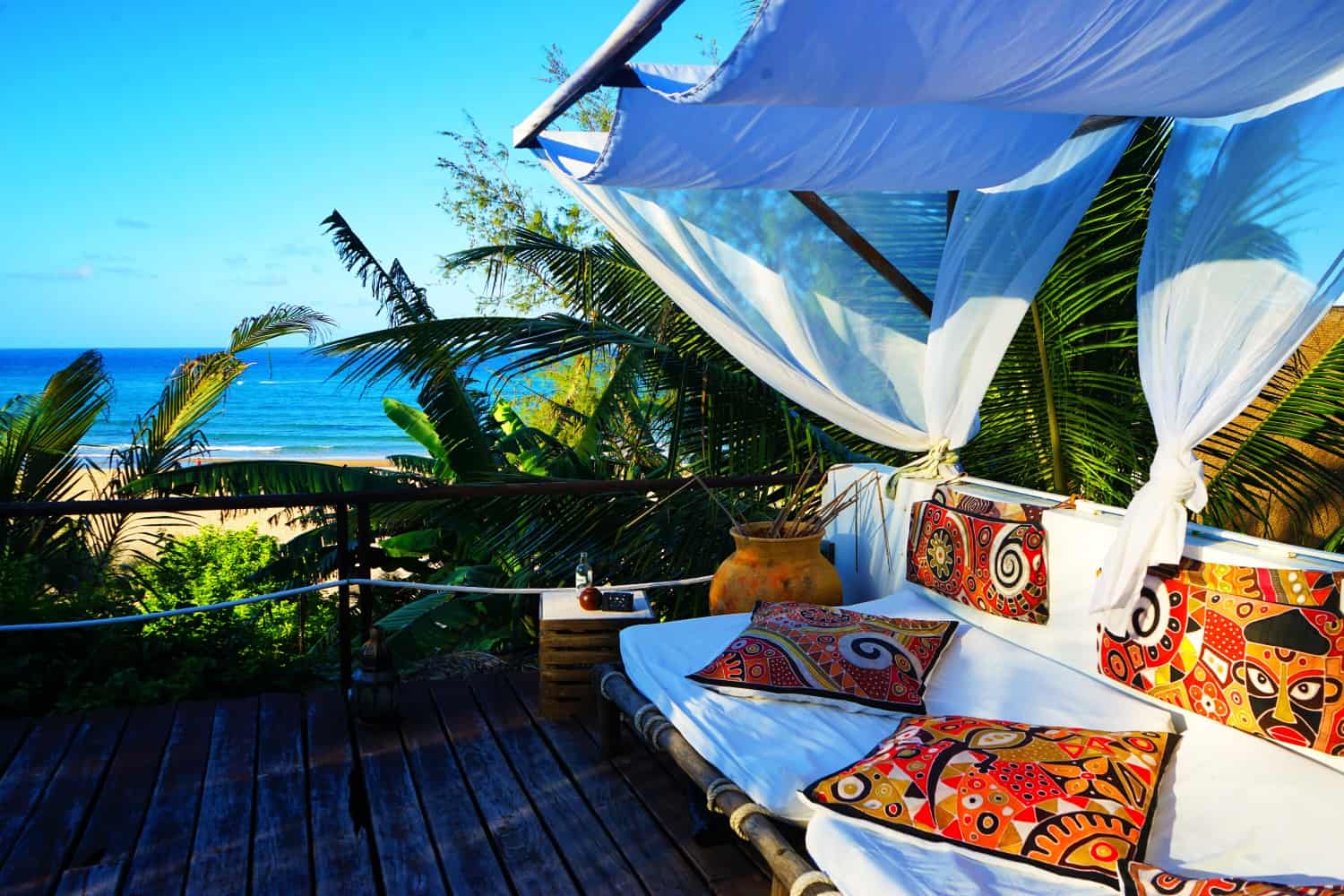
The Visa is Awful to Get if You Won’t Be Travelling Overland Easy to Get
I’ve never written a guide for applying for a visa on this site before, but I’m in the process of finishing up one for Mozambique. Why? Because the entire process was complicated, frustrating, and wholly unclear. It was so bad that I started my application process over a month before my departure date and had my visa approved the day before I left . Man, that was nerve-wracking!
In a typical example of African bureaucracy, you can easily apply for a visa when traveling overland from South Africa. But when you’re flying in, the official stance is that you need to apply for a visa in advance. And to get said visa, you need to have absolutely everything booked in advance and your confirmations printed out, as well as a whole host of other documents and information. I even had to show a photocopy of my residency certificate for Portugal!
The most frustrating aspect of the entire process is that there’s no clarity surrounding the procedure. Some people claim you don’t need to worry and can get a visa on arrival; some say they were turned away at the airport. Some people say you just need to fill out a form; others needed to have bank statement, flight bookings, hotel bookings, letters of invitation, proof of residency. Some people have been told completely different things by two people at the same embassy.
If you’re heading to Mozambique, allow yourself plenty of time to get the visa and prepare for multiple trips to the embassy.
Update: you can now get a visa on arrival! Ignore everything I just wrote :-)
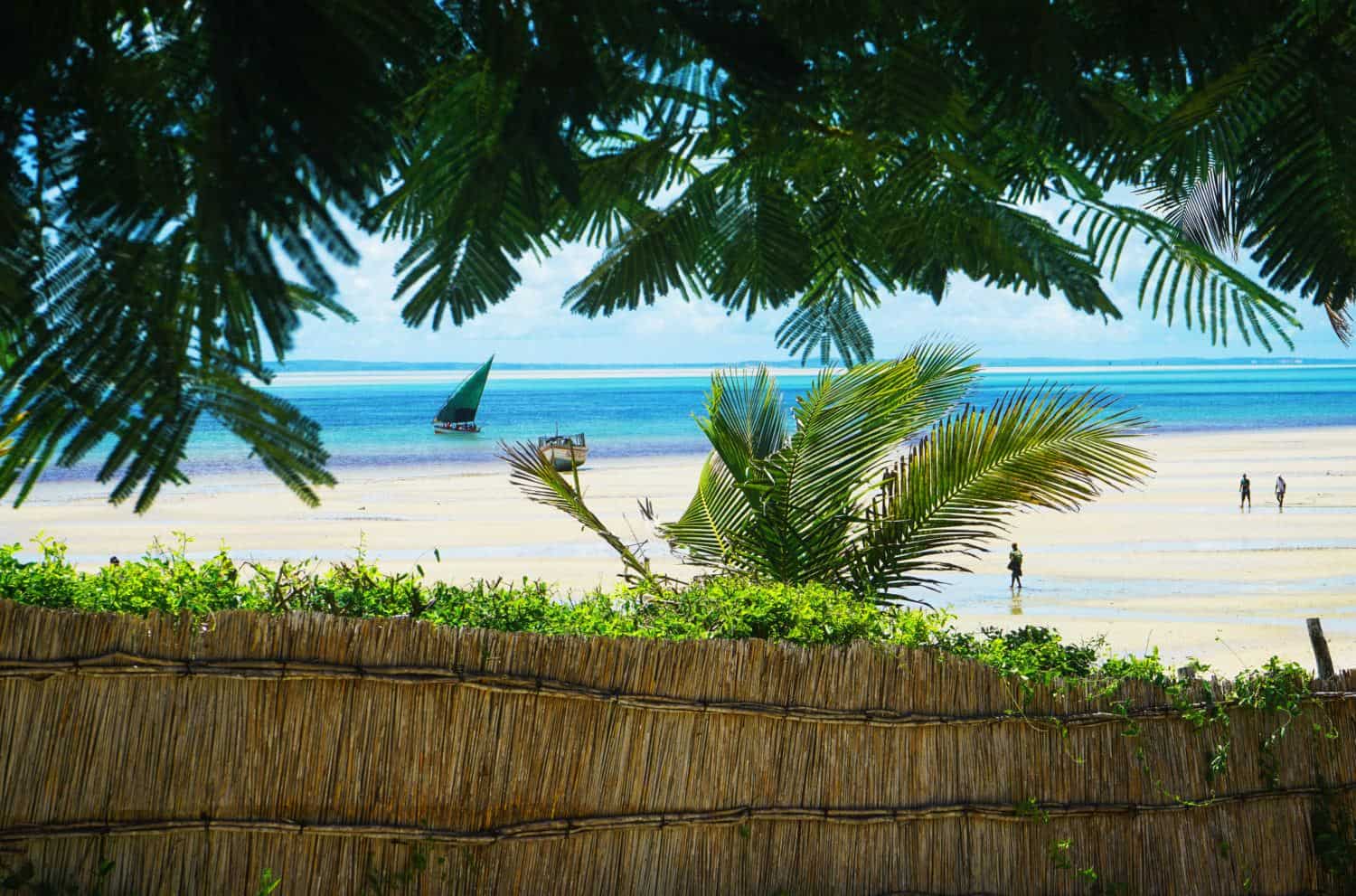
Mozambique is Bigger Than You Think
I gave myself two weeks to explore Mozambique and believed that would be enough time to jump my way along its coastline.
Yeah. Mozambique is so much bigger than it looks on maps! The coastline, for example, is more than 1500 miles long, which is roughly the same length as the east coast of the U.S.
Would you give yourself two weeks to travel the entire east coast of the U.S.? Nope!
That’s a whole lot of land to cover and if you’ll be doing it overland, you can expect to spend days travelling from the south to the north. If you’re hoping to fly, you’ll be at the mercy of LAM, the Mozambican airline. Flights are infrequent and illogical, rarely going from where you are to where you want to be, and especially not on the date you want to fly.
When you’re in Mozambique, less is more. Build travel delays into your schedule and aim to spend three-to-five days in each place rather than one or two. I decided to spend my two weeks exploring the south of Mozambique and will save exploring the north for my next visit. The south is the more touristed part of the country, but the north still has a lot to offer — I can’t wait to finally get there.
If you have a month, you can comfortably see the vast majority of the country’s major tourist attractions. Here’s a quick breakdown of the routes you could follow:
- Two weeks in the south: Maputo, Tofo , and Vilanculos/Bazaruto Archipelago
- Two weeks in the north: Nampula, Ilha de Mocambique, Pemba, Quirimbas Islands
- One month: these two itineraries combined! Maybe with a trip to Gorongosa National Park in between.
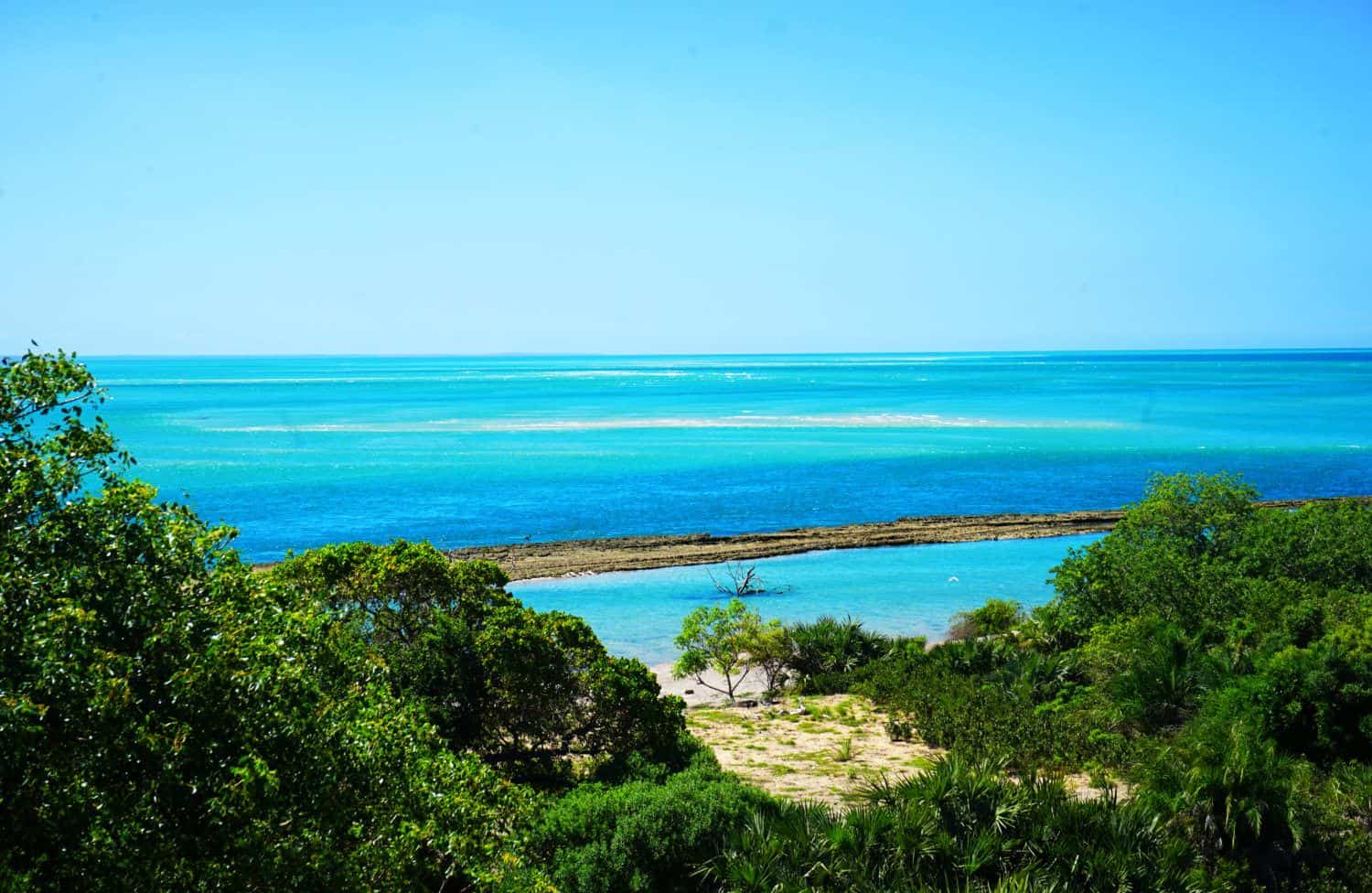
Traveling in Mozambique Can Feel Adventurous
I was surprised when I touched down in Mozambique and discovered that hardly anyone travels alone in this country. The travellers I met were shocked that I was brave enough to visit solo — and I certainly didn’t feel brave! People would tell me that I was courageous and adventurous, and I’d be there having no idea that me going to Mozambique alone was a Big Deal.
And while I felt safe in Mozambique, there’s no denying that this was some of the most hardcore travel I’ve encountered to date.
It was having to be super-careful with my DSLR and keeping it hidden away, sometimes only snapping photos when nobody was around or tons of people were surrounding me.
It was learning that it wasn’t safe to walk anywhere at night and having to take taxis in the evenings.
It was the public chapas — minivan buses that squeeze ten times the capacity into one sweaty, humid box while you bounce over potholed roads for hours at a time.
It was not being able to trust the police, because they’re corrupt as hell and always looking for a way to extort money from you.
It was the ATMs running out of money or not accepting my card.
It was having to be fearful of malaria and waking up to enormous bugs in my room, no matter how much money I paid for my stay.
It was the security guards outside of hostels and hotels and banks and stores.
In Mozambique, things felt rougher around the edges. The travel was more difficult and less comfortable, but was so worth it.
It’s definitely not a destination for first-time travellers, though.
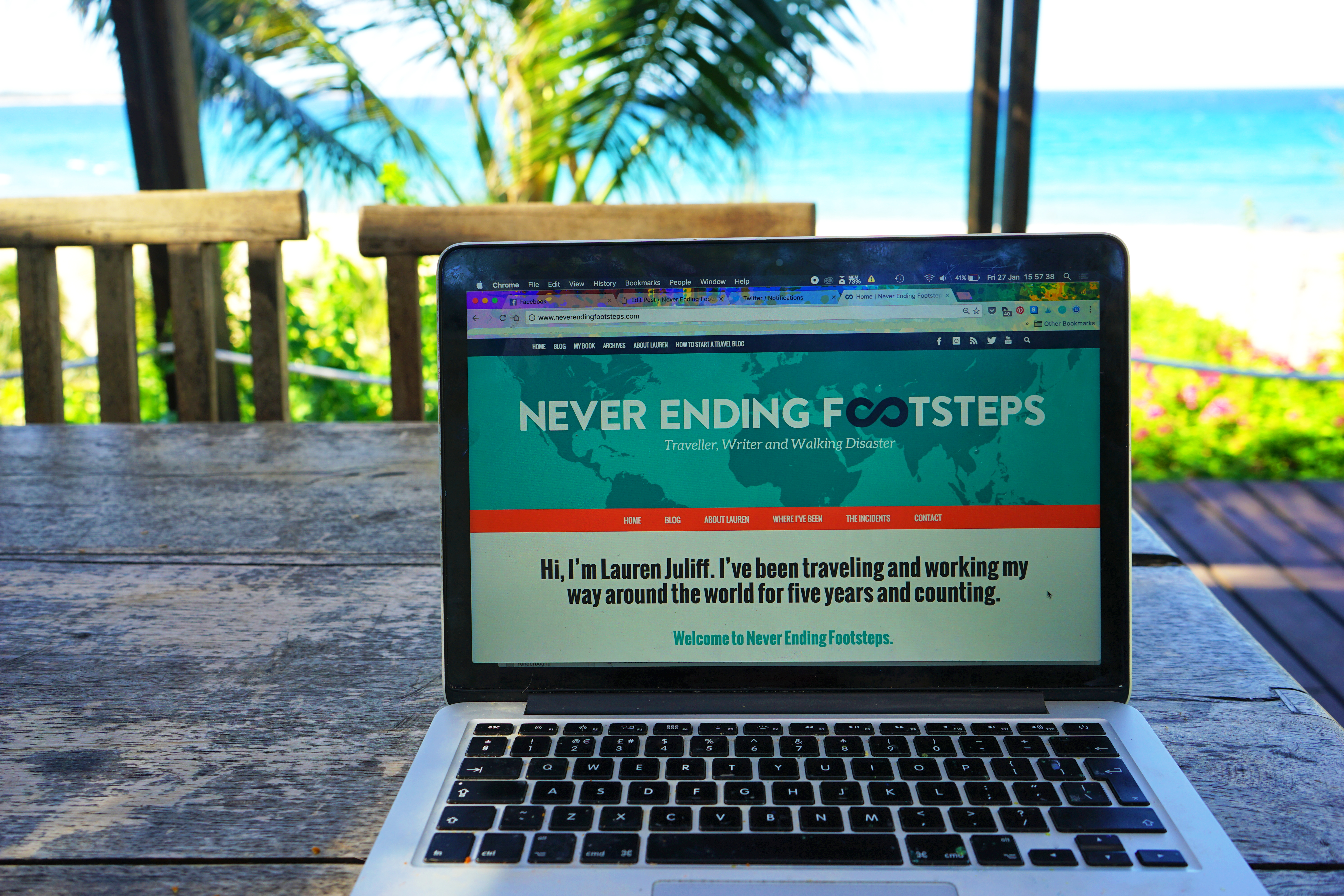
TAAG is a Good Way to Get There for Cheap
I scored some bargain flights from Angolan airline TAAG, which made it super-affordable to visit Mozambique from Europe. I highly recommend keeping an eye on their flight prices and making note of when they’ll be having any sales. At around $250 return from Lisbon, Mozambique was cheaper to fly to than many European destinations would have been!
And Angolan Airlines were actually great.
Read more about how I find cheap flights around the world .
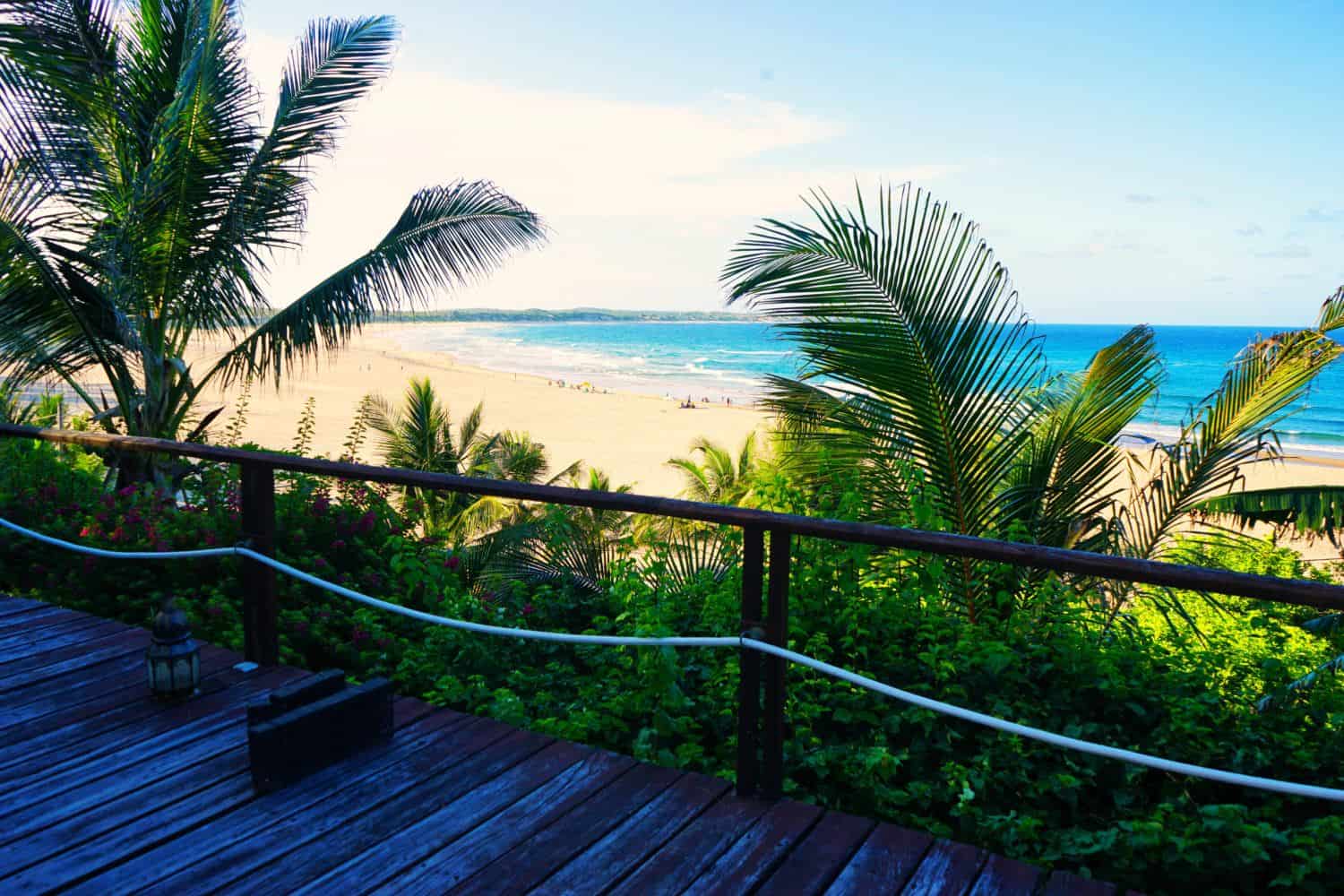
Low Season is Slow Season
I was concerned about visiting Mozambique in January, the wettest month of the year, but guess how much rain I experienced? One afternoon in Maputo that lasted for an hour, and an overnight thunderstorm in Tofo. That was it! Just as in Southeast Asia, I learned that the rainy season isn’t actually a terrible time to visit: the prices are cheaper, there are fewer tourists, and the rain isn’t frequent enough to spoil your vacation.
The rainy season definitely puts off many travellers from visiting Mozambique, though. In Maputo, I wandered around for six hours and didn’t see a single tourist. In Tofo, I would head down to the huge beach each afternoon and find myself sharing it with maybe three other people. When eating at restaurants in Vilanculos, my group of friends and I would often be the only people eating in the restaurant.
It sounds kind of boring, but it was actually fascinating. Imagine going to somewhere like Koh Phi Phi and having the entire place to yourself. In Mozambique, it’s possible!
If you’re aiming to visit Mozambique in the rainy season, be sure to keep an eye on the weather reports before you visit, and ensure you have comprehensive travel insurance that covers natural disasters and cancelled trips. I use and recommend SafetyWing for trips to Mozambique, as they cover you in these situations.
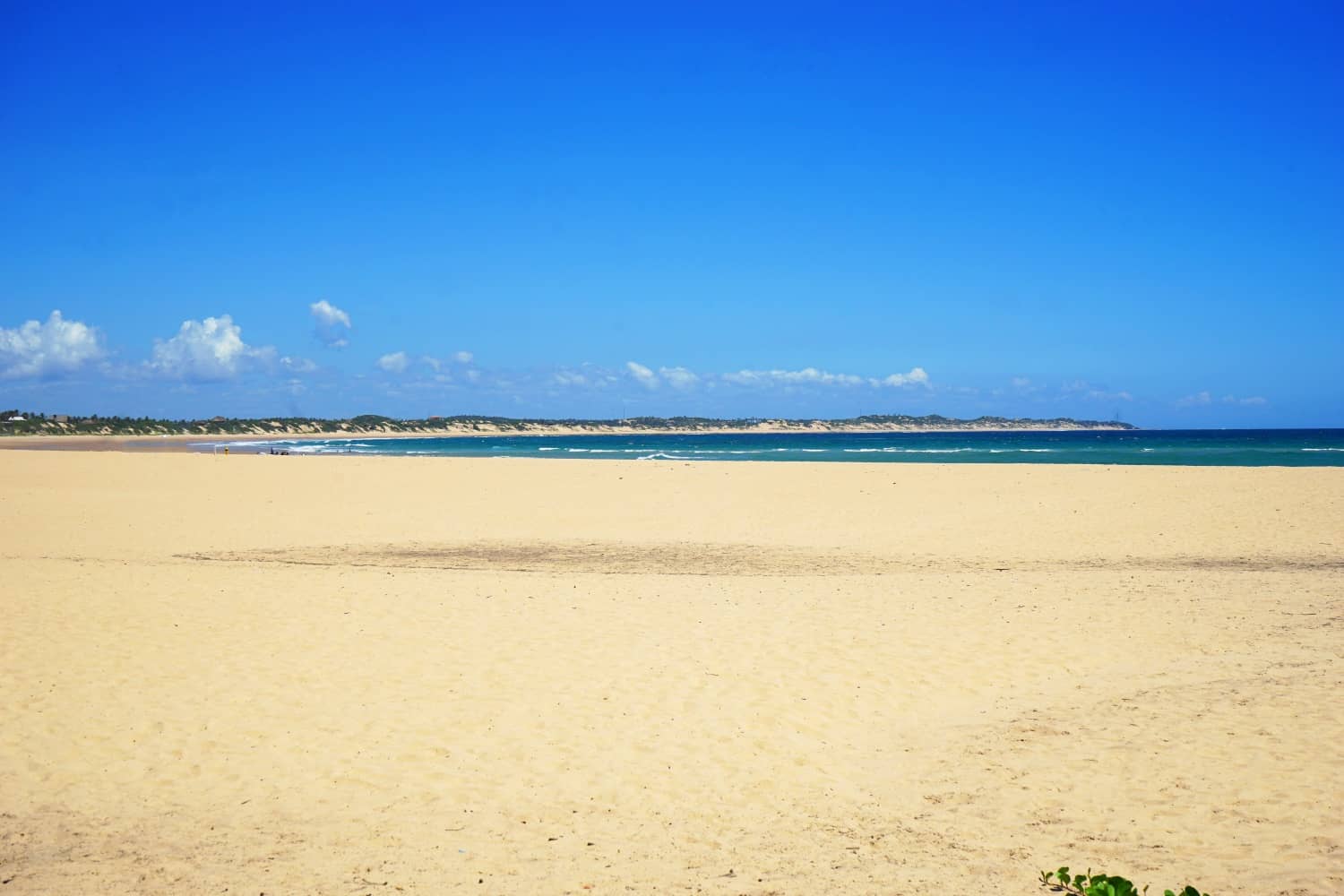
Take Your Anti-Malarials
I’d never taken anti-malarial tablets until I went to Mozambique, for the simple reason that none of the countries I was visiting were deemed high-risk, and dengue was more of a problem in them, for which there is no prophylaxis. Given how much time I’ve spent in mosquito danger zones, I’d have most likely ended up taking anti-malarials for years at a time, which wouldn’t have been great for my liver. So, whenever I was in the tropics, I would make sure to use bug spray, cover up, and attempt to avoid getting bitten as much as possible.
Well, Mozambique is high-high-high risk for malaria. Like, it’s one of the top five countries affected by malaria, with its prevalence ranging from 46% for children in rural areas to 17% in the cities. 26% of hospital deaths in Mozambique are due to malaria and every single local and expat I spoke to had contracted it a dozen times or more. And when I was researching early malaria symptoms, a significant amount of the people commenting in forums had contracted it in Mozambique.
The risk of malaria is real in Mozambique and you can die from it. Anyone who says anti-malarials are worse than malaria itself has never had cerebral malaria, which is a complication of a specific malaria parasite that is most prevalent in Mozambique. Cerebral malaria causes your brain to swell, which can lead to permanent brain damage, and also causes liver failure, kidney failure, rupturing of the spleen, fluid in the lungs, and death.
Take anti-malarials!
Malarone and doxycycline are both effective in Mozambique and I’ve never experienced major side effects with either.
It’s One of the Best Places to Dive on the Planet
Mozambique is all about the megafauna, with tons of whale sharks and manta rays visiting Tofo year round, and dugongs popping up every now and then near Vilanculos. I even got to swim with humpback whales and dolphins on an ocean safari in Tofo!
Let’s be honest: I’m not a diver, so I can’t speak from personal experience, but the vast majority of visitors to Tofo are there for the diving, and everyone I met couldn’t stop gushing about how mind-blowing it was.
For me, I settled with some snorkelling in both Tofo and Vilanculos, and the latter was some of the best of my life. I got to swim with an octopus, trumpetfish, parrotfish, stonefish, and a bunch of other colourful fish that I couldn’t identify but ogled at nonetheless.
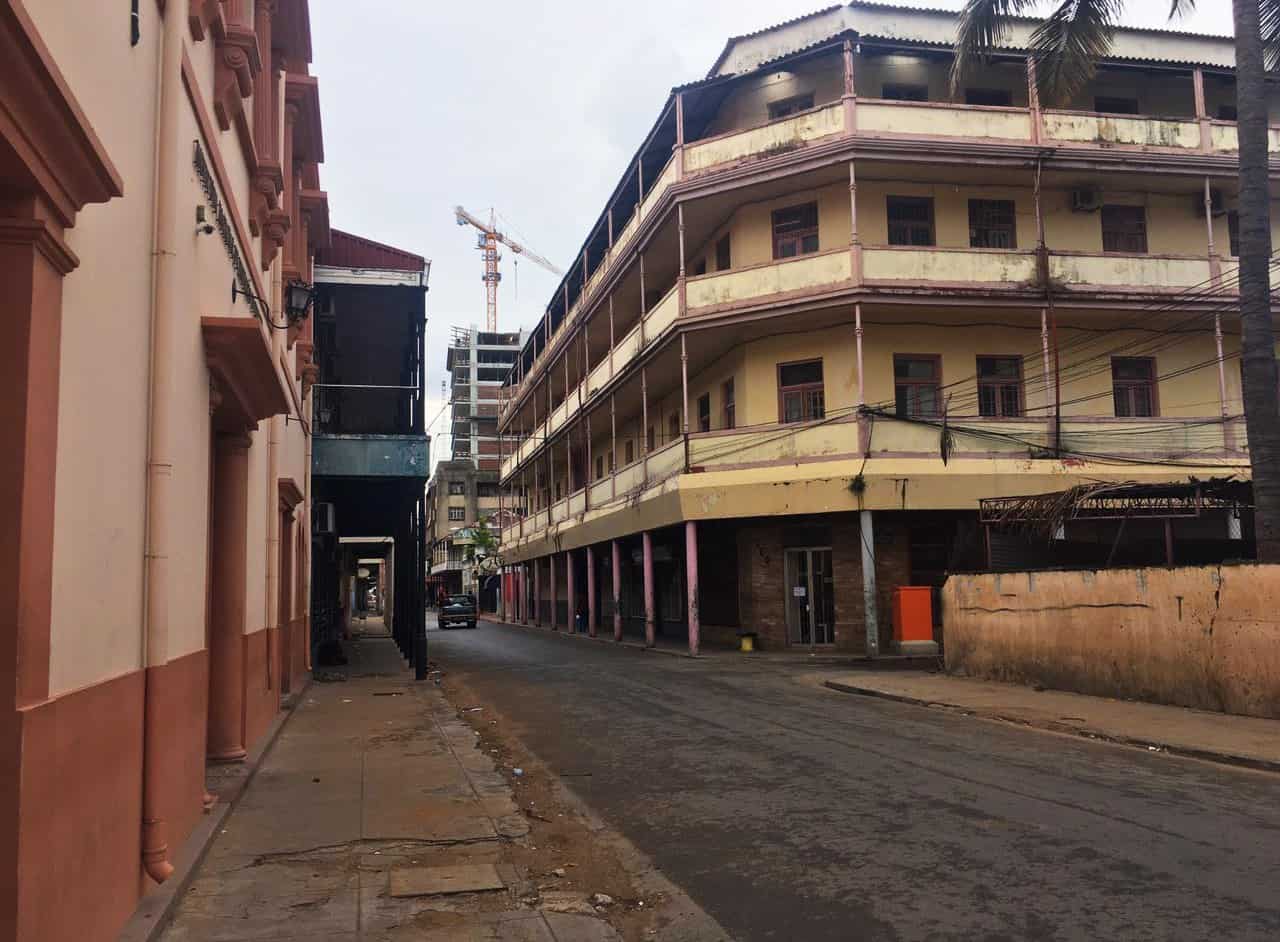
Maputo Isn’t Going to Be the Highlight of Your Trip
Oh man, I didn’t like Maputo.
I hate saying that I hated a place, but I really didn’t vibe with Maputo.
I gave myself three days in the capital city, something that drew nothing but winces from fellow travellers when I shared this fact. Quite frankly, it was two days too long, as the vast majority of tourist sites can be seen during a day of wandering.
I’d hoped to go to the Maputo Elephant Reserve, but no tour companies would take solo travellers unless I paid double, which would work out to be around $400. I wanted to take a walking tour of the city, but the tour guide didn’t reply to my email enquiry until after I’d left Maputo.
So, that was fine. I told myself I’d just wander around the city and try to find its heart in amongst the trash. Guys, I’ve spent a lot of time in developing countries and trash doesn’t even bother me — it’s something I rarely notice — but in Maputo it. was. everywhere. On every single street I walked down, even the most popular ones in the centre of the city, it was piled up everywhere.
The harassment was real and intimidating. Men would drive their cars alongside me, calling me baby, then pull over, get out of the car, and follow me down the road! So many men that I passed on the street would call me sister or mama or baby or click their tongue or hiss at me. My guidebook said that walking along the red light district during the day was safe and interesting, but it resulted in nothing but a bunch of prostitutes shouting at me.
The most touristy things to do in the city weren’t even that wonderful, which made the sightseeing boring. Basically, I ended up feeling like there was nothing of interest to see, the harassment was intimidating, and I spent most of the time hiding and recovering in my room.
If you go to Mozambique, aim to spend no more than a day in Maputo. The best parts of the country are elsewhere.
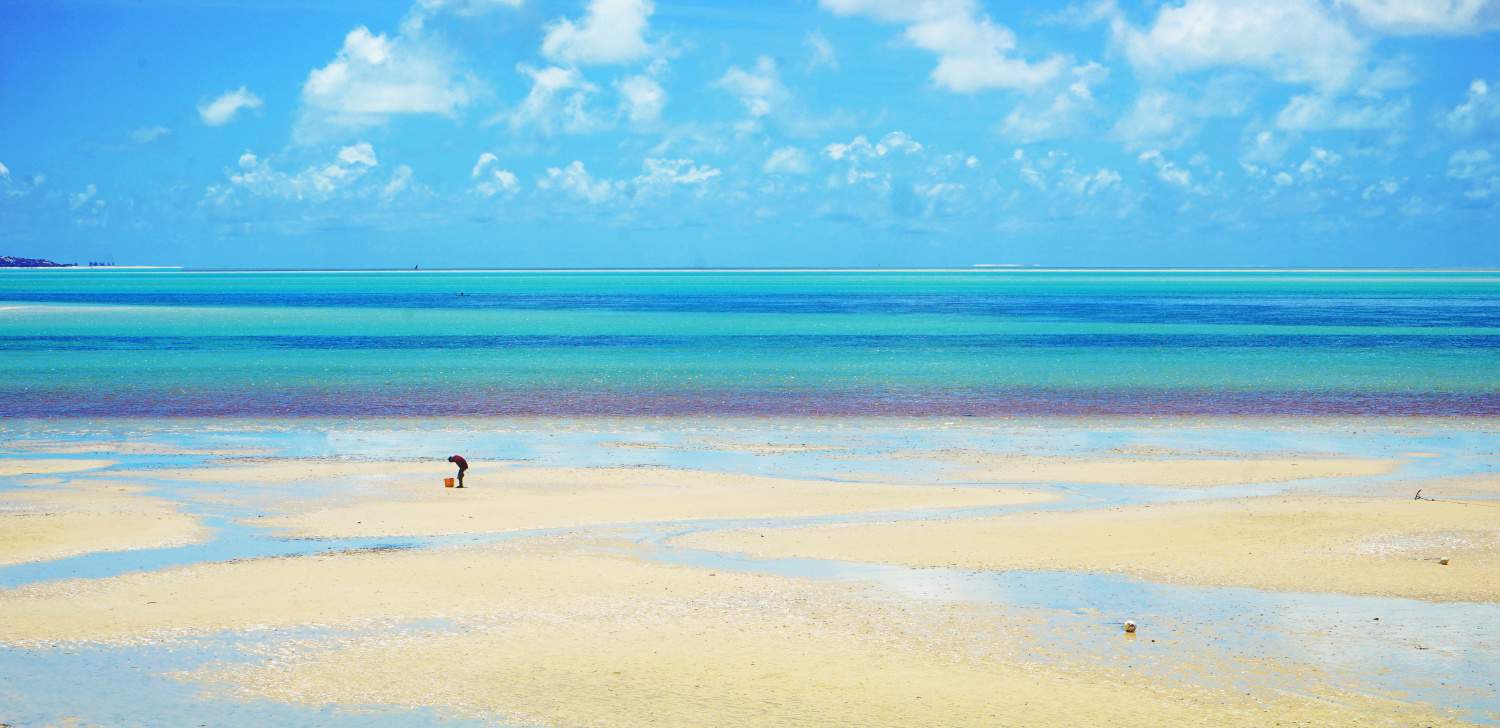
The Beaches are Spectacular
Mozambique has some of the best beaches in the world, and the absolute best thing about them is that on most of them, you’ll have them all to yourself!
My favourite beaches were in Vilanculos and the Bazaruto Archipelago. This part of Mozambique is all about the sandbanks, and at low tide, you can walk out across them for hours if you wanted. It’s like being on another planet.
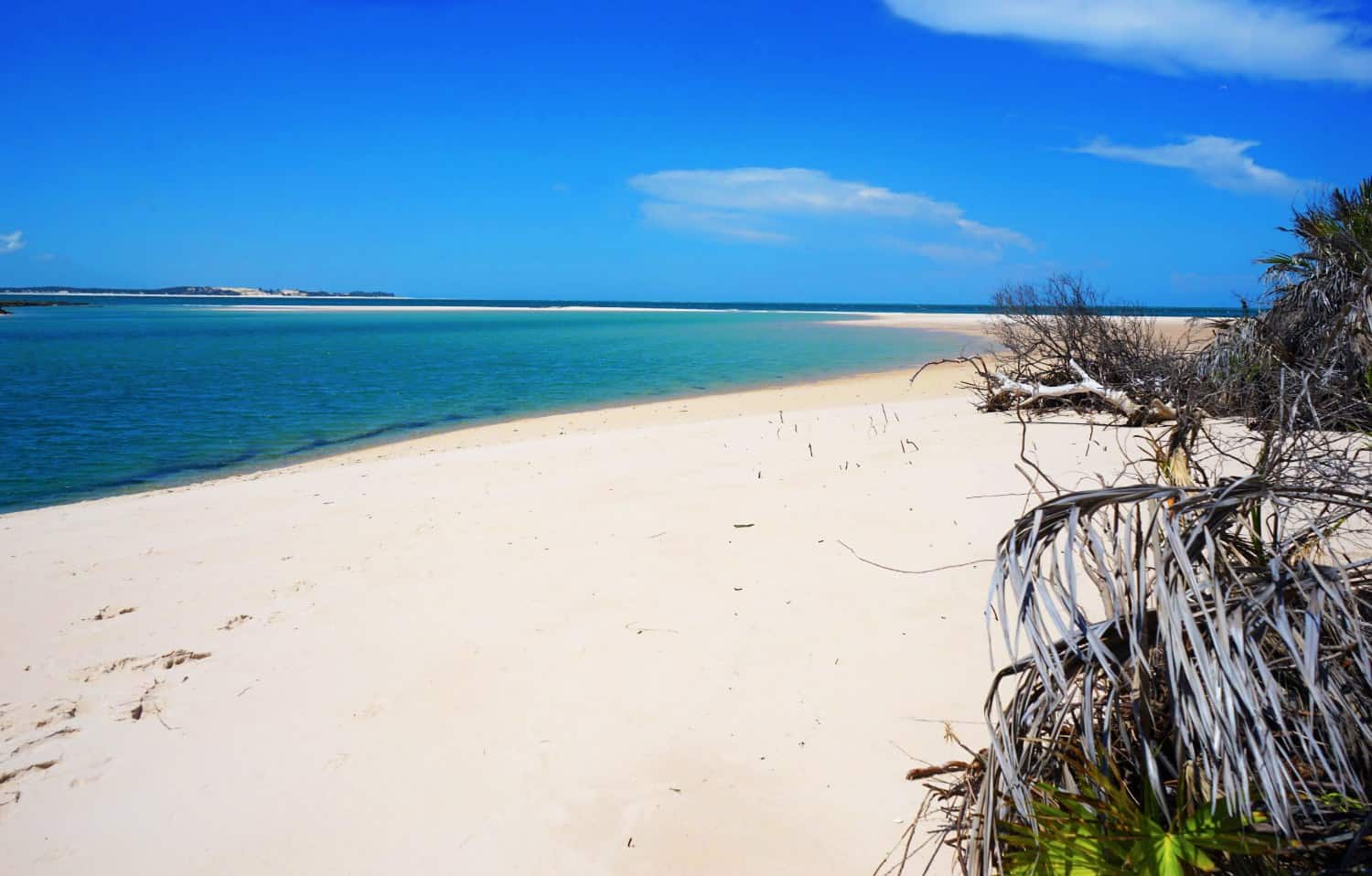
You Can Get By Without Speaking Portuguese
I was concerned about my lack of Portuguese language skills beyond the basic Portuguese I used while living in Lisbon for a year , but I needn’t have worried. I encountered zero language barriers within the country and 95% of the people I ran into spoke great English.
It’s supposedly harder to find English speakers in the lesser-visited north of the country, but if you stick to the south, you won’t need to worry about learning more than a few vital words.
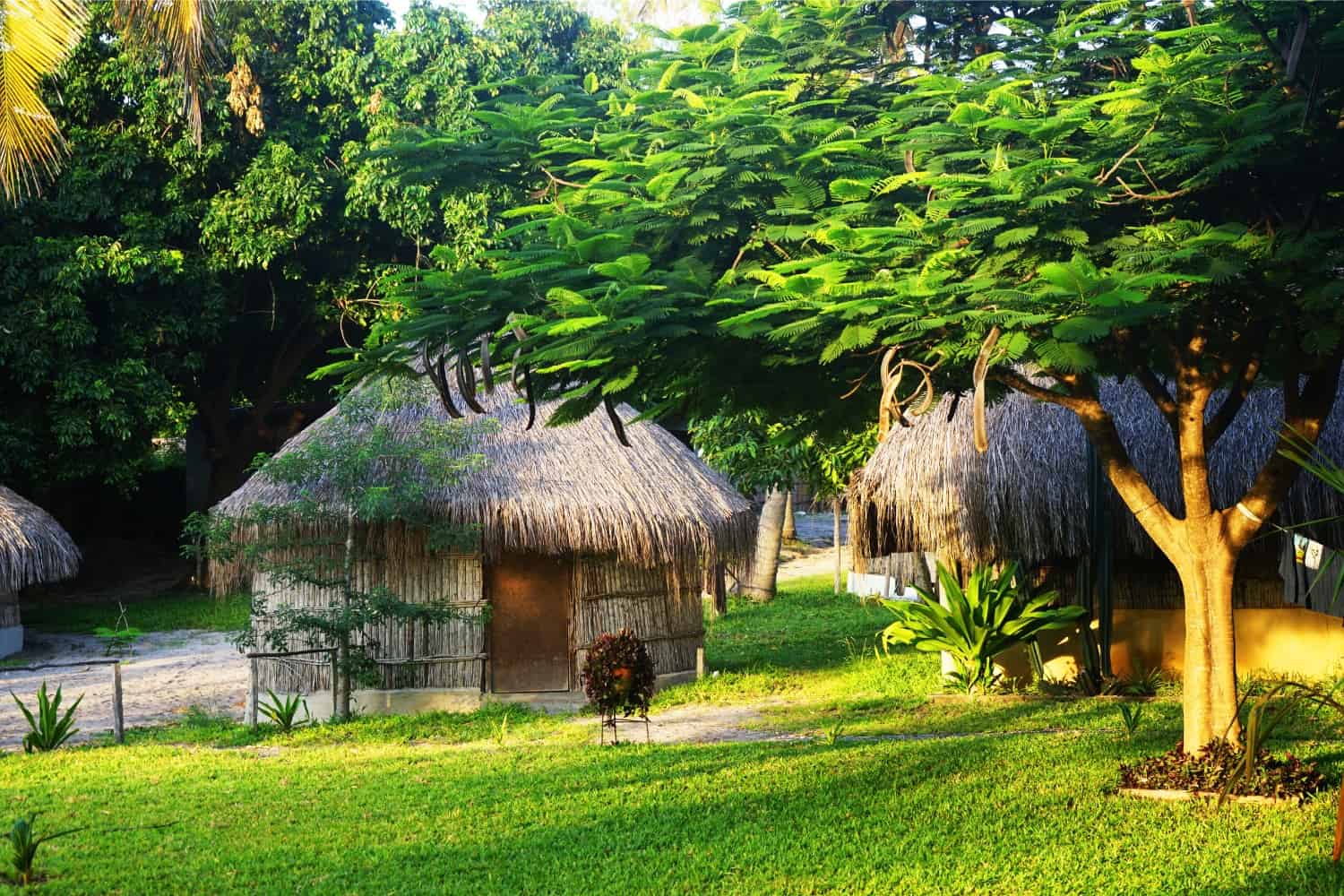
Chapas Will Make You Cry Sweat, But There are Alternatives
Imagine a humid minivan with terrible suspension, bumping its way along pot-holed roads on a thirty degree day. Now imagine filling it with 10 times more people than the recommended capacity, until you’re all packed in the back like sweaty sardines. Maybe throw a child on your lap and some smelly food in there, too. Now, get the driver to rip you off on the price and have the local men start calling you baby and asking if you can take them back home with you.
That’s a chapa and it’s the easiest way to get around the country. They are also awful, so don’t be surprised if after your first ride, you swear off them and opt for flights and private transfers to get around.
Which is exactly what I did.
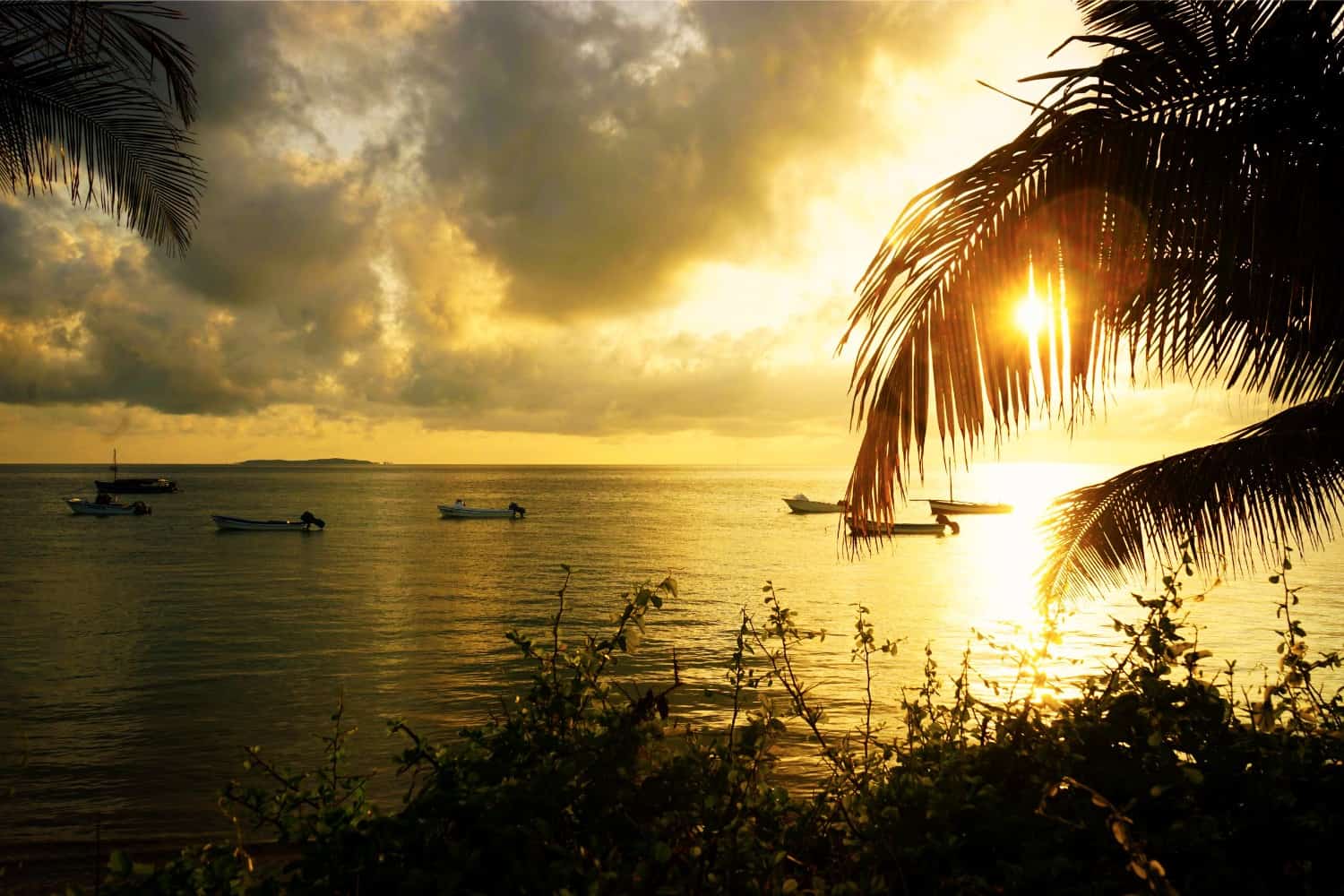
It’s Pretty Affordable
I wasn’t sure what to expect for affordability in Mozambique, as Africa isn’t the most inexpensive of continents, but I ended up pleasantly surprised.
Accommodation is where most of your money will go in Mozambique, unless you’re cool with dorm rooms. For a basic room in a guesthouse in Maputo, I paid $32 a night, for a fancy resort stay in Tofo that was one of the best places I’ve ever stayed in, I paid $63 a night, and for a private room in a backpacker hostel in Vilanculos, I paid $28 a night, although they had dorms there for as little as $9 a night.
Transportation varies depending on your level of comfort. If you wanted to travel between Tofo and Vilanculos, you could pay $3.50 to take several chapas and a ferry, $100 to hire a private driver to take you there, or $80 to fly there. Some people opt to hitchhike in Mozambique without a problem, but I didn’t try it while I was there.
And food is cheap, cheap, cheap! You can expect to pay around $2-3 a meal, or $10 if you’re in a fancy, sit-down restaurant for tourists. A beer is a couple of dollars.
Activities can be pretty pricey, depending on where you book them and how many people you’re traveling with. I had to turn down a lot of activities I was excited for because as a lone traveller, I was told I’d have to pay double to take any tours. It’s therefore best to stay in hostels and take their tours if you’re travelling alone. For a snorkelling ocean safari in Tofo, I paid $35, and for a day in the Bazaruto Archipelago, I paid $50.
I wrote an in-depth guide on how much it costs to travel Mozambique that’s worth checking out, as well as budget breakdowns for the hundred countries I’ve been fortunate to have visited so far.
It’s Safe for Solo Women Travellers
I really wasn’t sure what the demographics of travellers to Mozambique would be, but I was pleasantly surprised to find a mix of ages, travel styles, and races. And while I was one of the very few solo female travellers in the country, it was easy to make friends and I felt as safe as I do in Southeast Asia (very). I will say that I felt least safe in Maputo, even though nothing bad happened to me there, but the levels of harassment were intense.
What you can expect as a solo traveller in Mozambique, especially if you’re white like me, and especially especially if you’re blonde, is a lot of attention. For the most part, though, it’s totally harmless, and most dudes just want to chat and flirt with you.
You’ll Still Want to Get Good Travel Insurance
If you’ve read any other posts on Never Ending Footsteps, you’ll know that I’m a great believer in travelling with travel insurance. I’ve seen far too many Go Fund Me campaigns from destitute backpackers that are unexpectedly stranded in a foreign country after a scooter accident/being attacked/breaking a leg with no way of getting home or paying for their healthcare. These costs can quickly land you with a six-figure bill to pay at the end of it.
All I can offer is anecdotes, but even with my fantastic experiences, Mozambique is still more of a hardcore travel destination and there are horror stories online. In short, if you can’t afford travel insurance, you can’t afford to travel.
Travel insurance will cover you if your flight is cancelled and you need to book a new one, if your luggage gets lost and you need to replace your belongings, if you suddenly get struck down by appendicitis and have to be hospitalised, or discover a family member has died and you need to get home immediately. If you fall seriously ill, your insurance will cover the costs to fly you home to receive medical treatment.
I use SafetyWing as my travel insurance provider, and recommend them for trips to Mozambique. Firstly, they’re one of the few companies out there who will actually cover you if you contract COVID-19. On top of that, they provide worldwide coverage, don’t require you to have a return ticket, and even allow you to buy coverage after you’ve left home. If you’re on a long-term trip, you can pay monthly instead of up-front, and can cancel at any time. Finally, they’re more affordable than the competition, and have a clear, easy-to-understand pricing structure, which is always appreciated.
With SafetyWing, you’ll pay $1.50 a day for travel insurance.
Mozambique: One of My New Favourite Countries!
I love, love, loved my time in Mozambique and I’m already planning my return trip.
The beaches are wonderful, the locals are friendly, the food is delicious, and did I mention the beaches? It’s worth going to Mozambique just for them.
Have you been to Mozambique? If not, would you like to go one day?
Related Articles About Mozambique 💰 How Much Does it Cost to Travel in Mozambique? 🏖 Introducing Tofo: My African Beach Paradise 🏝 A Perfect Day in the Bazaruto Archipelago
Lauren Juliff
Lauren Juliff is a published author and travel expert who founded Never Ending Footsteps in 2011. She has spent over 12 years travelling the world, sharing in-depth advice from more than 100 countries across six continents. Lauren's travel advice has been featured in publications like the BBC, Wall Street Journal, USA Today, and Cosmopolitan, and her work is read by 200,000 readers each month. Her travel memoir can be found in bookstores across the planet.
Related Posts
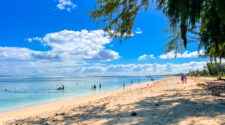
The Cost of Travel in Mauritius: My Detailed Budget Breakdown
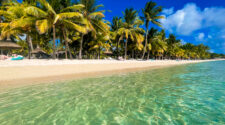
How to Spend One Week in Mauritius: An Itinerary for First-Time Visitors
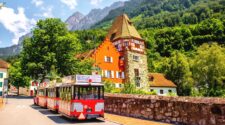
What’s it Like to Travel in Liechtenstein?
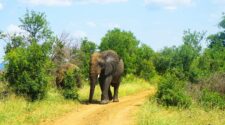
Why You Need to Take a Game Drive in Swaziland/eSwatini

Exploring Kolmanskop: Namibia’s Ghost Town in the Desert

In-Depth Namibia Travel Guide: What’s it Like to Travel in Namibia?
144 comments.
The pictures you posted from Mozambique are fantastic and they make me want to go there (except I’m still an inexperienced traveler, so I will wait awhile). Also, it’s pretty awesome that you love the country as a whole and yet are able to write frankly about the harassment in Maputo (I also saw your snaps about this subject).
“I find myself instead thinking of my alternative blog title as The Accidental Adventurer. Because that’s what I seem to have become.”
Okay, so I know you are constantly asked about your next book, but maybe there’s the title to your sequel!
Ha! Maybe! :-)
I absolutely LOVE your posts because they are so honest and give you a true snapshot into what your experience was.
Ah, thank you so much, Rachel! That means a lot :-)
Stunning photos. I had no idea Mozanbique was so ‘tropical’ :) x
Thank you :-) I was surprised by how many palm trees there were in Mozambique — they were almost everywhere!
I just love how detailed this post is! I feel like I’ve had some experience there (which I definitely don’t!). Those beaches look incredible!
Thanks so much, Brooklyn! It took a long, long time to write this one! :-)
I now have a more invested interest in southern Africa – Mozambique is on the list!
Yay! I’m happy to hear that :-)
What a beautiful place! I haven’t travelled to many places but I have big plans and Africa was never somewhere I’d considered until my cousin actually cut her Australian working holiday short to return to Kenya and South Africa after only a couple of months! I love that you’re exploring the lesser travelled places :) It’s totally helping to expand my options in the future!
I’m so happy to hear that! I’m a contrarian, so I always like to check out places other bloggers don’t often choose to visit, and Mozambique ended up being one of my best choices so far :-)
Great post! You’ve got me from knowing nothing about Mozambique to wanting to go, and that feeling achievable. What’s the food like??
So good! Lots of spicy seafood :-)
This post is so incredibly comprehensive! It gives such a good view of what travelling in Mozambique is like! I’ve been hearing people talk more and more about Mozambique even though Dutch travel advice remains negative for the most part. Thanks to your post I feel much more excited to visit it one day!
I’m excited to hear that! :-)
What? Mozambique is not great at all for tourists I have worked in Mozambique for some years and it NOT safe for tourists. Mozambique is in the middle of a civil war, the people have horrendous living conditions barely surviving on the poverty line, crime is rampant. You probably did not know that the people you saw working at those lodges are paid slave wages and that is when they can get a job. Tourism dropped 37% from last year and that is because it is not safe, far less in fact unthinkable for a women travelling alone, you were very lucky that nothing happened to you . Sure some of the beaches are very nice but that does not make a great holiday, and yes Maputo is a dump and there is nothing to see there other than misery, poverty, crime and trash. South Africa has far more to offer, has a great tourism infrastructure in place and if something does happen you have some recourse unlike mozambique.
There has been a ceasefire on the civil war/rebel fighting since December and any news articles I’ve read over the past week have said that an official peace deal is most likely days away. Additionally, the vast majority of the rebel activity has been in rural areas where tourists are unlikely to ever visit, and I don’t think any tourists were ever caught up or injured in the fighting at any point. Also, as far as I’m aware, nothing ever happened in the south, where I, and the majority of tourists, visit/ed. Tourism dropped because of the rebel fighting, and when/if a peace deal is reached, it will most likely increase again.
You say that people are barely surviving on the poverty line and that people working in lodges are paid slave wages, but then your solution to this is to not go at all. Taking away tourism income from the country only harms it and directly hurts the people who are struggling, and it’s not a reason not to visit a place.
And finally, the crime rates are far higher in South Africa than they are in Mozambique, so while you’ll have more recourse there, there’s also a much higher chance of something actually happening to you in the first place. But if you have actual statistics about crime affecting tourists in Mozambique, I’d be happy to hear them and adjust my opinion of the country. Even the British government says most visits to Mozambique are trouble-free in their travel advice. As it is, you saying that it’s not safe is just as anecdotal as the expat in Mozambique who emailed me this morning to say she enjoyed my article and loves living in the country.
Go Lauren! I love how you replied to that and totally agree about the poverty thing. If that was a reason to not go someplace, that would be a pretty long list of places not to go, I’d think. Tourism is so important for a lot of places that just not going would make things much worse.
This was an awesome post and will definitely be back to read more.
Hey I really enjoyed your article. I spent 2.5 months in mostly the North coast but stayed a couple nights in Maputo and a few other places as well. I actually had a great time in Maputo. It was on my way out of Mozambique. I realized I had two nights there just before leaving the north. One of my Mozambican friends saw me off at the airport and he connected me with a couple of his friends in Maputo. Thank God! They took me out all night to these lil bar-like stations that were bulletproof plexiglass and metallic anti theft bars. We had a blast and being that there were three of us no one messed with me. They told me if I was by myself that some people would just enjoy my company but others would want to F me up. They said Inwould most likely get jumped pretty bad. The only problem we had was at one point we were in a busy part of town, we parked the truck and walked into a place for some drinks. Possibly being that I was white maybe someone thought I was rich and left valuables in the truck. Idk but someone broke in to it and stole some of their things. Thankfully my stuff was at their house. They went and talked to the cops but parked a good distance and told me to stay down cuz they will harass me. I had already experienced the police harassment up north and again as I was leaving the airport in Maputo. They got me to the airport way late for my plane. I had all my money in a travel pouch stashed really well. Good thing too cuz they started giving me a hard time about a bag of passion fruit lollipops I discovered there, BOMB Dizzle! They tried to act like I was smuggling shit and wanted money from me. I told them why I was there and said I had already given all my money away to all my beautiful friends I met here. I ended up giving them a few Metz (Meticals their currency) that I had in coins which was equivalent to a lot less then a dollar. The last couple negative things I hope to ever say about Mozambique, due to the poverty the men are much shorter than I. I’m a 6’2 blonde whiteboy and I only felt unsafe one time. I was grocery shopping and when I walked outside there was a dude who was about my size and he was trying to size me up. The last thing I’m going to do is fight a local so I just smiled, waived and said things like, “oh wow you big bro. It’s ok everything’s good broddah.” I then lil by lil got away from that situation. He just wanted to show he was big too but not in the right way. I traveled around hitch hiking and even met some thuggish friends who took me around on the back of their mortorcycles, while we rapped all day, and met their families. I felt and was very safe my entire stay. I too love the freaking beaches! I was there every chance I could get away for a dip. All this being said, if I were you or anyone on this thread, I would not travel there alone again. I know of a girl who was there who was hit over the head with a hammer-like tool and raped. She was walking with 7 others too. Someone jumped out of the bushes. Where we stayed they recommend that you travel with no less then 8 people at night and 4 during the day. I had traveled outside with one or no others too and felt 100% safe. Let’s also remember that was just our experience and luckily we for the most part only ran into amazing people but we can’t take away from others who have been hurt, it’s not just online talk. I’m totally not trying to scare anyone off or argue with you Lauren, I just think you might want to mention that the threat of danger there is real but thankfully u only ran into some of the most beautiful people on the planet as did I. I love the shit out of Mozambique and made numerous friends. I can’t wait to go back someday too! Oh sorry there was one more thing, as far as the poverty and traveling to help the local economy, unfortunately that’s not how it works. Well, It is when you’re eating at a small chicken & chips place paying a couple dollars for food or buying a capalana (sheet like fabric women wrap themselves with or guys like me find a tailor to make a bunch of cool clothes) but as far as those big hotels or most of the bigger stores and restaurants, they’re all owned by the Chinese, South Africans, and Middle Eastern people. They pay off the government. The elected officials get into office, rob the countries money and leave for the next guy to repeat. All that to say, my 2.5mo there and 2wks in Krueger National Park, Joberg, and CapeTown were the most rewarding, fun times I have ever had and I’ve been all over the world. You’re right about South Africa fasho. A couple times I pulled down the wrong street and it was almost as bad as San Bernardino, Ca. Haha No there were a cpl times I had drive off quick but there are so many cool things to do down there as far as animal reserves go and cool places to go. Food is really good too! Thanks again for the good read… Sistah!
Wait sorry, how are you going to tell another person if they had a good holiday or not?
During the past 25 years I have spent an accumulated 4 years living and travelling throughout Mozambique, without serious incident of a criminal or corrupt nature.
Yes, I did have my camera stolen at the Feira Popular in Maputo in 1993, but this was when distracted by too many cheap Impala beers and the attention of ladies who probably have never been chased – acknowledgements to Rodriguez.
My first trip was 6 months long on my bicycle, during the civil war, from Beira to Tanzania, and beyond. My latest trip was in October 2018 with two fabulous families from America. We started in Johannesburg and drove Maputo – Xai-Xai – Inhambane – Morrungulo – Bilene – Massingir – Kruger National Park.
As usual no problems, just (genuinely) pristine beaches, wonderful people and food and of course the special Wilderness and vistas of Kruger. My clients were charmed by Mozambique and awestruck by Kruger.
South Africa does have a very bad crime record. Tourists are sometimes targeted as a quick Google of the terms “OR Tambo Airport and tourists” will reveal.
Looking forward to my next adventure in gentle, beautiful and uncrowded Mozambique.
Thanks so much for this Lauren! We are thinking about Mozam and Tanzania for our next trip and this definitely fills in a lot of the gaps regarding tourist info for the country. What is the wifi like there?
The wifi was pretty good, actually. I found that the wifi worked really well in guesthouses *when* you were sat in the reception area — it was fast and you could Skype on it. The signal wasn’t often strong enough to reach your room, though, so I’d have to work in the common areas/restaurants. When I was researching, I found that the vast majority of accommodation options had wifi, and from the reviews, it seemed like it was usually usable.
Everything you write about Mozambique was true. From the trash in Maputo to the wonders on the cost line. And I do share the hate from Maputo.
Ah, I’m glad to hear that! I always find it a bit nerve-wracking when I post these summaries in case a bunch of people appear to tell me my entire perception was incorrect.
I’ve been so tempted by the idea of Mozambique for so long esp the coast and beaches so thank you for this honest and balanced intro!
No problem! It’s such a beautiful country and well worth a visit :-)
Wow! Great blog post. Looks like that’s another place added to the bucket list! Thanks, Lauren!
I’m looking for some advice on whether I would be safe in Mozambique as a young white man, as I would clearly look like a foreigner and am worried whether I would be targetted because of it. I would be volunteering in a local school near Maputo for around 6-8 weeks, staying with Mozambicans during that time. I’ve heard/seen conflicting evidence that Mozambique is safe to visit/is dangerous with high crime levels (involving violent robbery etc) from forums and the western embassies travel advice. For instance, the chances of being targetted as a victim of crime are about the same as a major US city, although most visits are trouble-free. Is it worth the risk? It truly looks like an incredible place.
In my opinion, if you’ll be staying with Mozambicans you’ll most likely be fine and I would go for it. The people you’ll be staying with will be about to tell you what to look out for and how to stay safe, so you’ll be in a much better position than the majority of travellers to Mozambique.
Wow. You are brave to do this, Lauren! I appreciate your efforts in writing the truth about Mozambique.
Thank you! :-)
This is a great post, thank you. I think you’re very good at showing the layers and different perceptions, here mainly on how safe it is to visit. Keep doing what you’re doing. :)
Thanks so much! I’ll do my best :-)
Wow . Incredible article . Mozambique is truly beautiful. The coconut trees , beaches and banana leaves remind me of Kerala, my home state. The sea color is better but. The small huts are fascinating. Added to my list of travel
And Kerala is high on my list of destinations to visit! I hope to get there later this year :-)
Your writing is the best!
Thank you so much!
All big cities are kind of dump. Specially in Africa. You can see the same situation in most of the big cities in the central and south Africa region. South Africa, Mozambique and Tanzania are the best examples of that.
Mozambique has some problems into bringing tourists in, although it’s a nice place to visit. But I wouldn’t visit it alone, as you did. I went there with a group of friends.
Although I have to say, I haven’t felt less secure than on the outskirts of Athens or Istanbul. So maybe it wasn’t that bad.
I know that Dave is scathing about pretty much all of the capital cities he’s visited in Eastern Africa, so I didn’t have high hopes for my time there. And yeah, there are definitely much nicer places in the country to see!
I would love to go to Mozambique one day – I’m a scuba diver and have indeed heard it’s amazing there! I’m actually headed to Eastern Africa for a few weeks this summer, and initially thought I could squeeze in some beach time in Mozambique as well, but this post makes me realise I’ll need more time. Will definitely be referencing this in the future. :)
I think you’d love Mozambique, Brenna! But yeah, it’s a huge country and getting around takes sooooo looonnnngggggg.
Great post Lauren! :-) Me and my (now) husband were backpacking Mozambique 6 years ago and the nature didn’t change at all! I bet it developed a bit when it comes to tourism but I don’t think that much, which I think is good to sustain such pristine and ‘naturally beautiful’ places. I remember Maputo not as a super ugly place however can’t diasagree it’s not a place you want to stay for more than 1-2 days. What I do remember what impressed me, was the old scratched portuguese architecture the city still had. We had to prolong our visas (anyway something was with it) and went to some embassy or some diplomatic point – I will never forget how beautiful and nostalgic that building looked like! It was like traveling in time to the colonial era (I guess)!
Mozambique is also opne of my favorite countries although that’s where we were robbed twice (Xai Xai and VIlanculos – in the Baobab Backpacker where you were, the story is really like from the movie but the management changed and everything so no need to write about it).
And for those who really want to backpack that country I do recommend arranging a dhow to Linga Linga island from Inhambane Bay – that was the most adventurous thing I have ever done in my life and the place is nature at it’s finest.
Looking forward to read more about your time in Africa! Safe travels, Alex
I have never been to Africa but I am making it my mission to get there this year! Mozambique surprises me, I didn’t expect it to be as how you described. The sandbanks of the Bazaruto Archipelago looks stunning. I hadn’t realised it was so popular to dive! would love to dive and see the whale sharks!
Parents, DO NOT let your children travel to Africa! – I love this !!!!! It shows how closed minded we can all be when we don’t know much about a place or a culture.
Thanks for the heads up about the Visa, will keep this in mind when we do visit and will keep an eye out for your post on how to get the visa :) Baobab Backpackers looks like a cute place to stay too! thanks for sharing:)
I think I was the only tourist in Mozambique who wasn’t diving while I was there, haha, so it’s definitely a popular place for checking out sealife.
And yes, exactly. And how so many people treat “Africa” as if it’s one giant country, full of danger and poverty and war, without realising it’s a diverse continent with, yes, some problems, but that doesn’t mean you should treat every single country as if it’s unsafe and terrifying. I’ve been to both Morocco and Mozambique and they couldn’t have been more different! Even Mozambique, Swaziland, and South Africa felt totally different.
I’d love to visit Africa, I think it’s such a fascinating continent with so much culture. But I’m not too well travelled yet, at least not solo so I’m not brave enough to venture there just yet. But when I do I’d love to visit Zimbabwe and South Africa. Thanks for the article Lauren
It can definitely be intimidating when you visit for the first time, but also, totally worth it! I’m glad I waited until I had a few years’ worth of travel experience before checking out, as I know I wouldn’t have coped as well if it had been my first solo trip.
Fascinating read, Lauren. Hoping to spend some time in South Africa, Namibia and Botswana in the next two years and I’m now thinking I should add Mozambique to that little list.
Yes! Do it! :-)
Love this post! Thank you for the insight!
Also – just finished reading your book. Beautifully written!
Thank you so much, RJ! That means the world to me :-)
Hey Lauren, stunning pictures. I must say along with a good blogger, you are an amazing photographer too. Thanks for sharing such wonderful narration of Mozambique. Keep Sharing! Keep Travelling. Good Luck.
Ah, thank you so much! That means a lot :-)
I’ve never heard of Mozambique country until I can across with your blog and I’m happy I get to know it. For sure, people from all around the world will fall in love with warm tropical weather and pristine beaches which stretch as far as the eye can see.
Happy I could introduce it to you!
Lovely read. Mozambique looks beautiful.Nice captures. :-)
Thank you :-)
It’s very interesting to know all about Mozambique. Great article.
Thanks, Irfan!
One of my best friends married a Mozambican and now lives there. This was so interesting for me to read from a traveler’s perspective, not just one who lives there. Thanks so much. I now feel more confident about me as a high-anxiety mom, taking my children there.
I’m so happy to hear that, Leah! :-)
I’d rather go to Zanzibar.
Great to see such a useful write-up. I also really enjoyed Mozambique. It’s not without it’s challenges but the people were great and the seafood was AMAZING. I’d love to go back and visit some of the islands one day.
The spiders though. I saw some really big spiders.
Oh man, I only heard about the spiders. Enormous ones that will run straight for you. I didn’t see any on my trip and I’m SO GRATEFUL FOR THAT, haha. Glad you enjoyed the post and totally agree about the seafood!
What a great post! I had a similar experience with Venezuela where I felt unsafe at times and nervous, but the people were so warm and the country so beautiful that it is a shame to be tarnished with just one brush!
It’s great to hear something positive about Venezuela, Reena!
This is the best post I’ve read so far. My boyfriend and I are on the more adventurous side as far as travelling goes, but I do believe our trip to southern Africa is going to really push us to the edge. And I am still not sure we should make this trek. Maybe you have some quick advice? We plan to visit South Africa, Botswana, Zimbabwe and then possibly Mozambique, and then back to South Africa. We would only have AT MOST 5 days for Mozambique (travel included), and I understand it is REALLY tough to travel within Mo. We don’t mind “traveling quick” and we often only spend 2-3 days in each place, but if it’s too long or expensive to get to the southern part of Mo from Zim, then maybe this wouldn’t be worth it? I am excited to see the beaches and spend some time in the water (as the rest of our African adventure will be in the cities, or hiking through bush, jungle, etc.), so I guess I am asking if you would say it’s worth the trip? And if so, can you recommend a plan of attack from Zim? None of this is set in stone, I am only a week into planning this, so any advice at all would be amazing!
PS: my favorite beaches BY FAR were in Thailand! Is this better?
Yesterday I was talking about Mozambique , and the person I was speaking to , just make me feel like visiting the country . And now I found your post and I really like the way you talk about the country . I travelled a lot , but this time I will travel with a baby so I was wondering if it is a good place to go with a 4 months baby . I know people would say I’m crazy but with some care and good health insurance I’m not afraid to go there . But I would like some tips .
Plenty of people travel there with children, and travelling with kids is a great way to connect with the locals, too — everyone loves babies, all over the world! But I don’t have specific tips for travelling with a baby, as it’s not something I’ve ever had the opportunity to do. The only thing I would say is that if you’ll be travelling on a budget, the infrastructure can be quite poor, so you’d struggle with things like hot water showers and air conditioning in rooms, which could be stressful with a kid. And you’d have to take precautions with malaria, and I’m not sure how you’d do that with a baby. But if you google “Mozambique with children” you’ll find a lot of forum threads from people wanting to make the trip, so you’ll be able to pick up some tips from them.
Heading to Vilanculos in a couple of weeks and wanted to say thanks for this post. Definitely the most helpful guide I’ve found on the internet so far! Looking forward to getting out on the water now!
Ah, thank you so much, Agness! That means a lot :-)
This is so helpful! I’m going to be going to going to Tofo and Vilanculos next month. Can’t wait!
You’ll have an amazing time! :-)
Uugghh! This is so helpful, I’m traveling to Mozambique around January next year with my friend and am so glad I bumped into your post alot more things are clearer now. Thanks for writing.
Glad you found it helpful, Jojo! Have fun in Mozambique :-)
When are you going back there Lauren? And how would we get from Joberg to Tofo do you know?
Not sure when I’m returning, and your best bet is to fly to Maputo and onwards to Inhambane, or you can bus it to Maputo and bus it to Inhambane if you’re on a budget.
Great Blog! Thank you for sharing.
I’m in the midst of planning my solo trip to Mozambique. I’ve got 3 weeks, maybe 4. I’m aiming to do Maputo>Inhambane>Tofu Beach>Bazruto Archipelago>Mozambique Island. Do you think this is too much to fit into that time frame? I also want to take my time to learn how to dive (I’ve done it before but not gotten a certificate). I’m also cautions of going in November/December where it is the start of the rainy season (don’t want to wait until next year).
Many thanks,
this is awesome!! that looks so relaxing.. this will be definitely in my bucket list!! and i think i know where to go on my vacation!! lol thanks for sharing..
I highly recommend it :-)
Like in every similar country like this, Mozambique is beautiful for travelers and dirty for citizens. Great article and nice photos!
It was pretty dirty for me too… ;-) But I agree — I always try to keep my privilege in mind when visiting countries where the citizens are often struggling.
Awesome read , thank you x I have lived in Tofo with my husband and 3 sons for 13 years , having owned a Dive Centre , Liquid Dive, i am very knowledgable of the tourism stats and wages as well as the safety of living here and now with a private primary school in the area namely, Kingfisher Lake to offer the community i cannot stress how perfect Tofo is for a family or a lone traveller . In South Africa you live in fear constantly . I know of three families and friends who are relocating here from South Africa to Tofo within the next year because in my opinion it is the safest place in southern Africa . They have seen our lives here and how we live and want the same , the freedom , the beautiful beaches , the coconut trees etc . No threat of rape , murder or any other violent crime and the weather is just superb all year round with Humpbacks calving in our bay for 5 months of the year, Mantas , Whalesharks and great surfing and the warm water, we are living the dream…
Thank you so much for sharing, Cindy! I’m thrilled to hear how much you’re enjoying living in Tofo. I can’t wait to return… hopefully in 2018!
I lived in Maputo for 10 years and never had a serious incident as a blonde female, but boy was all the male attention annoying and unwanted! Only to say, not unsafe but definitely a hassle and I was over 45 at the time. I can only imagine if I was a cute YOUNG woman,
I’m glad you loved southern moz, but please come back! You missed the best part of the country! We live and work on Mozambique Island. Nacala and the region are not to be missed. We love our island and it is amazingly beautiful. It was once pretty trashy with dirty beaches but the municipal leaders and others like us have made great strides in cleaning things up, 2018 will be the 200th anniversary of the city of Ilha de Mozambique, so a great time to visit with Lots of things planned and great fanfare. And FYI. If you didn’t like Maputo, don’t spend more than a day in Nampula.
Thank you so much for sharing, Lynne! I desperately want to return to Mozambique, so I’m sure I’ll get there very soon. There’s so much more of the country I need to see :-)
Renamo been fighting Frelimo for many years civil war going on there enjoy
Not anywhere where tourists would go, though.
So in personal experience, once you leave the southern part of Mozambique there is little to no English. So in our future travels, should you choose to travel into the north, I HIGHLY recommend bringing someone who speaks Portuguese or learning some yourself. Please just be careful as you go north since it is not as designed for tourists and could be a much different feel to the trip. Having lived in the North and the south in country for over a year, I have experienced the great difference in needs of Portuguese levels. Also, the roads between the South and the North are extremely rough so flying, while a hassle, would quite possibly be a better option. I’m no tour guide or anything, just a missionary living among the locals who would LOVE to see tourism help these natives provide for their needs more consistently. As for politics, neutrality, friendliness and respect go a LONG way in this country, as I would assume in many other countries too. I hope you return soon. Mozambique is an incredible country indeed!
I’m actually taking Portuguese lessons at the moment! :-) Thanks so much for the kickass comment, Monica, and super-helpful advice — I’d love to return to Mozambique very soon.
Hi everyone! I’m from Moçambique (Mozambique), I can ensure that is a lovely e beautiful country. For people who are looking for some nature landscapes more like artigo beaches, I would recommend to go to the province of inhambane, there u will find praia do tofo, amazing view! Arquipélago de bazaruto, it’s very beautiful but a little high cost( for me the best of Mozambique) Praia da barra. For those who are looking for a more privacy I recommend ilha magaruque! At maputo province you can go to ponta de ouro, there you’ll find nic beaches! And if coming for South Africa (RSA) it relatively close from Durban! About the safety issues, it there some criminality like everywhere(not like the favelas at Brazil or a cartel city in Mexico) , but it nothing that Serious to make not go there! At the city of maputo people will sometimes stare at you just whit curiosity not intending to hurm you! If you come driving you may wanna make sure to have your drive license, passport, and everything also, course I have to admit! The police are a little annoying, and some times like bribes( give them any money) ! If you cannot speak Portuguese try to get help from another drivers at the roads but stay in the car! For know it’s all, and if you decide to come the Mozambique, you welcome! have fun, and enjoy nature! Plz do not disturb nature, you can enjoy nature without harming it!
Thank you so much for the amazing tips, Ivan! I really appreciate it.
Muito lindo …meu pai falava muito de Mozambique e tambem de Guinea…?
Would love to visit Guinea one day :-)
Pity you didn’t get to see the good side of Maputo, it’s an amazing city, did you go to the art studios? Mafalala? Even amongst the trash and mud there is so much soul.
I didn’t, but they’re definitely on my list for next time.
Wow, what an adventure. Tried to read and digest it all in one go, gave up, but came back to tackle it in smaller chunks at a time.
With 25 years of visiting and guiding and working in Mozambique (based in Johannesburg) etched into my Noddy Badge, I thought I knew it all, but have been enlightened and enriched by your narrative – thanks
Regarding Maputo, ah a difficult one… But wait! Perhaps a comparison with Cape Town may be revealing? I have also lived and studied and holidayed in Cape Town many times. It is simply stupidly stunning, mostly clean, has some crime (bad in parts), but quite a “First-world” feeling about the place. Right now? Well you could play “spot the locals” as it is very tourist trodden with prices to match.
Now to Maputo… Doesn’t have a mountain of the table, or any other, variety – also no beaches worth a tan and a swim. Very few tourists, though and so you may feel isolated and intimidated. Good, this is a sign that your “character”, resilience, receptivity and wisdom are expanding. Keep to that idiomatic “comfort zone” to much and you may as well have walked from home to a nearby bar.
My latest tour around Maputo was by bicycle and this had the effect of making me invisible to criminals, touts and corrupt cops. The real people, by contrast, embraced like a long lost relative and I made fifty half-hour friendships every day.
The street food and music are eclectic and very good and the history a day architecture are astounding.
Don’t dismiss and shun Maputo. Look up “Maputo a pé” on Facebook a day Google and tell Jane Flood that I sent you.
Mike http://www.mozguide.com
Such a shame that you hated Maputo. The city has a lot to offer (and good things!). Do not hesitate to get in touch with me when you come back and I’ll give you a tour of the cool places :) Great article!
Thanks for the offer! I appreciate that :-)
I would love to go to Bilene for my birthday but my anxiety is sky rocketing and funny enough I’m From South Africa so one would think I’d be brave enough, I’m not too sure of how one gets from Maputo to Bilene and I’d hate to get lost?
Thanks for the candid account of both Maputo and the coast. Its been very helpful in my planning and am now confident that I can travel there on my own! all the best from Stina
Thank you! Hope you have a wonderful trip :-)
it was an interesting read. My name is leul mamo and i am an Ethiopian from east Africa neighbor to Kenya, Sudan, Eritrea, Djibouti and Somalia. and i plan to stay in maputo, mozambique for a little more than a month on a volunteering assignment by AIESEC there. It will be my first time to visit, do you think maputo is safe to go there ? since it will be my first time to travel outside Ethiopia….. thank you, woulds like to hear from you.
Hi Lauren, I’m amazed by the blog, I am Mozambican, was born in Inhambane. I used to climb those palm trees to get coconuts for preparing meals, the beaches were my font of food, used to fishing with lines and nets, sailed on those sailboats for long. Due to my profession had to leave that beautiful coastline to the northwest, exactly in Tete. This place is hot and nothing compared to Inhambane, Gaza, Sofala, Zambezia, Nampula and Cabo Delgado.
I’m happy to read your review of the south. I visited the north a few years ago, since my cousin has a large fisheries on Cahora Bassa Lake. I’m planning my next trip this December and have been trying to figure out the best way to travel.
I could fly to Harare and travel with them via Zimbabwe, but that’s what I did last time. I’m thinking about flying into jo-berg and renting a car or flying to Mozambique. I’m looking for more adventure a deeper locals experience than traveling with my well off relatives.
Do you have any thoughts? Might be good to fly into the north and then travel around by bus?
Hi Lauren — thank you for the write up! Would love it if you could share your itinerary. Happy travels! :)
Check out my post about how much it costs to travel in Mozambique — it’s covered there.
Hi how are you? You describe very good the country, you give also a lot of informations and tips. I live in Mozambique Island next time you should to come here, you ll love it maybe more then the south. Best wishes Kyra
Fantastic blog post! Thanks for sharing :)
One of the things I have always wanted to experience was diving with whale sharks and Tofo beach looks like the perfect location for that! However, the only thing holding me back is the malaria issue in Mozambique. I have read many blog posts and articles about this, but opinions vary a lot and I am finding it very had to make up my mind :/ I’m not sure if it is worth taking the risk…
I am a Nigerian and i have always loved the idea of travelling to a Portuguese speaking countries from my bucket lists that included Angola, Mozambique, Cabo Verde Island, Sao Tome & Principe and lastly, Equatorial Guinea but i found your post on Mozambique to be interesting and i would love to visit the country sooner. Thanks Lauren for the information
No problem! Hope you make it to Mozambique :-) A lot of the countries you listed are on my list of places to visit, too!
Great post! Thank you for sharing this. Definitely, I’m looking for a destination for my long trip next year. :) Mozambique is now written on my travel list.
Thank you so much. This article was really helpful. I wanted to do my Divemaster in Tofo and was initially so scared. The usual cliches you know :-) But your article really helped to prepare and see for myself that I should just go for it! I ended up staying half a year in Tof and worked as a Divemaster and really loved the time. Thank you Lauren!
That’s amazing! You’ve made my day :-) I’m so happy you ended up loving Tofo.
Wow! This is so informative, I will travel to Mozambique with my friends around April next year, and i was share your post with them. We can’t wait for it now.
Thank for your wonderful blog Lauren! We have been deep into planning a trip this Autumn to Tofo for the whale sharks and mantas and the Bazaruto islands for kitesurfing.
However, the terrible cyclone that has just blown through this week higher up the coast has wreaked such devastation that I am in two minds whether it might be insensitive to visit just for the fun of it on the one hand, although obviously tourist dollars would probably still be welcome….
Do you or any other readers have any opinions on this please? Thanks.
Love the post Lauren! You seemed to have really enjoyed your time visiting Mozambique. I actually didn’t know what to expect from this place as well as a destination but your post has shed some light on that. In fact, it’s making me think of traveling here the next time I get a vacation leave! I didn’t know this place was a hidden gem awaiting to be discovered. Happy travels!
Fab blog and some great advice too! We send volunteers to Tofu Beach to help with the marine conservation (scuba diving and snorkelling) When I first visited a couple of years ago with a Portuguese friend (who had been lived in Mozambique as a child) we were both so impressed with Tofu Beach and the whole vibe of the place. Definitely one of my favourite places!
I loved this article! I have lived in Zimbabwe for some time, because I have family there and I always wanted to go to Mozambique. But my family talked me out of it, saying that it was too dangerous for a white girl alone (which I hated, but I complied anyway). Im flying back to Zimbabwe this September and I plan to drive though Mozambique this time! Any advices on traveling by car?
Hi Veronica! Check out the DriveMoz group on Facebook: https://www.facebook.com/groups/DriveMoz/about/ they have so many useful resources for driving in Mozambique and will be able to help you out better than I can :-) Hope you have a fabulous time in Mozambique! You’re going to love the beaches.
Hi Lauren. Firstly great content – well done! Secondly we are 2 well travelled (by air and overland) South African male friends in our 50s. We have been to Mozambique several times (you are 100% correct – best scuba diving in the Indian Ocean) but only as far as Vilankulos (South /Central) . We have now planned to travel over 3 weeks by fully camping kitted 4×4 to the far North coast and down the coast to central Mozambique in September this year . There are conflicting reports about safety . Do you have any thoughts/advice for us?
What a great article! I was just very curious which hotel you stayed in Tofo, as it looks amazing! Hope you want to share it with me! Greets, Karlijn
Baia Sonambula ! It was incredible!
Fantastic post. I am planning to visit Mozembique in November. Im from the UK, and can not find any information about visa on arrival. Can you shed some more light this?
Just turn up at the airport! They’ll give you the visa there at immigration.
Good morning, last week i visited my friend in Maputo and we drink a really tasteful drink. I dont remeber the name, but i loved so i need to find it. I looked at a list of energy drinks in Mozambique but cant find it. The can was really colourful, i think there were some leaves or flowers on it and it has a fruity taste. Does somebody know the name?
Is it Kabisa?
Really great post :) It increases the anticipation a lot. Thank you very much. So it seems you just did the coastline. What I read is that you can do some nice hiking in the mountains as well. Did you hear something about that? And did you do the north finally? What you can read about the north is quite worrying. I know what you mean when you say that people talk how unsafe the country is and in fact it isn’t true like that. But in the north, when you follow the newspaper or even the official sites like the Département fédéral des affaires étrangères from Switzerland (where I’m from), then they have huge problems between different groups. Not exactly against tourists, but still… What is your information about it?
Loved your reporting, sounds like quite an adventure! I have a question that might sound odd but I have heard that there are still many landmines along the coastline of Mozambique. Have you heard this too?
No. Mozambique was declared to be free of landmines in 2015.
HI — am hoping to line up with a relief/development group to do some recovery work in Mozambique and travel the length of the country from south to north into Tanzania. Roads reasonable enough to consider doing that?
Sorry your snorkeling experiences were so challenging. Here are a few tips to improve them: 1) splurge on your own equipment. Go to a dive shop for a mask that’s a proper fit (women have smaller faces than men & rental masks are usually cheap & stretched out from use, exacerbating the problem) & a tube with a valve that keeps water out (a BIG design improvement). Also lightweight fins that actually fit but u can skip them if you don’t have the luggage space; 2) use a bit of toothpaste on a new mask to prevent it from fogging (it worked better than frog spit & other anti-fog sprays we’ve used); 3) if u start to get water in your mask, pinch the nose to drain it (rather than lifting the whole mask up); 4) this is HUGE: if u get water in your tube, clamp down on the ridges of your snorkel tube & blow hard; that will clear it – so much more effective than just blowing; & 5) when entering the water, have your mask on & then put on your fins when it’s shoulder height (rather than walking in backwards wearing them).
Hey! Traveling to Mozambique in November and looking for a way of getting from Maputo to Tofo on the ground. Any chance you may know of a company that provides shared transportation so I could avoid the crowded, sweaty public tranpsortation?!?
Fatima’s shuttle would probably be the way to go! Either stay at Fatima’s in Maputo while you’re in town, or you can just call in while you’re in Maputo to book the transportation. Either that or ask your accommodation to book a private driver for you. I did this between Tofo and Vilanculos — I got the hotel owner in Tofo to book a driver for me, and then it was just me on my own in an air conditioned car, which was great! Although I think it was around $100 for the ride, so only something to do if you’re not on a tight budget!
Hello. You wrote about the price of the hotels are not really cheap. Is it in all the country? I have checked it in some hotel websites and the hotels are not as cheap as i thought. Could you tell me/us more about it. I was planning to visit it for more than 3 or 4 weeks but if the price is like this I think I’m going to change travel. Regards
I’m planning to go to Mozambique (also solo traveling) in October. I saw your chapas experience and might try it but was also wondering how you found the private transfers after if chapas prove to be a bit too much? Are there drivers waiting around to find someone or did you book it in advance?
We had the most awesome time in Mozambique. Especially remember fishing shrimps with locals and a dutch expat. Then cooking most delicious every peri-peri prawns. Drooling just thinking of it :P
Leave a reply Cancel reply
Your email address will not be published. Required fields are marked *
Meet Lauren Juliff
- Skip to primary navigation
- Skip to content
- Skip to primary sidebar
- Skip to footer
Heart My Backpack uses affiliate links, which means that if you make a purchase through my links, I may earn an affiliate commission.
My Full Three Week Mozambique Travel Itinerary
September 18, 2019 by Silvia 11 Comments
Okay, before you’re like um… I want to see Mozambique but I don’t have three weeks to spend there, don’t worry, you could definitely just use part of this itinerary for a shorter trip – in fact I’d actually recommend that. Unless of course you’re Norwegian and are looking for a way to spend your mandatory three consecutive weeks (of five weeks!) of annual leave, in which case, you’re welcome .

Danielle is in grad school so we planned this trip between her summer internship and the start of the new semester, which worked out to about exactly four weeks. We spent the first week in South Africa, and then the rest in Mozambique.
To be perfectly honest, while I absolutely adored Mozambique, three weeks was a little long for me. And I think part of that is because the first week in the north was by far my favorite, which sort of made the rest of the trip a bit of a let down? I mean, maybe we should have just spent all of our time in the north. Though I am glad I got to see the rest of the country as well!
I also want to emphasize that Mozambique is not the easiest African country to travel through, but if you’d love to see Mozambique without the stress my dear friend Helen actually runs guided Mozambique trips . I went on her two week trip to Uganda, Mozambique, and the Congo and it was seriously one of the best trips of my life, so I know you will love traveling with her and her team. Her Mozambique, Eswatini and South Africa tour looks incredible, and helped inspire my own trip to this part of the world.
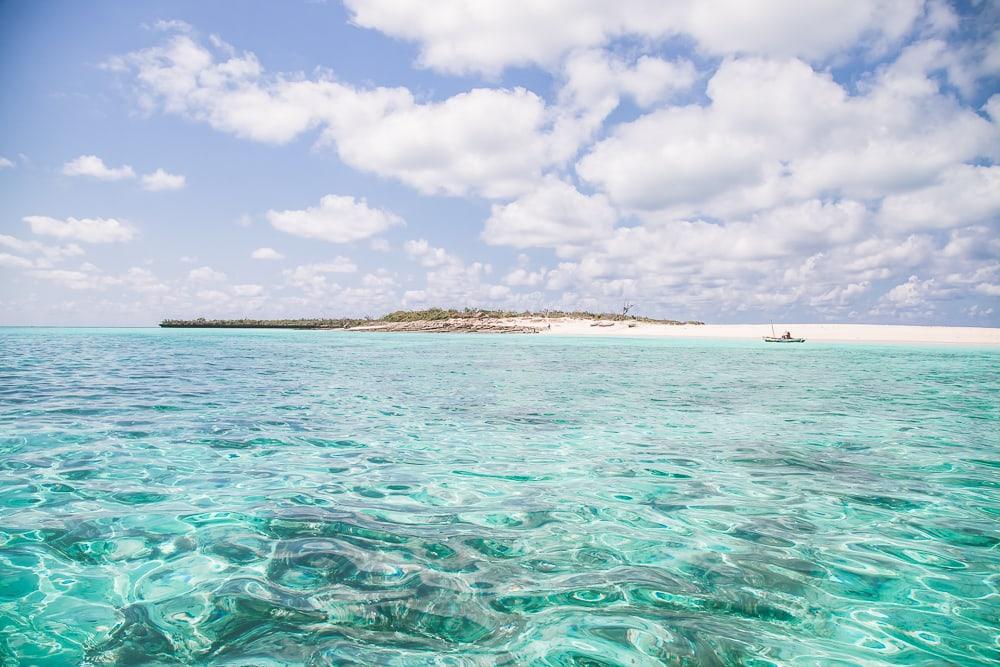
Ugh okay I said I would be perfectly honest, but then I wasn’t.
It took me a long time to open up about how difficult this past year has been for me, and then when I finally did I was so overwhelmed by your kind messages and encouragement. I’ve read your comments over and over and they continue to fill me with such hope.
And yet now I really want to pretend I’m totally happy again and everything is amazing and omg Mozambique was such a fun trip! When the truth is, I’m still really struggling and flying to the other end of the globe didn’t change that.
Why is that so hard to admit? And why does it make me feel so guilty ?
I realize how lucky I am to be able to jet off to the other side of the world for an entire month, and I would never want to take that privilege for granted. And so I’ve been really hard on myself for not feeling happier – like who is still sad about a breakup after ten months?
Well, I am. And perhaps that’s an important thing to admit in an age where everyone seems to be living their best lives on social media.
Danielle and I went into this trip wanting really different things. I had been feeling lonely and wanted to spend a month with my friend, whereas Danielle had had some boy drama of her own and really needed a carefree summer of traveling where she could meet guys. Which of course she did, because she is adored by all men in the world, as she should be.
And I was happy for her (and certainly did not want the guilt of taking that away from her), but playing the third wheel for a lot of our trip also made me feel lonely all over again.
So there, that’s the truth about my time in Mozambique. I loved the country, but I did not love the trip.
And yes, I still love Danielle and am not blaming her for my experience – if I had been in a more emotionally stable place I would not have minded what happened nearly as much, or maybe even at all.
But now I will try to separate my feelings of sadness from my feelings about the places I visited, at least as best I can. Because now that I can look back on our Mozambique trip, I have to admit we had some incredible experiences in incredible places.
Table of Contents
Getting to Mozambique
If you’re coming from outside of Africa, your flight to Mozambique probably isn’t going to be cheap. Danielle and I managed to cut the cost a bit by flying to South Africa first, and then getting a cheaper LAM flight to Maputo from Johannesburg, which is only about an hour-long flight.
And then of course if you’re already in the region you can arrive by land.
We got our visas on arrival at the airport, which was especially convenient for me as Norway doesn’t actually have a Mozambican embassy, so I would have had to travel to Stockholm to get a visa in advance.
Make sure to have your accommodation reservation, return flight out of Mozambique, and 50 USD in cash (or you can pay by card). The immigration officials weren’t very pleased that we only had the documents on our phones, so you’d do better to print everything out.
Getting around Mozambique
Mozambique is about twice the size of California, and especially in the north the roads aren’t great, so it can take a long time to get places.
The fastest way to get places by road are the big buses, but they drive really (really!) fast and have a lot of crashes, so it might be a better idea to take the smaller minivans, or chapas , which take longer and are more crowded and less comfortable. Usually you’ll have to wait for a chapa to fill up before it leaves, so be prepared to spend an extra hour or so waiting around before your journey begins.
The buses and chapas often get stopped by the police, so make sure to always have your passport on you for inspection.
Another option is to take flights around the country.
We flew from Maputo up north to Pemba, and then from Pemba down to Beira. If you want to fly, I’d definitely recommend booking your flights as early as possible to save money. We booked our flight from Pemba about two hours before it left and it definitely could have been cheaper if we had planned in advance a bit.
Day 1: Maputo to Pemba
We spent our first day in Mozambique at the airport in Maputo, first waiting for our visa on arrival (the entire process took a couple of hours) and then waiting for our flight up to Pemba.
We arrived in Pemba in the evening so didn’t do much aside from hopping on the back of a couple of motorbike taxis in search of food.
Pemba accommodation
We stayed at Residencial Lys , which is very central, very affordable, and very basic. We paid about $25 (together) for a double room with a fan and separate bathroom, but they have rooms with air conditioning and en suite bathrooms available as well.
We basically just chose this hotel because it was down the street from where we needed to catch the minivan up to Quisanga to get the boat to Ibo Island. The minivan left at 3:45 am, so we wanted to be close!
After talking to people on Ibo Island who often spend time in Pemba, I do wish we could have spent a few more nights there. I heard good things about Pemba Magic Lodge , which has both private rooms and dorm beds, Il Perata , and Ulala Lodge .
Days 2 – 7: Quirimbas Islands
Getting to the Quirimbas Islands was a journey , but we found a much easier (albeit more expensive) way to return to Pemba. I’ve covered all of that, as well as what to do and which islands to visit in the Quirimbas Archipelago in a whole separate Quirimbas Islands guide here .
Planning this part of the trip was incredibly difficult due to the lack of up to date information about these islands online, but oh my goodness were the Quirimbas worth the planning headaches!
This was my favorite part of the trip, and I have already been telling people if they want to go to Mozambique this is where they should head. Like if you have limited time or don’t want to be traveling around a lot, I’d say just fly directly to Pemba, maybe spend a few days there, and then spend the rest of your time island hopping.
Here you’ll find the most beautiful beaches, the friendliest people, and the best food. What else could you want?
I seriously loved the Quirimbas so much and would say these islands certainly deserve a place on everyone’s Africa bucket list.
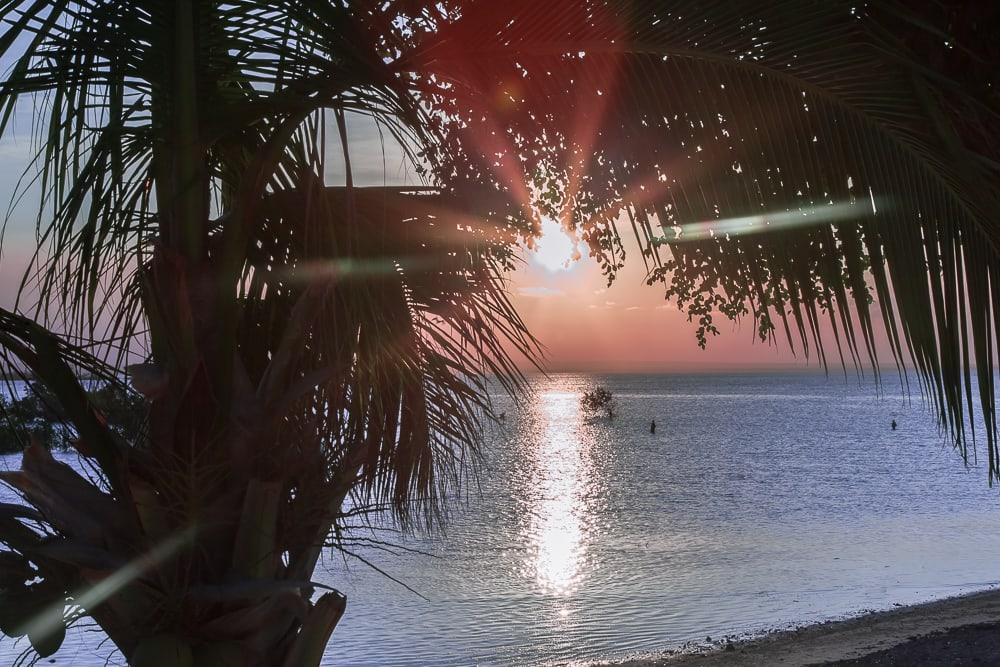
I’ve written more about this in the guide, but I should mention that yes, the Quirimbas were hit by a cyclone in spring 2019.
We could see damage from the cyclone, but the islands we visited were still gorgeous. If anything this gives you more reason to visit the Quirimbas, because they really need the tourists now! In fact news of the cyclone was actually what first inspired me to plan a trip to Mozambique back in the spring.
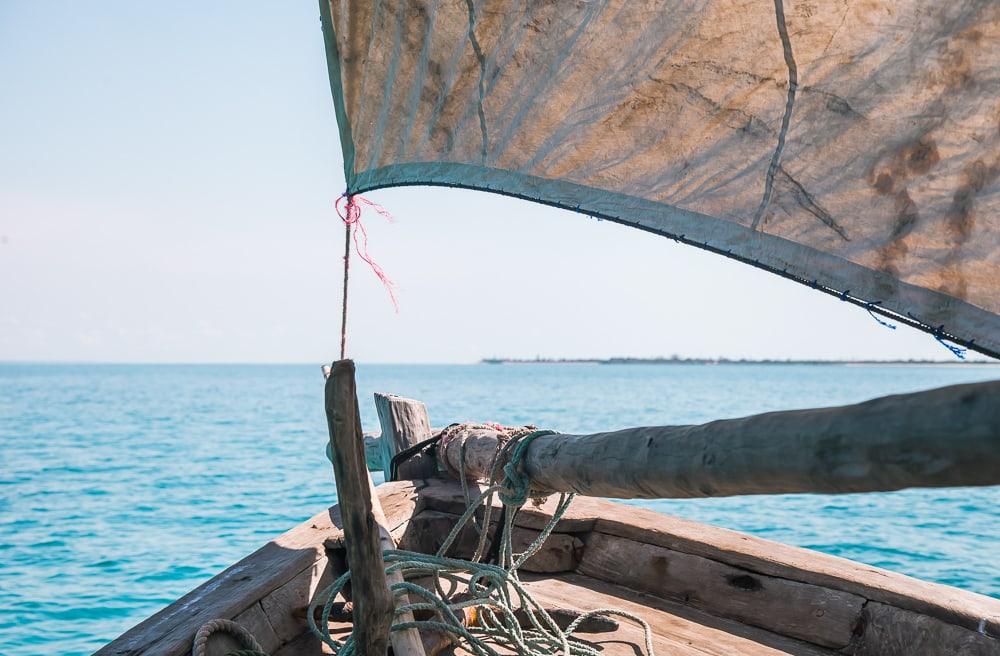
Days 8 – 9: Quirimbas to Gorongosa
Our next destination after the Quirimbas Islands was Gorongosa National Park, a casual 1,300 kilometers away.
Okay, not so casual.
While originally we were going to try to travel overland down to the park via Nampula and Beira, we managed to find a cheap(ish) last minute flight from Pemba to Beira. Looking now there are actually a lot of quite cheap flights, so I’d definitely recommend booking your internal flights in advance if you can.
We spent the night in Beira at Hotel Savoy , which was probably the most basic place we stayed on this trip, but it was fine and centrally located.
While in Beira we also ventured to the local Spar supermarket, just so I could reminisce about my days as a Spar worker!
Jk, we wanted to pick up groceries for Gorongosa, since our room there only came with breakfast.
Days 10 – 11: Gorongosa
To get from Beira to Gorongosa National Park we got the Beira – Quelimane bus that left from the bus station “between 4 am and 5 am” (it was about 5 when we left).
You can buy a ticket at the bus station when you arrive. We didn’t actually buy a ticket though because they were only selling tickets all the way to Quelimane. Since we wanted to get off earlier the driver put us in the back of the bus (the tickets come with seat reservations, so the front was full), and we paid him 500 MZN instead of the 700 it would have cost to go all the way to Quelimane.
Annoyingly the bus drove right past the park entrance but wouldn’t stop until Gorongosa Village, some 40 kilometers away. But maybe if you ask really nicely beforehand you can get them to stop at the park entrance. We couldn’t, so we had to take a “my love” back to the park. Apparently they call these pickup trucks my loves because everyone gets very cosy squished in the back.
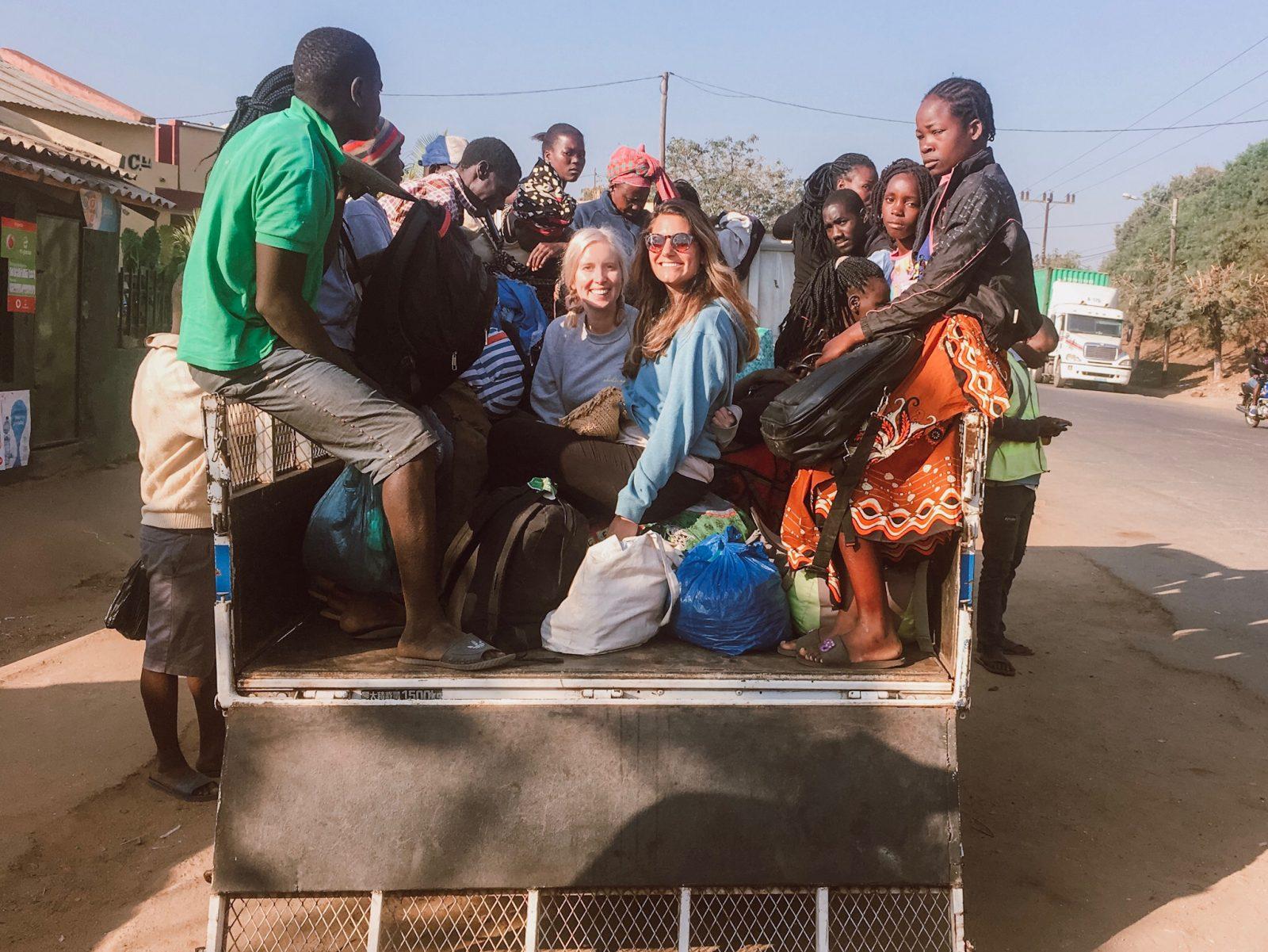
I have mixed feelings about Gorongosa National Park. There’s a chance this is partly because by Gorongosa I was officially third wheeling and this is where those feelings of loneliness and being trapped in an uncomfortable situation started.
But also, Gorongosa is not what it used to be. Though hopefully it will be again in the future!
You probably already know that after gaining independence from Portugal, Mozambique was plagued by a 16-year civil war that lasted into the early 1990s. Like so many wars, this one was actually mostly about the US and Soviet Union, and over a million people died.
Gorongosa became a battleground, and the wildlife that didn’t flee were shot for food, or in the case of the elephants, for their ivory to raise funds for arms and supplies.
Apparently Gorongosa National Park was at one time home to some of the densest wildlife populations in Africa, but this population was reduced by as much as 95% during the war. Now the park is making great efforts to bring those numbers back up, but it’s a slow process.
Really this is all just reason to support the park, and you can still have a wonderful safari experience in Gorongosa.
We did an afternoon safari the day we arrived where we saw a bunch of lions, and then another safari the next morning where we saw several elephants. The park didn’t feel quite as wild as other parks I’ve visited in Africa, but it was still such a special experience.
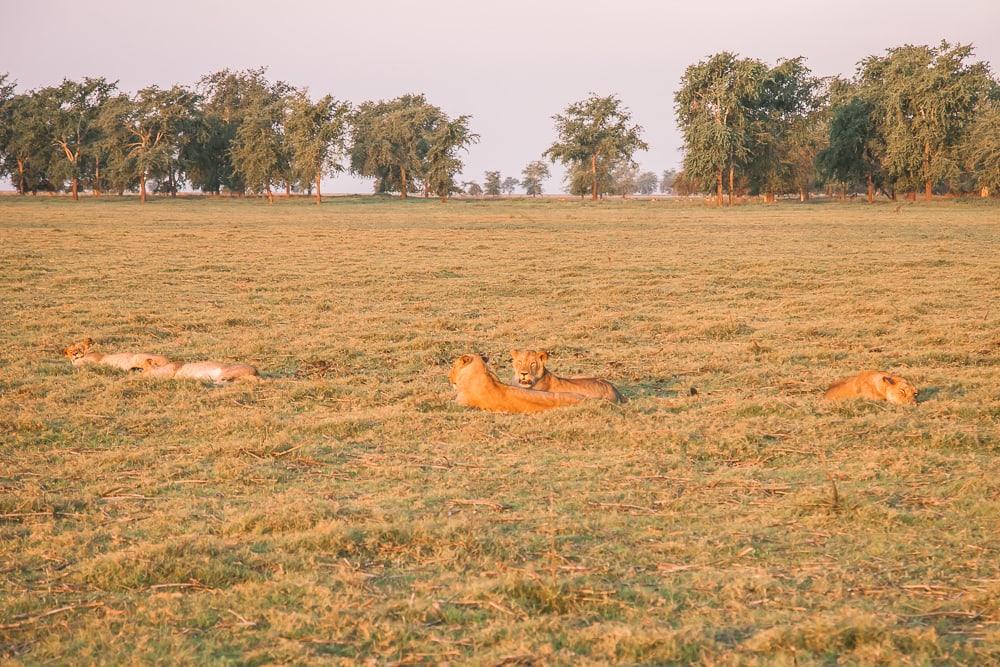
Gorongosa National Park accommodation
You can arrange both accommodation at Chitengo Lodge and your safaris through Gorongosa’s website . We stayed in a standard bungalow with three beds, which also included breakfast.
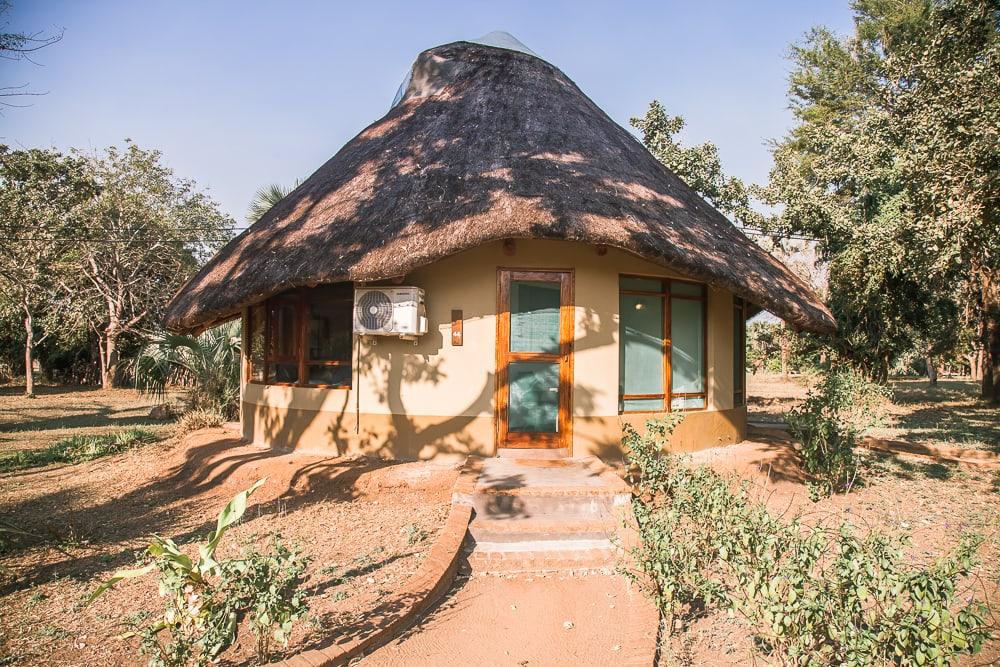
We left in the afternoon after our morning safari and spent the night in nearby Inchope, so that would could get an early morning ride down to Vilanculos.
Days 12 – 14: Vilanculos
Originally we had planned to take a bus from Inchope to Vilanculos, but then we ended up finding a guy who was headed there, so we paid for a ride in his truck instead.
The journey took about six hours, and the roads were so much better than what we had experienced in northern Mozambique!
The south almost feels like a different country because it’s so much more developed. However it’s a lot more touristy as well.
To be honest I didn’t love Vilanculos. I think I would have appreciated it so much more if I hadn’t already been to the Quirimbas. In comparison, the beach in Vilanculos wasn’t as nice, and locals kept pestering us to buy things, which never happened in the Quirimbas.
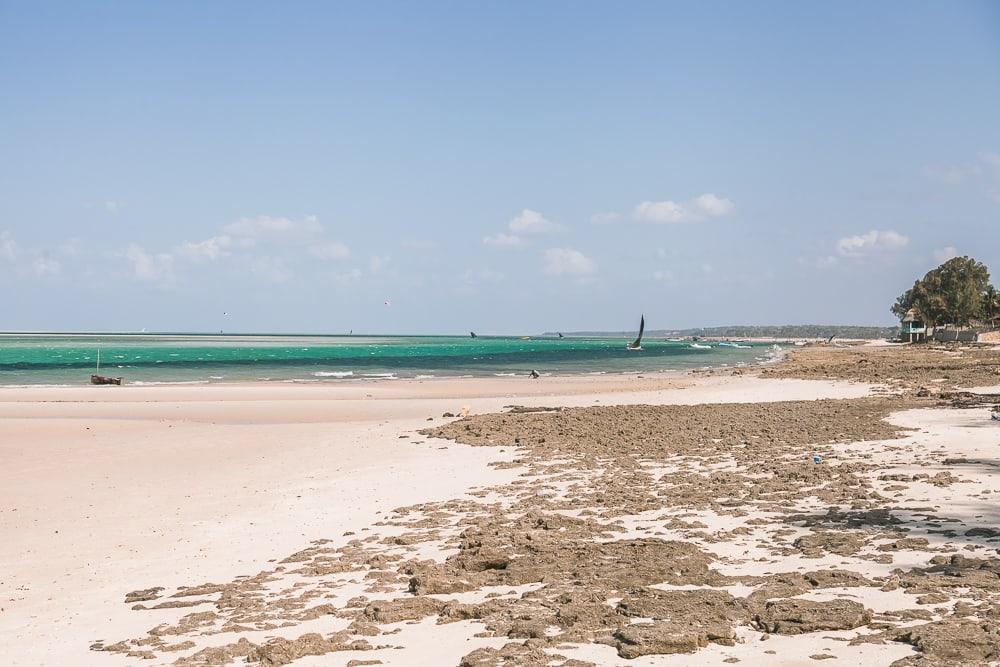
Honestly I would only bother coming to Vilanculos if you can’t make it up north. They do have a lot of nice hotels and resorts, and while Bazaruto Island off the coast is more touristy than the Quirimbas Islands, it still looked very idyllic.
Vilanculos accommodation
We stayed at Baobab Beach Resort , which was right on the beach and has a bunch of different accommodation options.
Day 15: Vilanculos to Tofo
The journey from Vilanculos to Tofo took all day, but it’s also possible to fly to Inhambane, which is about 25 kilometers from Tofo.
First we got a bus to Maxixe, which took about four hours, and then from there we got on a ferry to Inhambane. From Inhambane we got a chapa to Tofo, which took about an hour, including a long stop at a police checkpoint.
Days 16 – 20: Tofo
Tofo is Mozambique’s main backpacker destination, and that’s exactly what it felt like.
It’s a laidback little town that seems to mainly exist for tourists. And it happens to lie along the prettiest beach.
Again, I would have preferred to spend this time in the Quirimbas (I feel bad that I keep saying this, but it’s not because I didn’t enjoy the rest of Mozambique – I just really adored the Quirimbas).
Tofo felt sort of like it could have been a backpacker spot anywhere in the world. I didn’t necessarily feel like I was in Mozambique anymore, but we did have a great time there. The food was good, the beach beautiful, and I loved our hotel.
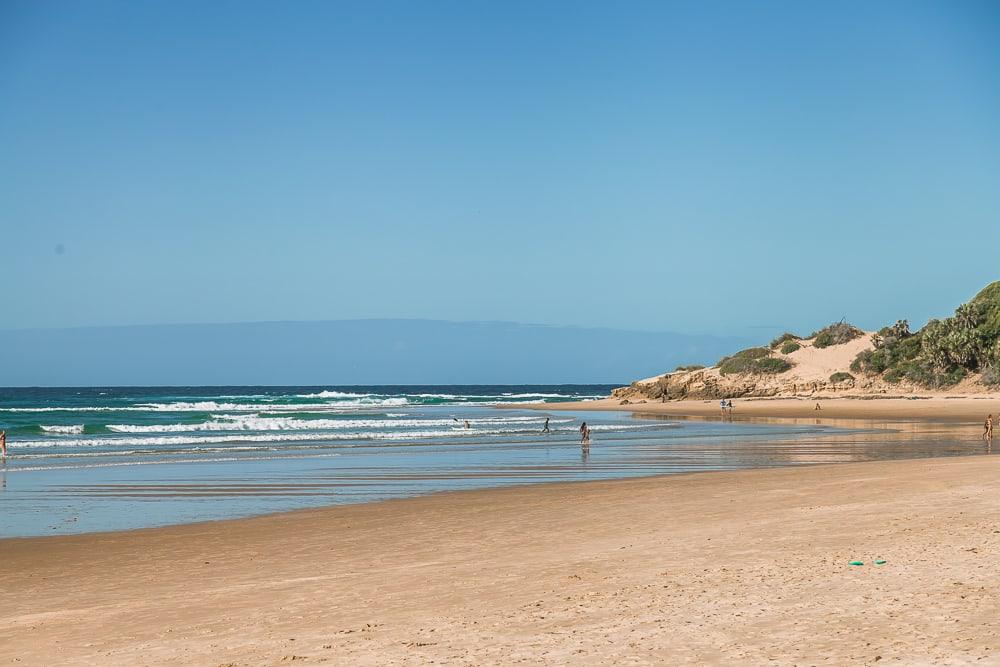
Tofo day trips
Tofo is a popular diving destination, but I can’t tell you much more than that because oh my goodness, diving is way too scary for me. Like, I could never. In fact Danielle said she once attempted to get her certificate but it proved too stressful for her too. So I’m not the only baby here.
Tofo also is home to lots of whales! We could see whales right off the coast, and Danielle and her friend went on a whale safari with Diversity Scuba . They saw a few humpback whales, but the safari only allows getting in the water with whale sharks, which they didn’t see. Apparently the best time to swim with whale sharks in Tofo is from October to March.
We also went sailing for a day, with lunch on a neighboring island. It was nice to get back out on the water, but again it really made me miss the Quirimbas Islands! The boat trips up there were just so much more beautiful.
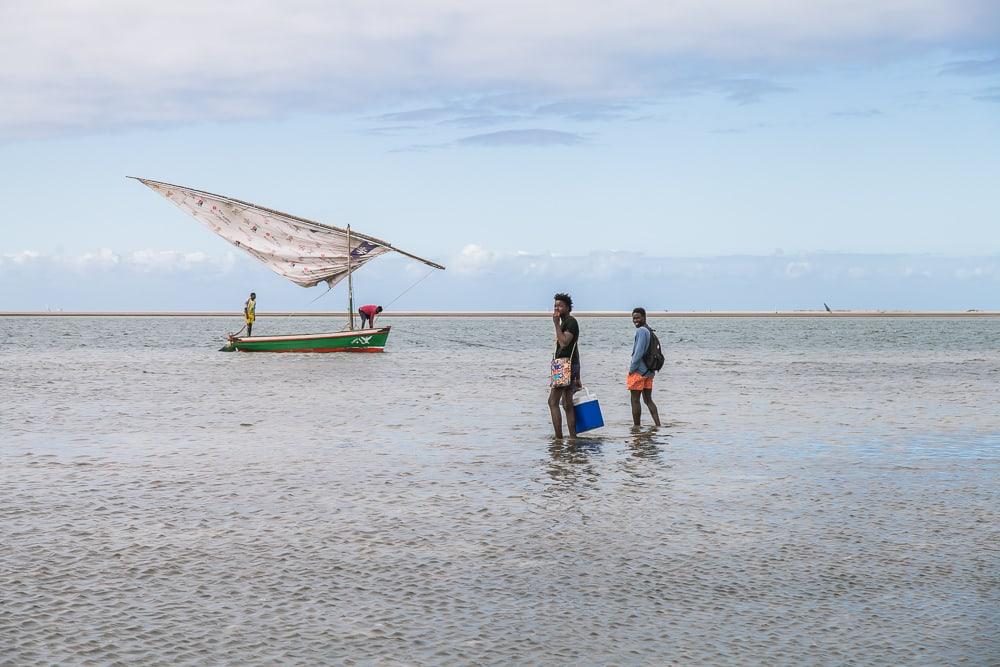
Tofo restaurants
We ate at a bunch of different places in Tofo, but as soon as we discovered Mama Bia that’s where we had all the rest of our meals. It’s a little restaurant inside the local market and oh my goodness, get the fried calamari with fries and a salad! We would also always buy an avocado at the market to have them put in the salad, because we’re Millennials.
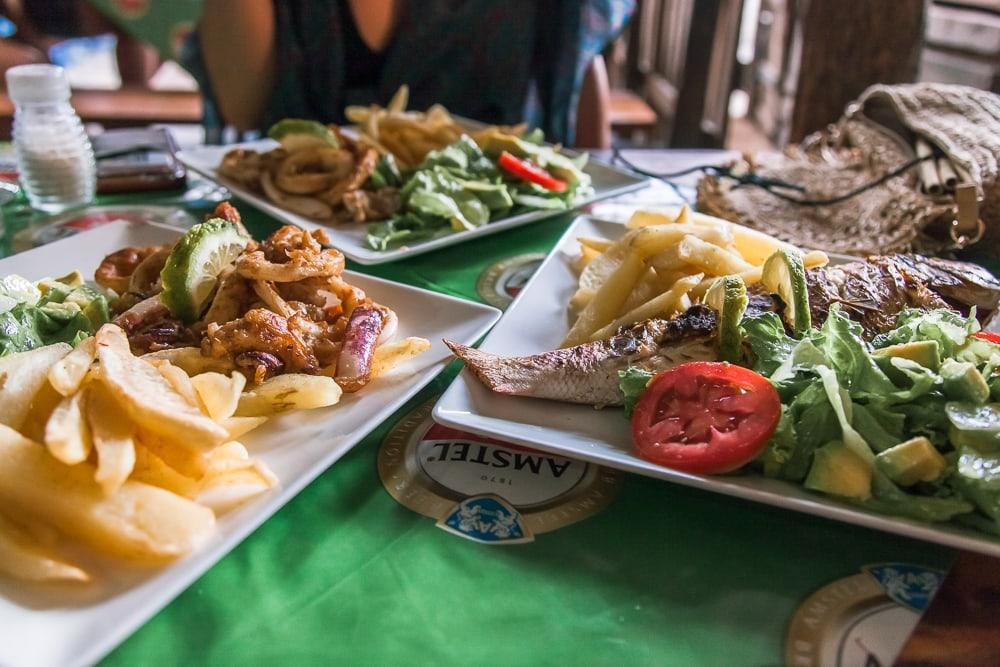
I also really loved Tofo Tofo , which is more upscale and has live music every Tuesday.
Tofo accommodation
We stayed at Casa do Mar which was the most bizarre and yet wonderful part of our Tofo experience.
Somehow I totally failed to get photos of the inside, which is decorated with lots of animal skins and 80s glam furniture. The owners are South African and I feel like they must be the biggest characters.
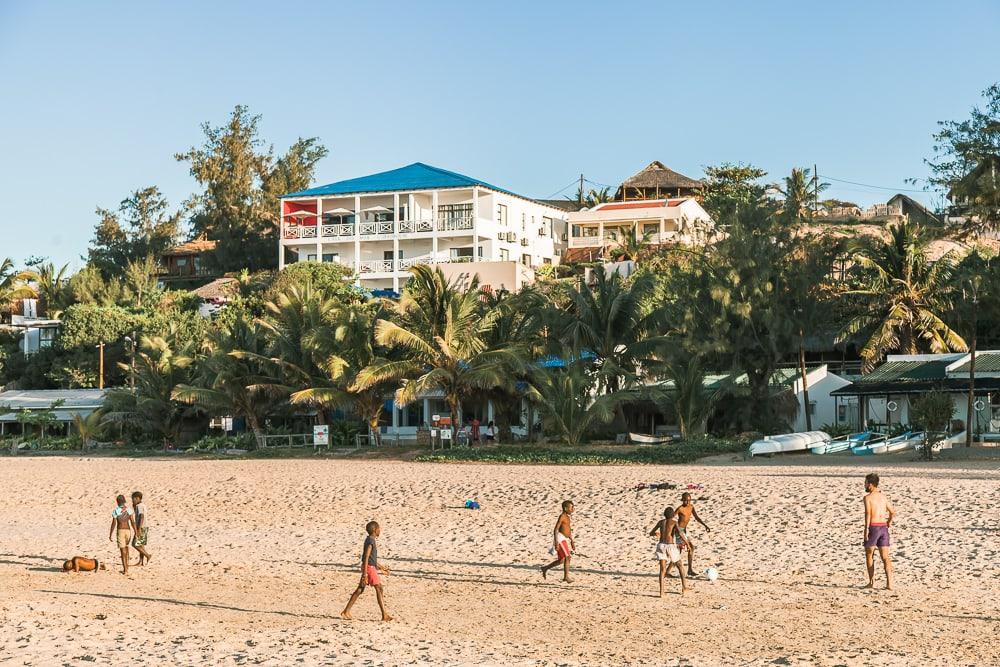
The staff were so nice there and breakfast was so good, but mostly I loved the views out over the beach and the swimming pool. It felt like such a vacation after all the long travel days across Mozambique. I think it was exactly what we all needed at the end of our trip.
Check current rates and availability at Casa do Mar here
Day 21: Tofo to Maputo
It seems like every bus in Mozambique leaves at 4 or 5 am. But this was our final early wake up call!
We took a private car from our guest house in Tofo to Inhambane, and then the Etrago bus from Inhambane to Maputo. You can also get Fatima’s shuttle directly from Tofo. We had heard that the Etrago bus was supposed to be nicer, but it was still just a minivan, so it probably would have been easier just to go with Fatima’s shuttle.
To be honest I can’t actually remember where we stayed in Maputo, because we chose it last minute and only spent one night there. But after seeing the little bit I did of Maputo I did sort of wish we had had at least an extra day there.
The city is much more laidback than I had expected. I felt safe walking around alone and I just really enjoyed the vibe of the city. Sorry that’s so vague – I didn’t see very much!
Day 22: Home
My journey home was long . I flew back to Johannesburg, then Cape Town, then Istanbul, then Oslo, and then Trondheim. And then I took a five-hour train up to Mosjøen. But Mozambique was certainly worth it.
Related Posts
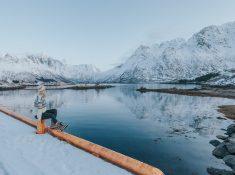
Reader Interactions
Get updates.
Subscribe to my newsletter for exclusive updates and stories from my world travels and life in Norway!
September 18, 2019 at 10:56 pm
Sorry to hear about your third-wheel loneliness, but Mozambique does sound fascinating! And I can’t believe Spar has a presence there too!
Silvia says
September 20, 2019 at 9:26 pm
Right? The Dutch are everywhere!
Mary B says
September 18, 2019 at 10:58 pm
I love the honesty, Sylvia! Travel is great, but it doesn’t fix what’s broken or take away sadness, and it’s disingenuous (but very common in the travel community) to suggest otherwise. I traveled for a couple of months this summer and everyone kept asking “are you having the most fun?!”, as if that was a given. Yes, we had a good time, but we didn’t have the BEST TIME EVER. We didn’t have jobs so we couldn’t afford to do a lot of the really awesome stuff you see on Instagram, and we spent a lot of our time trying to figure out where to go/stay next, and we were tired from months of busy life before we left. (Also, totally normal and okay to be sad about a breakup 10 months later. And to not enjoy being the third wheel on your vacation, especially while you’re in that head space!)
September 18, 2019 at 10:59 pm
Ugh, sorry, I misspelled your name and I can’t edit it to fix it! Silvia 🙂
Haha no worries, everyone spells it wrong. And yeah, it’s weird how we feel this pressure to always have the best time on our travels, or at least tell people that we are.
September 20, 2019 at 1:36 am
Everything is so beautiful! I have never personally seen a beach with such blue, clear water and such white sand…what a dream! I’m sorry you are still having a tough time. There is no expiration date on our grief, and breakups from serious relationships are definitely full of grief.
September 20, 2019 at 9:23 pm
Ugh, I wish there were an expiration date. But yes, at least the beaches were the stuff of dreams!
Pradish P says
September 24, 2019 at 2:38 am
A perfect glimpse of south Mozambique. Glad you shared. Added in my bucket list
Katie Chavez says
September 25, 2019 at 10:23 pm
Silvia, you have made me want to go to Mozambique even more! I was meant to go there and had started to research the Quirimbas but we ended up going to Lesotho instead as we didn’t have a lot of time (was visiting my ex’s family in South Africa). Also, you are not weird to still be grieving over your break up after 10 months – it has been 3.5 years since me and my ex-fiance broke up and I still have bad days. We were together for 9 years and I still miss him. But, I married a wonderful man who I love and it DOES get easier. It’s also not a linear thing – you could feel good for months then it could hit you hard again for a few weeks. Don’t be too hard on yourself!
October 1, 2019 at 3:25 pm
Oh wow, that does make me feel better. Also that you were together for so long, but ended up marrying someone new in a shorter amount of time – that’s something I think about a lot, especially if I want to have a family.
Endie Chitere says
December 24, 2019 at 12:07 pm
What an experience!! Lol seems all buses in Mozambique leave at 4am or 5am!! The Quirimbas description is very tempting
Leave a Reply Cancel reply
Your email address will not be published. Required fields are marked *
Once a full-time nomad, I'm now trying to find a balance between continuing to explore off the beaten path places around the world while also building a home in Norway. Want to know more? Head to my About page !
COME AND GET IT!
Subscribe to my newsletter for exclusive updates and stories from my world travels and life in Norway:
The Yogi Wanderer
Yoga & Wellness Travel
Join my newsletter
Sign up to my monthly newsletter and get a FREE RELAXATION / YOGANIDRA AUDIO FILE! You can unsubscribe at any time.
in Mozambique · Travel
What to Do in Mozambique: A 10-Day Mozambique Travel Itinerary
This post may contain affiliate links. I may earn a small commission if you click through them, at no extra cost to you.

Looking for what to do in Mozambique? Read on for my 10-day Mozambique travel itinerary based on my recent visit to the pearl of the Indian Ocean, with everything you need to know to start planning your own trip right now.
Mozambique has been in my imagination for a long time. This year I finally fulfilled my curiosity for this fascinating southeast African country. And the reason could not be better: the wedding of one of my closest friends, which prompted an unexpected reunion with my girlfriends from college. We are spread over the world now, so getting together in Mozambique made this trip very special.
But I’m not going to lie: this trip was also, in some ways, the hardest I’ve ever taken. Mozambique is among the poorest countries in the world, and the poorest I’ve ever visited. The poverty and inequality were a punch in the stomach and, at the same time, a wake-up call.
That doesn’t mean you shouldn’t go. Quite the contrary. Mozambique is also a country of kind and resilient people, with a rich and captivating culture, delicious food, and breathtaking beauty. A country with a lot to offer to whom is willing to truly see it, and learn from it.
Table of Contents
When to visit Mozambique
Generally speaking, the best time of the year to visit Mozambique is from May to November, during the cooler dry season. From December to April, the wet summer season brings higher temperatures and rain.
I traveled to Mozambique in March and got two days of unstoppable pouring rain at the end of my vacation, when I was expecting to enjoy the beach and the Indian Ocean. Fortunately the next and last two days of my time in Mozambique were much better.
If you don’t want to take any chances with the weather, I’d recommend sticking with the dry season, especially from June to October.
Safety and health in Mozambique
Mozambique is a relatively safe country for travelers. As long as you take normal precautions – don’t leave your belongings unattended on the beach or anywhere else, look out for your bag or pockets on crowded places like markets, and avoid isolated areas, especially at night – you should be all right.
Before traveling to Mozambique, see your doctor or a travel medicine specialist and do the recommended vaccination. Your doctor will also advise you on the best anti-malarial medication for you. Mozambique is a malaria risk country, so it’s important you take malaria tablets before, during and after your trip to prevent the disease. And don’t forget to avoid mosquito bites with the use of a repellent spray.
Finally, do not drink tap water while in Mozambique, but opt for bottled water instead.
Now that you are all set, here’s what to do in Mozambique:
Things to do in Mozambique: a 10-day Mozambique itinerary
Maputo – 2 days.

Maputo is probably not the most beautiful city you’ll ever visit. But that doesn’t mean you should skip it altogether, as I’ve seen recommended on other travel blogs. After all, traveling is not, or shouldn’t be, only about seeing pretty places.
Yes, Maputo can be a little rough around the edges. But as the capital and biggest city of Mozambique, it offers a great opportunity to learn more about the history and present of the country.
Maputo is also the gateway to most of Mozambique’s beach destinations. So take at least two days to explore former Lourenço Marques, as it was called before independence from Portuguese rule in 1975.
Top things to do in Maputo
#1 mafalala walking tour.
Start your visit to Maputo discovering one of its most iconic neighborhoods. Mafalala is a symbol of anti-colonial resistance, and birthplace or once home to some of Mozambique’s most prominent writers, intellectuals, politicians, and athletes.
The guided walking tour with Iverca Association was one of the best experiences I had during my time in Mozambique, and I truly can’t recommend it enough.

#2 Maputo beach
Enjoy a day on the beach, or just stroll along the beachfront avenue for some beautiful views over the Indian Ocean.

#3 Maputo Railway Station
Considered the third most beautiful train station in the world by Time magazine in 2015, Maputo Central Railway Station is definitely worth a visit.

#4 Downtown Maputo
Downton Maputo offers a handful of attractions, including the Maputo Fortress, the Independence Square with its huge Samora Machel (the country’s first president) statue, Maputo’s Cathedral, the Iron House (designed by Gustav Eiffel), and the Tunduru Gardens.
Book a tour of downtown Maputo here .

#5 Feima – crafts, flowers and gastronomy fair
Don’t leave Maputo without some souvenir shopping at Feima. Maputo’s artists and artisans show and sell their unique work here, from batik paintings to wooden handicrafts, from straw bags to the traditional capulanas.

Recommended places to eat in Maputo
I don’t even know where to start when talking about this place. A stunning view over the Maputo Bay, an elegant atmosphere, and delicious Greek-inspired cuisine – Dhow has it all.
This restaurant slash café slash art gallery features unique decoration pieces and artwork from the Asian and African continents, and it’s absolutely gorgeous.

Mundo’s is a locals’ favorite, famous for its pizzas and as a meeting point to watch football and rugby. We had dinner here on a Saturday and it was pretty crowded with fans of Portuguese football. The atmosphere is extremely friendly and relaxed, and the pizza very good.
Soul Gourmet
Hidden in a quiet street of the Sommerchield neighborhood, Soul is a restaurant and gourmet store with a healthy and contemporary concept.
Open for breakfast and lunch from Monday to Friday, it offers delicious daily menus, prepared with local and fresh ingredients. I had the raw salad, with cucumber noodles, white mushrooms, avocado, and mint.
Saturday mornings are time for yoga and brunch. Definitely my kind of place.

Graciana (Feima)
For traditional Mozambique dishes head to Graciana, at Feima. Food is very good here, but you’ll need some patience with the service. Nevertheless, I still recommend eating here for a taste of the local gastronomy.
Considered one of the best restaurants in the city, Zambi is a mandatory stop in your Maputo itinerary. With a wide variety of dishes, from seafood to European cuisine and sushi, great service, and an excellent location on the oceanfront, Zambi doesn’t disappoint.
I chose the tiger prawns and all I can tell you is that they tasted as good as they look.

Where to stay in Maputo
The perfect spot in sommerchield.
We’ve stayed in an amazing Airbnb in the Sommerchield district , the best residential neighborhood in Maputo. This beautiful and very comfortable apartment is perfect for a group or family vacation (we were four adults but there’s space for up to six people). It’s also conveniently located close to restaurants, coffee shops, and several banks.
Disclaimer: we were non-paying guests since my friend owns the apartment, but I wouldn’t include it here if I didn’t think it’s a great option for your stay in Maputo!
Click here for more info and booking.
Polana Serena Hotel
If you’d rather stay in a hotel, Polana Serena is one of the finest in the city. In fact, this historic building is worth visiting even if you don’t stay here. Polana Serena offers 5-star accommodation and a spa.
- Read about more things to do in Maputo, Mozambique
Kruger National Park, South Africa – 2/3 days

Ok, I know what you might be thinking: Should I include a park in South Africa in a Mozambique travel itinerary? The answer is: Absolutely!
Kruger National Park is the biggest game reserve in South Africa and one of the largest in the African continent. It stretches 360 kilometers on the border with Mozambique, and it’s closer to Maputo than to any major city in South Africa.
Famous worldwide for its wildlife, it offers a great opportunity to spot the Big Five (lion, leopard, rhino, elephant, and buffalo) and much more.
Taking a safari in Africa is an experience you won’t want to miss, especially being so close.
How to get there
The easiest and cheapest way to get from Maputo to Kruger National Park is to rent a car or hire a private driver. Alternatively, there are also organized day tours to Kruger National Park from Maputo.
We decided to hire a private driver. It took us around three hours, including border crossing procedures, to get to Malalane. This small town is home to one of the main entrances to the park, the Malelane Gate.
Make sure you get a multi-entry visa for Mozambique prior to your travel. This will save you some time and paperwork on your way back. If you’re traveling with a single-entry visa, you can still visit Kruger National Park, but you’ll need to request a border visa when reentering Mozambique.
Doing a safari in Kruger National Park
Shortly after checking in at our lodge in Malalane, we got picked up by Echo Africa Safaris for our afternoon game drive. The next four hours were some of the most exciting of my entire life.
We were lucky enough to get close to elephants, rhinos, impalas, giraffes, a buffalo, and even spot some lions from afar. Observing these wild animals roaming freely in their natural habitat, against the breathtaking landscape of the park, was a moving and unforgettable experience.

The next day we did a morning game drive, before returning to Maputo in the afternoon. This time, though, we were not so lucky.
We saw a couple of elephants and rhinos, zebras, and again some lions from afar, but nothing compared with the natural spectacle of the previous day. We also got stuck with a guide and a tourist couple who were very much into birds, so that’s what we ended up seeing for most of the morning.
Echo Africa Safaris also offer full day game drives, bush walks, and night drives.

Where to stay in Kruger National Park
Kruger view chalets.
We stayed at Kruger View Chalets , an affordable self-catering lodge right outside Kruger National Park. Our chalet had everything we needed for one night: two comfortable bedrooms with en-suite bathroom and AC, lounge, kitchen and patio. There’s also a swimming pool area with a view over the park and Crocodile River, and a restaurant next door, at Rio Vista Lodge .
Malalane has no taxi service, but the reception was kind enough to arrange our transportation to the town center, where you can find a supermarket and several restaurants, at an extra price.
Click here for more info and booking: Booking.com

Pestana Kruger Lodge
For an upscale stay, Pestana Kruger Lodge offers 4-star accommodation, two outdoor swimming pools, one indoor pool, restaurant, two bars, and spa. Located only 150 meters from Malelane Gate, Pestana Kruger Lodge has a deck restaurant and bar overlooking Crocodile River, and a safari company located inside the hotel. Guests can also request a breakfast pack to take on the morning safaris.
Click here for more info and booking: Booking.com
- Read more about my amazing experience doing a safari in Kruger National Park
Mozambique beaches – 5/6 days

No list of things to do in Mozambique is complete without including its stunning beaches. The country’s vast coastline hides some of the most beautiful beaches in Africa. Think endless stretches of white sand and turquoise waters, with fewer tourists and for much cheaper than other more famous destinations around the world.
I’m including Ponta do Ouro in this Mozambique travel itinerary since that was the only beach town I visited during my 10-day trip. But there are many other options, most of them, reportedly, even more beautiful.
Ponta do Ouro is a small village in the extreme south of the country, close to the border with South Africa, and a popular beach destination among its southern neighbors.
There are no roads here, only sand tracks, and shopping is still limited. A new road connecting Maputo to Ponta do Ouro is being built but its 120 kilometers are not yet completed. For now, this small beach town is only reachable by 4×4 vehicle.
My friends’ wedding was held here, so we spent five days relaxing, enjoying the beach and exploring this (still) hidden gem.
Top things to do in Ponta do Ouro
#1 scuba diving.
Ponta do Ouro is known for its beautiful coral reefs, rich marine life, and clear water, which make it one of the best diving spots in Mozambique.

#2 Swimming with dolphins
Have you ever dreamed of swimming with dolphins? In Ponta do Ouro you can do that in an ethical way, meaning in their natural habitat and without disturbing the animals. Some ocean safaris also include snorkeling and whale watching.
#3 Surfing and kitesurfing
Ponta do Ouro is also a great spot for surfing and kitesurfing, both for beginners and advanced surfers, with several places offering lessons and gear rental.

#4 Shopping
From groceries to art, clothing, jewelry, and handmade crafts, Ponta do Ouro village center is an open-air market made of small wooden stalls and colorful products. There’s also a couple of shops worth paying a visit, like Magenta Moon and Ponki.

#5 Eating and drinking
For such a small village, Ponta do Ouro does have a surprising number of nice restaurants and bars, with a cool and beachy vibe. And what better way to finish a day on the beach than enjoying some fresh food and cold drinks?
Service, on the other hand, can be a little slow and clumsy. But hey, you’re on vacation, so just relax and have fun.

Recommended places to eat in Ponta do Ouro
Love café & deli.
Located right in the center of the village, you can’t possibly miss Love Café when visiting Ponta do Ouro. With its colorful love themed décor and relaxed atmosphere, Love Café is a great choice to grab a bite before heading to the beach or to enjoy the warm African evenings.
We ended up visiting it twice, once for dinner and another time for lunch.

Ponta Beach Bar
If you’re a beach bum who loves being surrounded by surfers and other ocean souls, Ponta Beach Bar is the right place for you. Food and service are ok, although not great. But you come here for the vibe, not the gastronomic experience.
Magenta Moon
Magenta Moon is a quirky café and boutique, with a hippie flair and delicious cakes. Seriously, you ought to try the carrot cake here, before indulging in some shopping.

Café del Mar
Café del Mar was without a doubt the best place we ate at in Ponta do Ouro. Besides the excellent food and service, it offers a privileged view over the village all the way to the ocean. After dark, its cocktail bar turns into a party venue, with chill-out music and a tropical vibe.

Where to stay in Ponta do Ouro
Bougainvilla sol.
This was our second choice in terms of accommodation, and I will definitely stay at BougainVilla Sol if I ever return to Ponta do Ouro. We ended up staying at an Airbnb house that was ok but far from great.
BougainVilla Sol is located just a short 2-minute walk from the beach and the village center. All rooms have private bathroom and AC. The property has also a garden and an outdoor swimming pool.
Other Mozambique beaches worth visiting
Some of the best beaches in Mozambique, and on my personal travel bucket list, include:
- Tofo and Barra in the Inhambane province
- Vilanculos and Bazaruto Archipelago
- Island of Mozambique
There are of course many other things to do and see in Mozambique. But if you’re visiting for the first time, this 10-day Mozambique travel itinerary got you covered.
From history and culture to wildlife and pristine beaches, get ready for a spellbinding trip to an underrated African paradise.
More travel tips
Travel insurance.
SafetyWing – Travel insurance is very important and you should never leave home without it! I use and recommend SafetyWing travel medical insurance for travelers, remote workers, and nomads.
They cover overseas medical assistance in case of accident or illness, travel delay or interruption, lost checked luggage, emergency medical or political evacuation, natural disasters, and personal liability, at very competitive prices.
You can subscribe online here for a minimum of 5 days to a maximum of 364 days, or opt for a monthly subscription instead.
Cheap flights
Looking for the best airfare deals? Skyscanner is my favorite travel search engine for finding cheap flights around the world. They also offer price tracking and alerts to help you secure the best deals.
Accommodation
When it comes to accommodation, Booking.com is the best site out there. From hotels to apartments, resorts, villas, B&B, and guest houses, it offers the best prices for accommodation all over the world. I book the majority of my stays through them.
Yoga Retreats
Looking for a yoga retreat near home or in an exotic destination? BookYogaRetreats offers the best yoga retreats, holidays, and courses around the world for all budgets and levels of experience.
GetYourGuide is my favorite platform for local tours, unique experiences, and skip-the-line tickets to attractions all around the world.
Klook is another great resource for tours and activities, especially if you’re looking for things to do in Asia.
Car Rentals
Rentalcars.com is a car rental search engine that compares the biggest brands in car hire and allows you to find the cheapest deals all around the world.
Have you been to Mozambique? What would you add to this guide of what to do in Mozambique? Share in the comments section below.
If you like it, Pin it!

About Vanda
I'm a Portuguese journalist and certified yoga teacher born in the Azores but Lisboner at heart. After 10 years as an expat in Switzerland, I now travel the world full-time as a digital nomad, with 27 countries and 5 continents under my belt and counting. I share wellness and yoga-friendly travel advice based on my own experience and knowledge.
join my newsletter
Sign up to my newsletter and get access to exclusive stories, tips, and advice, plus a FREE RELAXATION / YOGANIDRA AUDIO FILE!
I only send out my newsletter about once a month and you can unsubscribe at any time. See my privacy policy for more information on how I take care of your personal data.
Jennifer Mostert says
October 26, 2019 at 5:41 pm
I’m so glad that you enjoyed the Kruger Park and of course, my personal favourite in Mozambique, Ponto do Ouro. In another lifetime I worked as a Dive Master in Ponto for 18 months, it is part of a marine reserve making the scuba diving absolutely splendid with over 21 different reefs in the system to suit every level of diver.
May 20, 2018 at 7:38 pm
Wow! I live in Tanzania, one country away from Mozambique, and I have been meaning to get on a bus one of these days and head on over to Mozambique. Thanks for pointers on what to do when I am there! 🙂
Sharanya says
April 21, 2018 at 7:43 pm
What an amazing post with lovely pictures too! I’m hoping to spend two months in East Africa this year, this is so helpful for me to bookmark and plan my way across countries! 🙂
Claudia says
April 21, 2018 at 7:07 pm
I went to Mozambique for about 2 weeks and I loved it. I haven´t been to Ponta do Ouro but it looks stunningly beautiful. I went to the beaches of Tofu Beach, Xai Xai and Vilanculos. There you can take a boat to even more beautiful beaches of the Bazaruto Archipelago. If you ever visit Mozambique again – check it out. Thanks for sharing your journey.
dorothyadele says
April 21, 2018 at 2:11 pm
I enjoyed your post. You supplied good detail about everything a traveler needs to know about visiting Mosambique. Also, I agree that the train station is gorgeous. With people in need, I found it surprising that they created a beautiful train station in a poverty ridden country.
Hayley says
April 21, 2018 at 1:44 pm
Wonderful guide! I absolutely love Mozambique and will be back there in August for my best friends bachelorette party! Also the Kruger Park is one of the most beautiful places on Earth – glad you mentioned to include it in the trip 😊
April 21, 2018 at 11:46 am
Those beaches look incredible! I’m dreaming of this continent-wide backpacking trip of Africa one day, and Mozambique is definitely on my list. Savid this for when the day comes!! Thanks for sharing!
Kiara Gallop says
April 21, 2018 at 10:54 am
Yes, I’ve read a few articles that say to skip Maputo, but that always feels like a challenge to me! If you dig deep enough you can find beauty (although not necessarily in the aesthetic sense) everywhere. I think you managed to capture it pretty well 🙂
I’ve also heard that Tofu is gorgeous and definitely plan to try and make it there too.
April 21, 2018 at 2:38 am
The food looks amazing! Mozambique looks a bit like Southern India or Southeast Asia—I don’t think I was expecting that! Would love to go one day. Thanks for sharing 🙂
Amy Dodd says
April 21, 2018 at 2:24 am
What a great post! The national park looks amazing – especially all the wildlife that you got to see. The post was so informative and had great information for a country I feel a lot of us avoid traveling to. I totally want to visit now!
Let’s Connect
Looking for something.

Home » Travel Guides » Mozambique » 15 Best Places to Visit in Mozambique
15 Best Places to Visit in Mozambique
Occupying a great bend of East Africa, where the tropical heart of the continent slowly becomes the temperate south of the continent, the vast nation of Mozambique certainly has its fair share of touristic draws. Along the coast you’ll find alabaster-white sands with a fringing of palm trees; you’ll spot curious manatee-like creatures in the company of blooming coral sponges in the warm Indian Ocean waters. And as the interior takes over – a patchwork of swaying savannah grasses and baobab forests – the habitats of the famous Rift Valley begin in earnest.
There, it’s all about the hopping gazelles and the elephants, the sculpted highlands of Zambezia, and the earthy tribal villages of the native folks. And who’s forgetting Mozambique’s enthralling capital? That Maputo is a pulse of life, beating with jazz and reggae and flavoured with just a taste of Portuguese charm. (After a lengthy civil war, hopes were high that the nation would stabilise and open for good, but recent upheavals have wobbled expectations – so be sure to check ahead for FCO warnings and the like.)
Lets explore the best places to visit in Mozambique :
1. Bazaruto Archipelago

There’s nothing quite like the Bazaruto Archipelago. A speckling of elongated isles in the Indian Ocean, they are a patchwork of shimmering, aquamarine seas and coral gardens, windblown sand dunes and ochre-hued coastal hills that come peppered with scrub and swaying coconut palm groves.
The largest island of the area (called, simply, just Bazaruto) is a place of open sandy bays patrolled by galumphing dugong, while the inland is carved through by karst hills and boulder stones. A little to the south and you’ll find the paradisiacal reaches of the Ilha de Benguerra, where luxurious honeymoon hotels poke above the white sands in a medley of swinging hammocks and sunning decks.

Mozambique’s handsome capital is a lesson in all things colonial. It was raised to the place of first city after the Portuguese drained the surrounding swampland.
Then it was just a case of building the grand, imperial likes of the railway station, the pretty Casa do Ferro (courtesy of one Gustav Eiffel no less!) and rings of wide boulevards peppered with palm trees a la the Algarve – bingo you’ve got yourself a small enclave of Europe in Africa! However, Maputo has long been reclaimed by the locals here, and today the town is known for its enthralling bazaars that pulse with chatter and burst with East African batik, its raucous hip hop bars, and that mouthwatering fusion of Keralan and Arabic foods in the eateries!

Pemba crowns the tip of its very own peninsular on the coastal reaches of Cabo Delgado.
Known for its gorgeous colonial architecture and pretty Portuguese-style frontispieces, it does well to conceal the more industrial areas that have popped up here of late.
However, the city never really was the pull.
That honour goes to the strings of pearly-white African beaches that run along the shoreline nearby.
These magnetise huge crowds with their tropical sun and swaying palms, while the shimmering (and naturally deep) waters of Pemba Bay have become a mecca for SCUBA divers.
You can also come and visit rustic fishing villages between the coves of Ibo Island, hit the beautiful Quirimbas National Park, wander between forests of great baobabs, or see the sobering remnants of the slave trade at Ponta Romero.
4. Gorongosa National Park

Marking the deep southern reaches of the East African Rift Valley, the dry and dusty landscapes of the Gorongosa National Park occupy the very heart of Mozambique.
In fact, the rolling savannah and grassy hills here have been a designated reserve since the days of Portuguese rule, when they were a private game reserve for the colonial luminaries of the day.
In the 60s the spot was converted into a fully-fledged national park, and now it’s hailed as perhaps the finest safari destination in the country.
Head here to seek out bouncing bushbuck, elephant herds, waterbucks, crowned cranes, wild warthogs and more!

A wide and sunny arc of powdery beige sand carves its way along the shoreline to the north and south of tropical Tofo.
Meanwhile, the turquoise-blue rollers of the Indian Ocean buffet the bays, snorkelers and swimmers whiz through the shallows, and bobbing fishing skiffs house smiling locals.
Laid-back life mixed with the heady after-dark atmosphere of the half-Rasta beach bars of Tofo town make this all nearly irresistible for travelers in search of sun, sand, sea and relaxation.
It’s no wonder the popular town on the coastal bends of Jangamo District is being touted by some as the next Goa!
6. Quirimbas National Park

The Quirimbas National Park is the great natural jewel of Cabo Delgado Province.
It spills down from Mozambique’s northern mountain plateaux and into the waters of the Indian Ocean.
Along the way there are great swathes of montane forests, savannah plains and endless mangroves, not to mention some sparkling coral reefs ringing the shoreline where the reserve extends into the sea.
The unique duo of inland and coastal habitats makes Quirimbas a great place to come and spot the likes of African leopards, elephant herds, and crocs, all in the same day as seeing the large dugong and schools of multi-coloured fish from the tropics!
7. Island of Mozambique

Believe it or not, this tiny speck of land that languishes out in the shimmering waters of the Indian Ocean was once the very epicentre of Portuguese East Africa.
Raised to greatness by the European traders and merchants that came its way around the cape, it became an important hub for commerce and admin during the 16th century.
Consequently, there’s now a clutch of interesting colonial builds, like the old town fortifications, a charming whitewashed hospital and the Church of Santo António.
Mozambique’s own character pops up too, with the thatched town of Makuti and the gorgeous tropical beaches.
The whole place is now also a UNESCO World Heritage Site – not to be missed!
8. Inhaca Island

Facing the capital of Maputo across the waters of Maputo Bay, the small fragment of land that is Inhaca Island is a curious little treat, and a perfect choice for day trips to escape the heat of the city.
Not too long ago (just seven millennia or so) it was actually a part of the East African mainland, while today it flounders out between its blooming gardens of corals.
There are sloping beaches of yellow sand too, along with windy clusters of palm trees to wander.
Remember though: Inhaca Island is truly undeveloped (thanks largely to its place as a marine research center), so it’s not the easiest of places to get to and explore.
9. Ponta do Ouro

Ponta do Ouro is a breath of fresh ocean air, located just 10 kilometers by road from the South Africa border and butting up neatly to the deep-blue Indian Ocean.
A sleepy fishing town at heart, the place beats with the energy of some local tavernas and bamboo beach shacks.
These draw a small but uber-friendly crowd of swimmers and snorkelers and surfers during the high season.
However, Ponta do Ouro is also becoming famous for its most elegant marine creature: the dolphin.
Excursions out to see the pods flipping and twisting through the waves out at sea are now one of the most popular activities!
10. Vilankulo

Vilankulo is worth a mention if only as the gateway to the aforementioned beauties of the Bazaruto Archipelago.
But not only for that either, and if you come here to linger a little before hopping aboard one of the bobbing dhows that wait on the shore, then you’re in for a laid-back treat.
Yep, this chilled seaside spot is also home to a clutch of its own campsites and leaning bamboo shacks, a lively local marketplace and beer bars.
Add to that a smattering of deserted Indian Ocean beaches close to the town, where the horizon melds from golden yellow sand to cobalt-skies, and it’s easy to see why Vilankulo’s on the up!
11. Lake Cahora Bassa

The vast lake waters of Cahora Bassa extend all the way from the Zambia border to the very heart of Tete Province in western Mozambique.
Covering a whopping 2,700 square kilometers in total, they represent one of the largest freshwater lake systems in all of Africa.
At one end stands the colossal Cahora Bassa Dam – a massive wall of concrete and steel that clocks up 171 meters in height and 303 meters in width: definitely worth the journey if you like your breathtaking engineering projects! And all around the banks of the reservoir there are now interesting fishing lodges and a smattering of houseboats, not to mention the occasional baroque church in testimony to the erstwhile Portuguese presence.
12. Niassa Reserve

Thanks to a series of interconnected reserves that run from the meanders of the Ruvuma River in northern Mozambique all the way to the famous Selous Game Reserve of Tanaznia, the Niassa Reserve now plays a part in one of the largest international conservation areas on the planet.
That also means that the vast area of miombo woods and rugged rock bluffs is home to some serious biodiversity, with the likes of the African lion, the African elephant and packs of wild dogs all roaming the breathtaking landscapes.
A clutch of eco lodges and ethical tourism camps are now popping up here, attracting safari-goers eager to see the frontline of African preservation.

Surrounded by swathes of spiny pine trees and firs, Lugela of the Zambezia highlands is hardly the sort of place you’d expect to find in the tropical reaches of East Africa.
But that’s precisely the sort of climactic shock Mozambique is known for, and folks heading to this station under the great colossus of Mount Mabu can expect a unique experience of the country.
Hiking and trekking through the savannah habitats are possible nearby, while the mist-topped reserves of the Mabu Forest (thought to be some of the largest remaining swathes of primeval highland forest in Africa) are home to some seriously weird and wonderful fauna: pygmy chameleons; rare bush vipers; critically-endangered birds.
14. Limpopo National Park

The Limpopo National Park has all the fascinating biodiversity and landscapes you’d expect of a protected reserve that’s contiguous with the legendary Kruger National Park of South Africa.
Feathering out from the bends of the Limpopo River, it’s home to some of the most coveted of African game, which all now roams freely across the border thanks to some ahead-of-their-time international agreements on conservation.
Safaris are – of course – the main draw and countless tourists come in to hit the grassy plains by 4X4 to seek out lions, elephants, waterbuck et al.
15. Inhambane

Long ago, Inhambane attracted traders form across the Indian Ocean and the Arabian Sea.
Spices, silks and other exotic goods would drift into its wide bay on the southern reaches of modern day Mozambique, only to drift out again laden with coveted East African goods.
Later, the bustling mercantile town and its favourable natural harbour became a favourite of the Portuguese explorer Vasco da Gama, and those who followed made sure that Inhambane flourished under colonial rule.
That means there are plenty of charming baroque builds lining the streets, along with some great museums and a cemetery that could easily be plucked from the hills of Lisbon.
Oh yea, and Tofo – that picture-perfect beach resort – is also nearby!
15 Best Places to Visit in Mozambique:
- Bazaruto Archipelago
- Gorongosa National Park
- Quirimbas National Park
- Island of Mozambique
- Inhaca Island
- Ponta do Ouro
- Lake Cahora Bassa
- Niassa Reserve
- Limpopo National Park
Winter is here! Check out the winter wonderlands at these 5 amazing winter destinations in Montana
- Travel Destinations
- Africa & Middle East
The Ultimate Mozambique Travel Guide
Published: October 19, 2023
Modified: December 28, 2023
by Loutitia Yim
- Hotel Reviews
- Plan Your Trip
- Travel Guide
Introduction
Welcome to the mesmerizing country of Mozambique! Nestled in southeastern Africa, Mozambique is a hidden gem that offers a perfect blend of natural wonders, rich cultural experiences, and stunning coastline. With its pristine beaches, vibrant cities, and diverse wildlife, this country is a paradise for adventure seekers, nature lovers, and culture enthusiasts alike.
Embracing a unique African charm, Mozambique is a country that has seen its fair share of challenges and triumphs throughout its history. From the colonial era to independence, Mozambique has emerged as a resilient nation that embraces its cultural heritage while driving forward towards a promising future.
When you visit Mozambique, you will be captivated by the warmth and hospitality of the people, as well as the exquisite beauty of its landscapes. Whether you’re exploring the bustling markets of Maputo, diving into the crystal-clear waters of the Bazaruto Archipelago, or immersing yourself in the vibrant local traditions, Mozambique will leave an indelible mark on your heart and soul.
Throughout this comprehensive travel guide, we will delve into the various aspects of Mozambique, including how to get there, visa requirements, the best time to visit, top tourist destinations, cultural experiences, local cuisine, transportation options, and more. By the end of this guide, you will be equipped with all the information you need to plan your perfect trip to Mozambique.
So, pack your bags, and get ready to embark on an unforgettable journey through the breathtaking landscapes and cultural wonders of Mozambique. Experience the magic, embrace the adventure, and create memories that will last a lifetime in this enchanting African destination.
Getting to Mozambique
Mozambique is easily accessible by air, with several international airports serving the country. The main gateway is Maputo International Airport, located in the capital city of Maputo. This airport is well-connected to major cities around the world, with airlines such as South African Airways, Ethiopian Airlines, and Qatar Airways offering regular flights.
If you’re coming from neighboring countries, you can also consider flying into other airports such as Beira International Airport, Nampula International Airport, or Vilankulo Airport. These airports have scheduled flights from regional airlines, making it convenient for travelers from nearby destinations.
Another popular option is to enter Mozambique by road. The country shares borders with South Africa, Zimbabwe, Eswatini, Malawi, and Tanzania, allowing for overland travel. However, it’s important to check the travel requirements and conditions in advance, as border crossings may have specific regulations and hours of operation.
For those who prefer sea travel, Mozambique has several ports that receive cruise ships and cargo vessels. Maputo Port is the largest and busiest port in the country, offering connections to other coastal cities in southern Africa.
Once you arrive in Mozambique, it’s recommended to use local transportation options such as taxis, buses, or car rentals to navigate within the country. Taxis are readily available in major cities and towns, and it’s advisable to negotiate the fare before starting the journey. Buses are the most common mode of public transportation, connecting different regions of Mozambique. Car rentals are also popular, providing flexibility and convenience for exploring the country at your own pace.
In summary, getting to Mozambique is relatively easy, whether you choose to fly, drive, or sail. The main international airport in Maputo, along with other regional airports, provide convenient access. Additionally, road travel and sea routes offer alternative options for reaching this captivating African destination. Whichever mode of transportation you choose, get ready for an adventure-filled journey as you make your way to the magical land of Mozambique.
Visa Requirements
Before traveling to Mozambique, it’s essential to familiarize yourself with the visa requirements to ensure a smooth entry into the country. The visa regulations may vary depending on your nationality and the purpose of your visit. Here are some key points to consider:
Visa Exemption: Citizens of certain countries are exempt from obtaining a visa for tourism purposes. These include citizens of countries such as South Africa, Botswana, Mauritius, Swaziland, Tanzania, and Zambia, among others. The duration of visa-free stays varies, ranging from 30 days to 90 days. It’s important to check the specific requirements for your country of citizenship.
Visa-on-Arrival: If your country is not eligible for visa exemption, you may be able to obtain a visa upon arrival at the port of entry. However, it’s recommended to check if this option is available for your nationality, as the visa-on-arrival facility may not be available at all entry points.
Prior Visa Application: In some cases, travelers are required to apply for a visa before arriving in Mozambique. This applies to citizens of countries that do not have visa exemption or visa-on-arrival privileges. It’s essential to contact the nearest Mozambican embassy or consulate in advance to check the visa application process and requirements.
When applying for a visa, you will typically need to provide a valid passport with a minimum of six months validity, a completed visa application form, a recent passport-sized photograph, proof of accommodation in Mozambique, and proof of sufficient funds to cover your stay.
It’s important to note that visa regulations are subject to change, so it’s advisable to check with the relevant embassy or consulate before making any travel arrangements to ensure that you have the most up-to-date information.
Whether you’re visiting Mozambique for a short vacation or a longer stay, understanding the visa requirements and taking the necessary steps to obtain the appropriate visa will help ensure a stress-free entry into the country. Make sure to review the visa regulations well in advance of your trip to allow ample time for the application process if needed. With the right visa in hand, you can fully immerse yourself in the captivating beauty and culture of Mozambique.

Best Time to Visit
Mozambique’s climate is characterized by distinct wet and dry seasons, which can significantly impact the travel experience. The best time to visit Mozambique largely depends on your preferences and the activities you plan to engage in during your trip. Here’s a breakdown of the seasons and the ideal times to visit:
Dry Season (May to October): The dry season in Mozambique is considered the peak tourist season, as it offers pleasant weather, clear skies, and lower humidity levels. This season is particularly popular for beach holidays, water activities, and wildlife viewing. The months of July to September are especially ideal for diving and snorkeling, as the ocean visibility is excellent during this period. It’s important to note that this is also the high season, so popular destinations may be more crowded, and prices for accommodations and tours may be higher.
Wet Season (November to April): The wet season in Mozambique brings tropical rains and higher temperatures. While this period is considered the low season for tourism, it has its own unique appeal. The countryside flourishes with lush greenery, and wildlife sightings are more abundant. This is also a great time for birdwatching, as migratory birds flock to the wetlands. It’s worth mentioning that some lodges and resorts in coastal areas may close during the wet season, so it’s important to check availability beforehand. If you plan to visit during this time, be prepared for occasional rainfall and the possibility of some activities being disrupted.
It’s important to note that Mozambique’s coastline stretches over 1,500 miles, and the weather patterns can vary between regions. The northern coast, including destinations like Pemba and the Quirimbas Archipelago, experiences a slightly different climate compared to the southern coast, where popular spots like Maputo and Tofo Beach are located.
Ultimately, the best time to visit Mozambique depends on your personal preferences, whether you prefer the sunny and dry months or don’t mind occasional showers and want to take advantage of lower prices during the wet season. Regardless of the time of year you choose to visit, Mozambique offers a truly mesmerizing experience with its pristine beaches, diverse wildlife, and vibrant culture.
Top Tourist Destinations
Mozambique is home to a plethora of captivating destinations that showcase its natural beauty, cultural heritage, and rich history. Whether you’re a beach lover, wildlife enthusiast, or history buff, Mozambique has something to offer for every type of traveler. Here are some of the top tourist destinations to explore:
Maputo: The capital city of Mozambique, Maputo, offers a vibrant blend of colonial architecture, bustling markets, and a vibrant cultural scene. Explore the historic railway station, visit the Maputo Central Market, or stroll along the waterfront promenade. Don’t miss the chance to try mouthwatering local cuisine at one of the city’s many restaurants and cafes.
Tofo Beach: Located on the southeastern coast, Tofo Beach is a paradise for beach lovers and water sports enthusiasts. With its pristine white sands and crystal-clear waters, Tofo Beach is a popular spot for swimming, snorkeling, and diving. It’s also known for its magnificent marine life, including the chance to swim with majestic whale sharks and manta rays.
Bazaruto Archipelago: Comprised of several beautiful islands off the coast, the Bazaruto Archipelago is a paradise waiting to be explored. Offering breathtaking beaches, azure waters, and abundant marine life, this destination is a haven for snorkelers, divers, and sun-seekers. Enjoy thrilling water activities, go on a dhow sailing trip, or simply relax on the pristine beaches.
Gorongosa National Park: For wildlife enthusiasts, Gorongosa National Park is a must-visit destination. Located in central Mozambique, this park is known for its diverse ecosystems, including grasslands, forests, and savannahs. Discover an array of wildlife, including elephants, lions, buffalos, and over 400 bird species. Take guided game drives or go on a walking safari to fully immerse yourself in this natural wonderland.
Quirimbas Archipelago: Situated in northern Mozambique, the Quirimbas Archipelago is a remote and pristine paradise. Consisting of 32 islands, this archipelago offers unspoiled beaches, turquoise waters, and thriving coral reefs. Explore the historic town of Ibo Island, go snorkeling or diving in the marine reserve, or simply unwind on the secluded beaches.
These are just a few of the top tourist destinations in Mozambique, each offering its own unique charm and experiences. Whether you’re seeking relaxation, adventure, or cultural immersion, Mozambique won’t disappoint. Prepare to be enchanted by the natural wonders, warm hospitality, and vibrant atmosphere of this incredible African country.
As the capital city of Mozambique, Maputo is a vibrant and captivating destination that showcases the country’s rich cultural heritage and colonial history. This bustling city offers a unique blend of African, Portuguese, and Arab influences, creating a vibrant and diverse atmosphere that is sure to captivate visitors. Here are some highlights of what Maputo has to offer:
Historical Landmarks: Maputo is home to several notable historical landmarks that reflect its colonial past. The Maputo Railway Station, designed by Gustave Eiffel, is a must-visit architectural gem. The Polana Hotel, built in the early 20th century, is another iconic landmark that exudes old-world charm and elegance. The Fortaleza de Maputo, a fort dating back to the 18th century, offers stunning views of the city and the bay.
Local Markets: Immerse yourself in the vibrant local culture by exploring the bustling markets of Maputo. The Central Market, also known as the Mercado Municipal, is a hub of activity where vendors sell a variety of fresh produce, traditional crafts, and street food. The FEIMA Arts and Crafts Market is another popular spot to find unique souvenirs, handmade crafts, and traditional artwork.
Art and Culture: Maputo boasts a thriving art and music scene, with numerous galleries, theaters, and cultural centers to explore. The Museum of Natural History showcases Mozambique’s rich biodiversity and cultural heritage, while the National Art Museum displays an impressive collection of contemporary and traditional art. For live music and performances, the Centro Cultural Franco-Moçambicano and Gil Vicente Art Center are great venues to experience the local arts scene.
Gastronomic Delights: Maputo is a food lover’s paradise, offering a vibrant culinary scene that combines local flavors with international influences. Don’t miss the chance to try traditional Mozambican dishes such as peri-peri chicken, matapa (a dish made with cassava leaves), and grilled prawns. Maputo’s waterfront area is lined with restaurants and outdoor cafes, offering a variety of cuisines to suit every palate.
Maputo Special Reserve: Just a short drive from the city, the Maputo Special Reserve is a haven for nature enthusiasts. This protected area is home to diverse wildlife, including elephants, zebras, antelopes, and a variety of bird species. Embark on a guided safari or take a boat trip through the reserve’s mangrove forests to spot the abundance of wildlife in their natural habitat.
Maputo offers a unique juxtaposition of old-world charm and a vibrant African atmosphere. From its historic landmarks to its bustling markets and lively cultural scene, this city has a multitude of experiences to offer visitors. Immerse yourself in the vibrant energy of Maputo and discover the enchanting blend of cultures that make this city a true jewel of Mozambique.
Situated on the stunning southeastern coast of Mozambique, Tofo Beach is a true tropical paradise that attracts travelers from around the world. Famous for its pristine white sandy beaches and crystal-clear turquoise waters, Tofo Beach offers a blissful escape from the hustle and bustle of everyday life. Here’s everything you need to know about this idyllic coastal destination:
Beach Bliss: Tofo Beach boasts miles of untouched sandy shores, perfect for leisurely walks, sunbathing, or simply lounging with a good book. The warm Indian Ocean invites visitors to take a refreshing swim in its crystal-clear waters or try their hand at various water activities such as snorkeling, scuba diving, and surfing.
Diving and Snorkeling: Tofo Beach is renowned as one of the world’s best diving destinations, offering an incredible underwater world to explore. The nutrient-rich waters attract a diverse array of marine life including manta rays, whale sharks, turtles, and colorful coral reefs. Whether you’re a seasoned diver or a beginner snorkeler, Tofo Beach offers unforgettable encounters with the marine wonders of Mozambique.
Whale Shark Encounters: Tofo Beach is famous for its close encounters with whale sharks, the gentle giants of the ocean. These magnificent creatures can often be spotted during their feeding season, which takes place from October to March. Join a guided tour or take a boat trip to observe these majestic creatures up close and personal, creating memories that will last a lifetime.
Local Fishing Village: Tofo Beach is not only a pristine coastal paradise but is also home to a vibrant local fishing village. Immerse yourself in the local culture by visiting the village and witnessing the traditional fishing practices. You can even sample freshly caught seafood in the local restaurants, where grilled prawns and fish dishes are specialties not to be missed.
Relaxed Atmosphere: Tofo Beach has managed to retain its laid-back and authentic atmosphere despite its growing popularity. The beach town offers a range of accommodation options, from budget-friendly guesthouses to eco-lodges and luxury beachfront resorts. Enjoy a slow pace of life, unwind with sunset cocktails on the beach, and savor the tranquility of this seaside haven.
Tofo Beach is a tropical paradise that offers the perfect blend of relaxation, adventure, and natural beauty. Whether you’re seeking thrilling water activities, exploring vibrant marine life, or simply finding solace in the sun-kissed beaches, Tofo Beach is sure to leave you with unforgettable memories and a longing to return to its enchanting shores.
Bazaruto Archipelago
The Bazaruto Archipelago, located off the coast of Mozambique, is a pristine and unspoiled destination that promises a true tropical paradise experience. Comprised of a group of idyllic islands, this archipelago is renowned for its breathtaking beauty, turquoise waters, and diverse marine life. Here’s a glimpse into what makes the Bazaruto Archipelago a must-visit destination:
Unspoiled Beaches: The islands of the Bazaruto Archipelago are adorned with pristine, powdery white sand beaches that stretch as far as the eye can see. Fringed by turquoise waters, these picture-perfect beaches offer a tranquil haven to relax, soak up the sun, and enjoy the gentle lapping of the waves.
Marine Diversity: The Bazaruto Archipelago is a marine conservation area and a playground for underwater enthusiasts. Whether you are a snorkeler or a scuba diver, the archipelago’s crystal-clear waters and vibrant coral reefs provide an awe-inspiring underwater experience. Swim alongside colorful tropical fish, encounter graceful manta rays, and witness the majestic beauty of endangered dugongs.
Island Hopping: Explore the islands of the archipelago by embarking on an unforgettable island-hopping adventure. Discover the largest island, Bazaruto, with its towering sand dunes and freshwater lakes. Head to Benguerra Island for its diverse ecosystems, ranging from lush forests to expansive dune systems. Take a trip to Magaruque Island to relax on its pristine beaches and enjoy breathtaking sunsets.
Water Sports and Activities: The Bazaruto Archipelago offers an array of water sports for thrill-seekers. Engage in activities such as kayaking, wakeboarding, and kiteboarding. Alternatively, set off on a traditional dhow boat and sail through the archipelago’s azure waters, experiencing the true essence of the Mozambican coastline.
Exquisite Seafood: Indulge in the archipelago’s culinary delights, which are centered around freshly caught seafood. Delight your taste buds with succulent prawns, delectable fish dishes, and mouthwatering lobster. The local restaurants offer a variety of options to savor the flavors of the sea.
Luxurious and Eco-Friendly Lodges: The Bazaruto Archipelago offers a range of accommodation options, from luxurious resorts to eco-friendly lodges. Choose from private island getaways, exclusive lodges nestled in the dunes, or beachfront villas that seamlessly blend with the natural surroundings. Experience the ultimate in relaxation and comfort while enjoying the archipelago’s breathtaking landscapes.
The Bazaruto Archipelago is a true tropical paradise that offers an escape from the hustle and bustle of everyday life. With its untouched beauty, vibrant marine life, and luxurious lodges, it promises an unforgettable experience that will leave you yearning to return to its tranquil shores.
Gorongosa National Park
Gorongosa National Park, nestled in the heart of Mozambique, is a captivating and diverse wilderness that showcases the country’s rich biodiversity and natural beauty. Renowned as one of Africa’s greatest wildlife restoration stories, this park offers a unique safari experience that is sure to leave a lasting impression. Here’s a closer look at what makes Gorongosa National Park a must-visit destination:
Abundant Wildlife: Gorongosa National Park is home to an incredible array of wildlife, making it a haven for nature enthusiasts and wildlife photographers alike. Embark on game drives with experienced guides to spot lions, elephants, buffalos, zebras, hippos, and a variety of antelope species. Keep your eyes peeled for the park’s predators, including leopards and hyenas.
Diverse Ecosystems: The diversity of ecosystems within Gorongosa National Park adds to its allure. From lush grasslands to dense forests and winding river systems, each setting offers a unique backdrop for wildlife encounters. Explore the park’s different regions, from the vast floodplains of the Zambezi River to the mountainous landscapes of the Cheringoma Plateau.
Walking Safaris: For an immersive and intimate experience, partake in a walking safari within Gorongosa National Park. Accompanied by trained guides, venture out on foot and discover the hidden wonders of the bush. Engage your senses as you learn about the park’s flora, fauna, and the intricate relationships that exist within this vibrant ecosystem.
Birdwatching: Gorongosa National Park is a paradise for birdwatchers, with over 400 bird species recorded within its boundaries. From colorful kingfishers to majestic raptors, bird enthusiasts will be amazed by the variety and beauty of the avian residents. Keep an eye out for the stunningly vibrant Lilac-breasted Roller and the African Fish Eagle.
Community Conservation: Gorongosa National Park is committed to community-based conservation initiatives, which involve local communities in the preservation and sustainable use of natural resources. Engage with community-led projects, visit the nearby villages, and learn about the rich cultural heritage of the people living in harmony with the park’s wildlife.
Educational Experiences: Gorongosa National Park offers educational programs and opportunities for visitors to learn about the park’s conservation efforts and restoration initiatives. Discover the park’s fascinating history, from its establishment in the 1960s to its more recent restoration efforts that have revitalized the ecosystem after years of conflict.
With its abundant wildlife, diverse ecosystems, and commitment to conservation, Gorongosa National Park has firmly established itself as one of Africa’s premier safari destinations. This hidden gem in the heart of Mozambique offers an unforgettable safari experience that combines breathtaking natural beauty with impactful conservation efforts.
Quirimbas Archipelago
The Quirimbas Archipelago, located along the northern coast of Mozambique, is a hidden gem waiting to be explored. Comprising 32 islands scattered along the Indian Ocean, this archipelago boasts pristine white sandy beaches, crystal-clear turquoise waters, and a rich cultural heritage. Here’s a closer look at what makes the Quirimbas Archipelago a truly enchanting destination:
Tropical Paradise: The Quirimbas Archipelago is a tropical paradise that offers unspoiled beauty and a tranquil escape from the hustle and bustle of everyday life. The islands are characterized by palm-fringed beaches, azure waters, and vibrant coral reefs, creating a breathtaking backdrop for relaxation and exploration.
Magical Marine Life: The archipelago is a mecca for marine enthusiasts, with its thriving coral reefs and abundant marine life. Snorkel or dive in the crystal-clear waters to discover a vibrant underwater world teeming with colorful fish, turtles, dolphins, and even the occasional dugong. The Quirimbas Archipelago is a true haven for those seeking unparalleled snorkeling and diving experiences.
Remote and Secluded: The remote nature of the Quirimbas Archipelago ensures a sense of exclusivity and seclusion. With fewer tourists compared to other destinations, you can enjoy peaceful beach walks, private picnics on deserted islands, and the feeling of having paradise all to yourself.
Cultural Heritage: Beyond its natural beauty, the Quirimbas Archipelago is steeped in a rich cultural heritage. Local communities residing on some of the islands have retained their traditional way of life, offering a glimpse into the fascinating history and traditions of the region. Engage with the local people, witness their craftsmanship, and learn about their customs and traditions.
Island Hopping: Embark on an island-hopping adventure to explore the diverse islands of the Quirimbas Archipelago. Each island has its own unique charm and character. From Ibo Island with its historic architecture and vibrant markets to Medjumbe Island with its luxurious resorts and pristine beaches, the archipelago offers a variety of experiences for every type of traveler.
Water Sports and Activities: The Quirimbas Archipelago provides a playground for an array of water sports and activities. Kayaking, paddleboarding, windsurfing, and sailing are just a few of the options available. Set out on excursions for fishing trips, traditional dhow cruises, or even take part in seasonal whale watching.
The Quirimbas Archipelago is a paradise waiting to be discovered in Mozambique. Its untouched beauty, vibrant marine life, rich cultural heritage, and opportunities for relaxation and adventure create an experience that is nothing short of magical. Whether you seek moments of tranquility on the beach or thrilling underwater encounters, the Quirimbas Archipelago is sure to leave you with memories that will last a lifetime.
Cultural Experiences
Exploring the rich cultural heritage of Mozambique is a journey that offers a remarkable insight into the traditions, history, and diverse ethnic groups that shape this vibrant nation. From traditional rituals to local craftsmanship, Mozambique is a treasure trove of cultural experiences that are sure to leave a lasting impression. Here are some captivating cultural experiences to immerse yourself in during your visit:
Traditional Music and Dance: Mozambique is known for its lively music and vibrant dance traditions. Delve into the energetic rhythms of Marrabenta and the soulful beats of Timbila music while witnessing the graceful movements of traditional dancers. Join in the merriment at local festivities and celebrations, where music and dance take center stage in showcasing the country’s cultural identity.
Art and Handicrafts: Mozambique is a haven for artisans and craftsmen who create intricate works of art using traditional techniques and materials. Explore bustling markets and artisans’ workshops to discover beautifully crafted woodcarvings, intricately woven baskets, colorful textiles, and unique pottery. Don’t miss the opportunity to support local artisans by purchasing their handcrafted souvenirs as a memento of your time in Mozambique.
Visiting Local Villages: One of the best ways to experience Mozambique’s culture is by visiting local villages. Engage with the warm and welcoming local communities, learn about their customs and way of life, and gain insights into their daily activities such as fishing, farming, and cooking. Participate in community-led initiatives or guided tours that offer an authentic glimpse into the traditions and livelihoods of Mozambique’s diverse ethnic groups.
Historical Sites: Mozambique’s history is marked by a rich tapestry of influences, from its colonial past to its struggle for independence. Explore the historical sites that narrate this story, such as the Island of Mozambique, a UNESCO World Heritage Site that was once the capital of Portuguese East Africa. Visit the museums and cultural centers in major cities like Maputo and Beira to gain a deeper understanding of the country’s complex history and cultural evolution.
Traditional Festivals: Mozambique celebrates a variety of traditional festivals throughout the year, providing a unique opportunity to witness local customs and traditions. The Festival of the Mozambican Heroes in Maputo, the Festival of the Mueda Resistance, and the Marrabenta Festival are just a few examples of vibrant celebrations that showcase the country’s cultural diversity and pride.
Embracing cultural experiences in Mozambique allows you to connect with the heart and soul of the country. From music and art to interacting with local communities and exploring historical sites, each encounter offers a deeper appreciation for Mozambique’s rich cultural tapestry. Immerse yourself in the warmth and hospitality of the people, and let the cultural heritage of Mozambique inspire and uplift you throughout your journey.
Local Cuisine
Mozambican cuisine is a delicious fusion of flavors that draws inspiration from its African, Portuguese, Arab, and Indian influences. Experiencing the local cuisine is an essential part of immersing yourself in the vibrant culture and traditions of Mozambique. From mouthwatering seafood dishes to unique spice blends, here are some highlights of the delectable local cuisine:
Peri-Peri Chicken: One of Mozambique’s most famous dishes is peri-peri chicken, marinated in a fiery blend of spices including peri-peri chili peppers. Grilled to perfection, this dish is known for its bold and spicy flavors that will tantalize your taste buds. Enjoy it with a side of piri-piri sauce for an extra kick.
Prawns and Seafood: With its long coastline, Mozambique is renowned for its fresh and succulent seafood. Grilled prawns, calamari, lobster, and a variety of fish dishes are local favorites. Indulge in the abundance of seafood delicacies served in coastal restaurants, allowing the flavors of the ocean to transport you to gastronomic bliss.
Matapa: Matapa is a traditional Mozambican dish made from cassava leaves cooked with peanut sauce, garlic, coconut milk, and spices. Often served with rice or cornmeal, this dish offers a unique combination of flavors and textures that showcases the country’s culinary traditions.
Chamuças: Chamuças, resembling Indian samosas, are a popular street food in Mozambique. These crispy pastries are filled with a savory mixture of vegetables, meat, and spices. Enjoy them as a snack or appetizer to experience a delightful blend of influences from the Indian subcontinent.
Feijoada: Influenced by Portuguese cuisine, feijoada is a hearty and flavorsome stew made with black beans, various cuts of meat, and spices. Served with rice or farofa (toasted manioc flour), this dish is often enjoyed during festive occasions and gatherings with family and friends.
Cashews and Cashew Liquor: Mozambique is one of the world’s largest producers of cashew nuts, and this nut is used in a variety of dishes and snacks. Taste roasted cashews as a crunchy snack or try cashew liquor, a sweet and creamy spirit that is a popular local beverage.
When dining in Mozambique, be sure to complement your meal with the local Mozambican beer, such as 2M or Laurentina, or indulge in a refreshing glass of tamarind or coconut water to quench your thirst.
The diverse and flavorful cuisine of Mozambique reflects the country’s cultural heritage and provides an opportunity to indulge in a culinary adventure. From the spicy flavors of peri-peri chicken to the aromatic aromas of traditional stews, Mozambican cuisine will leave your taste buds craving for more.
Language and Communication
Mozambique is a linguistically diverse country, with numerous languages spoken throughout its various regions. Understanding the local languages and communication customs can greatly enhance your travel experience and facilitate interactions with the warm and friendly people of Mozambique. Here’s an overview of the languages and communication practices in the country:
Official Language: The official language of Mozambique is Portuguese. This is a relic from the country’s colonial past, as Mozambique was once a Portuguese colony. Portuguese is widely spoken and understood, particularly in urban areas, government offices, and tourist hotspots. English is also spoken to some extent in major cities and tourist areas, although proficiency levels may vary.
Local Languages: Mozambique is home to numerous Bantu languages, which are spoken by different ethnic groups across the country. Some of the major local languages include Shangaan, Sena, Makhuwa, and Manyika. While it may not be necessary for travelers to learn these languages, knowing a few basic phrases in the local dialect can go a long way in showing respect and fostering connections with the local communities.
Non-Verbal Communication: Non-verbal communication plays an important role in Mozambican culture. Handshakes are the customary form of greeting, although it may be more common in urban areas than in rural villages where locals may greet each other with a hug or kiss on the cheek. It is also important to maintain eye contact while communicating, as it signals interest and respect.
Cultural Sensitivities: Mozambique is a culturally diverse country, and it’s important to be mindful of local customs and sensitivities. Modesty in dress is generally appreciated, especially when visiting religious sites or rural areas. It’s polite to ask for permission before taking someone’s photograph, particularly elders or people of authority. Remember to be respectful of local traditions and customs, such as removing your shoes when entering someone’s home or a place of worship.
Translation Resources: Carrying a Portuguese phrasebook or a language translation app can be helpful for basic communication and navigating everyday situations. While there may be language barriers in some remote areas, the friendly and hospitable nature of the Mozambican people often bridges the communication gap.
By embracing the local language and communication customs, you have the opportunity to connect with the vibrant culture of Mozambique on a deeper level. While knowing Portuguese is advantageous, even a few basic phrases and a willingness to learn can open doors and create meaningful interactions during your journey through this diverse and captivating country.
Transportation within Mozambique
Getting around Mozambique is an adventure in itself, with various transportation options available to navigate the vast landscapes and diverse regions of the country. Whether you prefer the convenience of air travel or the immersive experience of road trips, here are some transportation options to consider when exploring Mozambique:
Domestic Flights: Mozambique has several domestic airports, making air travel an efficient option for covering long distances. The national carrier, LAM Mozambique Airlines, operates flights between major cities such as Maputo, Beira, Nampula, and Pemba. Smaller regional airlines also provide flights to destinations like Vilankulo, Quelimane, Tete, and more. Domestic flights offer convenient connections and the opportunity to save time when traveling between different regions.
Public Buses: Public buses are the most common mode of transportation within Mozambique, offering both short-distance and long-distance travel options. Buses connect major cities and towns, providing an affordable and relatively reliable means of transportation. However, be prepared for bus travel to be slower due to frequent stops and potentially crowded conditions. It’s advisable to check the schedules and book tickets in advance, especially during peak travel seasons.
Taxis and Minibuses: Within cities and towns, taxis and minibuses are a popular mode of transport for shorter distances. In urban areas like Maputo and Beira, metered taxis are available, while in smaller towns, shared minibuses known as “chapas” are a common sight. Negotiate the fare in advance when taking a taxi, and be prepared for minibuses to be crowded. Taxis and minibuses may not always adhere to strict schedules, so it’s wise to factor in extra travel time.
Rental Cars: Renting a car provides the freedom to explore Mozambique at your own pace, especially in more remote or less serviced areas. Major cities and towns have car rental services available, offering a variety of vehicles to suit your needs. However, it’s essential to be aware of the varying road conditions, including potholes and rough terrain, as well as local driving customs and road rules.
Boat and Ferry Services: With its extensive coastline and numerous islands, boat and ferry services are common in coastal and lakeside areas. Ferries operate along the major rivers and lakes, providing transportation to island destinations such as Ibo, Inhaca, and Ilha de Moçambique. Boat charters and dhow cruises are also options for exploring the coast and enjoying water-based activities.
Bicycle and Walking: In smaller towns and more rural areas, bicycles and walking are viable modes of transportation for shorter distances. Renting a bicycle offers an eco-friendly way to explore local communities and enjoy the scenic beauty of Mozambique. Walking is also a great way to immerse yourself in the vibrant surroundings, interact with locals, and discover hidden gems in the towns and countryside.
When traveling within Mozambique, it’s important to be flexible, patient, and open to new experiences. Some modes of transportation may have limited schedules and availability, especially in remote areas. It’s advisable to plan ahead, keep contingency time, and inquire about local transport options at your accommodation or from reliable sources. By embracing the various transportation options, you can embark on an unforgettable journey through the diverse landscapes and vibrant culture of Mozambique.
Health and Safety Tips
When traveling to Mozambique, it’s essential to prioritize your health and safety to ensure a smooth and enjoyable trip. Here are some important health and safety tips to keep in mind during your visit:
Vaccinations and Health Precautions: Prior to visiting Mozambique, it’s recommended to consult a healthcare professional or travel clinic regarding necessary vaccinations. Common vaccinations to consider include hepatitis A and B, typhoid, cholera, rabies, and yellow fever. Additionally, malaria is prevalent in some parts of Mozambique, so it’s important to take necessary precautions, such as using mosquito repellent, wearing protective clothing, and taking antimalarial medication as prescribed.
Safe Drinking Water: To avoid waterborne illnesses, it’s advisable to drink bottled or filtered water while in Mozambique. Avoid consuming tap water, and use bottled water for brushing teeth and washing fruits and vegetables. Be cautious when consuming street food and ensure it is prepared and cooked hygienically.
Travel Insurance: It’s essential to have comprehensive travel insurance that covers medical expenses, trip cancellations, and emergency evacuations. Ensure that the insurance policy provides sufficient coverage for the activities you plan to engage in, such as adventure sports or wildlife encounters.
Personal Safety: While Mozambique is generally a safe destination, it’s important to remain vigilant and take necessary precautions. Avoid displaying wealth, keep valuable belongings secure, and be aware of your surroundings, especially in crowded areas or at night. Use reliable transportation services and adhere to instructions from local authorities or guides when exploring remote areas.
Weather Awareness: Mozambique’s climate can vary, so it’s important to check the weather conditions before your trip and pack appropriate clothing. Be prepared for sudden changes in weather, such as heavy rains or extreme heat. In coastal areas, pay attention to tides and sea conditions, and follow guidance from lifeguards or local authorities when engaging in water activities.
Sun Protection: Mozambique’s sun can be intense, so it’s essential to protect yourself from the harmful effects of the sun. Wear sunscreen with a high SPF, a hat, sunglasses, and lightweight, breathable clothing to shield yourself from excessive sun exposure. Stay hydrated by drinking plenty of water throughout the day.
Respect Local Customs and Traditions: Mozambique has a rich cultural heritage, and it’s important to respect local customs and traditions. Dress modestly when visiting religious sites or rural areas, and always ask for permission before taking photographs of individuals, especially elders or people of authority. Be mindful of cultural sensitivities and engage with local communities in a respectful manner.
By prioritizing health and safety during your visit to Mozambique, you can fully enjoy the country’s natural wonders, vibrant culture, and warm hospitality. Be prepared, take necessary precautions, and embrace the adventure that awaits in this enchanting African destination.
Currency and Money Matters
When traveling to Mozambique, it’s important to familiarize yourself with the local currency and money matters to ensure a smooth financial experience during your trip. Here are some key points to keep in mind:
Currency: The currency of Mozambique is the Mozambican Metical (MZN). Notes are available in denominations of 20, 50, 100, 200, 500, and 1000 meticais, while coins come in smaller denominations of 1, 2, 5, and 10 meticais. It’s advisable to carry a mix of smaller and larger denominations for convenience.
Exchange Rate: The exchange rate for the Mozambican Metical can fluctuate, so it’s recommended to check the current rates before your trip. Major hotels, banks, and exchange offices in larger cities offer currency exchange services. It’s often more convenient to exchange foreign currency into meticais upon arrival in Mozambique.
ATMs and Credit Cards: ATM machines are available in major cities and tourist areas, allowing you to withdraw meticais using international debit or credit cards. However, it’s advisable to inform your bank in advance about your travel plans to ensure your cards will work abroad. Credit cards, especially Visa and Mastercard, are accepted in some hotels, restaurants, and larger establishments in urban areas.
Cash vs. Cards: While credit cards and debit cards are accepted in some places, it’s important to note that cash is still widely used in Mozambique, especially in smaller towns and remote areas. It’s advisable to carry a sufficient amount of meticais, especially when traveling outside major cities, as some establishments may not accept cards or have limited card payment facilities.
ATM Availability and Limitations: ATMs can be found in major cities and tourist areas, but their availability can be limited in more remote regions. It’s advisable to withdraw cash in larger cities or towns before heading to rural areas. ATMs may have transaction limits, so plan accordingly and ensure you have sufficient cash for your needs.
Tipping: Tipping is not mandatory in Mozambique, but it’s customary to tip for good service in restaurants, hotels, and for other services provided. Tips are typically given in cash, and it’s a gesture of appreciation for quality service. The amount you tip is at your discretion, but it’s common to leave around 10% of the total bill.
Safety and Security: Ensuring the safety of your money is important while traveling. It’s wise to keep a mix of cash and cards, storing them in separate and secure locations. Be cautious and aware of your surroundings when making cash transactions or using ATMs. It’s advisable to use ATMs located in well-lit and secure areas.
By familiarizing yourself with the local currency and money matters, you can navigate Mozambique’s financial landscape with confidence. Utilize a combination of meticais, cards, and secure financial practices to ensure a hassle-free and enjoyable trip.
Accommodation Options
Mozambique offers a wide range of accommodation options to suit every traveler’s preferences and budget. Whether you’re seeking luxury beach resorts, eco-lodges nestled in nature, or budget-friendly guesthouses, Mozambique has something for everyone. Here are some popular accommodation options to consider:
Luxury Resorts and Lodges: Mozambique boasts a stunning coastline and pristine islands, making it a haven for luxury beach resorts and lodges. From private villas with ocean views to exclusive lodges nestled amidst lush landscapes, these high-end accommodations offer unparalleled comfort, impeccable service, and a range of amenities such as swimming pools, fine dining, spa facilities, and access to exclusive beachfronts.
Eco-Lodges and Retreats: For those seeking a more sustainable and immersive experience, eco-lodges and retreats are available in various locations across Mozambique. These accommodations are designed to minimize environmental impact while providing comfortable and eco-friendly lodging options. Enjoy being surrounded by nature, with opportunities for birdwatching, nature walks, and learning about local conservation efforts.
Guesthouses and Bed & Breakfasts: Guesthouses and bed & breakfasts offer a more intimate and personalized experience. Run by friendly hosts, these accommodations provide affordable and comfortable lodging options, often with shared amenities. Guesthouses can range from charming colonial-style homes to rustic beachfront cottages, and are a great way to connect with local communities and experience Mozambican hospitality.
Hotels and Lodges: In major cities and tourist destinations, you’ll find a range of hotels and lodges catering to different budgets and tastes. From budget-friendly hotels to mid-range lodges, these accommodations provide comfortable rooms, essential amenities, and convenient locations. They are often found in urban areas, providing easy access to attractions, restaurants, and transportation hubs.
Camping and Self-Catering: For adventure enthusiasts or those seeking a more budget-friendly option, Mozambique offers campsites and self-catering accommodations. Campsites are available in national parks and coastal areas, allowing you to immerse yourself in nature while enjoying basic facilities and the flexibility of outdoor living. Self-catering accommodations, such as holiday cottages or beach houses, provide the convenience of cooking your meals and offer more autonomy during your stay.
Community-Based Accommodations: Mozambique also offers community-based accommodations, allowing you to stay with local families or in community-run lodges. Engage with the local communities, learn about their customs and traditions, and support sustainable tourism initiatives. These accommodations provide an immersive cultural experience and an opportunity to contribute directly to local development.
Wherever you choose to stay in Mozambique, make sure to book in advance, especially during peak travel seasons, to secure your preferred accommodation. Consider the location, amenities, and price range that align with your travel preferences. With the diverse range of accommodation options available, you’re sure to find the perfect place to relax and unwind as you explore the wonders of Mozambique.
Shopping and Souvenirs
Shopping in Mozambique is an opportunity to discover unique treasures and bring home a piece of the country’s vibrant culture and heritage. From traditional crafts to local products, Mozambique offers a variety of shopping experiences. Here’s a guide to shopping and finding the perfect souvenirs:
Traditional Crafts: Mozambique is renowned for its traditional crafts, reflecting the country’s rich cultural diversity. Explore local markets and shops to find beautifully handcrafted items such as wooden sculptures, woven baskets, colorful textiles, pottery, and beaded jewelry. These unique pieces make for meaningful souvenirs that support local artisans and carry a piece of Mozambique’s cultural heritage.
Local Products: Mozambique is known for its unique local products that make for excellent souvenirs. Look for products made from cashew nuts, such as cashew liquor, roasted cashews, or cashew-based sweets. Other local products to consider include traditional fabric called capulana, flavorful spices, traditional wooden instruments, and locally produced honey or coffee.
Artwork and Paintings: Mozambique has a vibrant art scene, with talented local artists showcasing their work in galleries and markets. Consider purchasing paintings, sculptures, or prints by Mozambican artists, which can add a touch of creativity and vibrancy to your home or office. Look for artworks that depict Mozambique’s landscapes, wildlife, or cultural traditions.
Market Shopping: The bustling markets of Mozambique provide a lively and authentic shopping experience. Explore local markets such as the Central Market in Maputo or the Feira de Artesanato e Gastronomia in Inhambane. These markets offer a wide array of products, from fresh produce and spices to traditional crafts and colorful fabrics. Remember to practice your bargaining skills as prices can often be negotiated.
Fair Trade and Community Initiatives: For ethically sourced and fair trade products, seek out shops and cooperatives that support local communities and initiatives. These stores often carry handmade crafts and products created through sustainable practices, ensuring that your purchase directly benefits the local artisans and communities.
Currency and Bargaining: It’s advisable to carry enough cash when shopping in Mozambique as some smaller shops and markets may not accept credit cards. The local currency, Mozambican Metical (MZN), is the most commonly accepted form of payment. When bargaining, it’s common practice to negotiate the price, especially in markets. Remember to be respectful and approach the bargaining process with a friendly and lighthearted attitude.
When shopping in Mozambique, be mindful of customs regulations and avoid purchasing items made from protected or endangered wildlife species. Check the official regulations, and only purchase souvenirs from reputable sources that adhere to sustainable practices.
Shopping in Mozambique offers a chance to support local artisans, discover unique handcrafted items, and explore the country’s vibrant cultural heritage. With a wide array of products and markets to explore, you’re sure to find the perfect souvenirs to commemorate your time in this captivating African country.
Mozambique is a country that mesmerizes with its untamed natural beauty, cultural richness, and warm hospitality. From the pristine beaches of Tofo and the magical islands of the Bazaruto and Quirimbas Archipelagos to the diverse wildlife of Gorongosa National Park and the cultural wonders of Maputo, Mozambique offers an unforgettable travel experience.
Throughout this comprehensive guide, we have explored the various aspects of Mozambique, including popular tourist destinations, cultural experiences, local cuisine, transportation options, and more. We have delved into the country’s history, encouraged sustainable travel practices, and provided insights into health and safety considerations.
Whatever your interests may be – whether you seek relaxation on sandy beaches, adventure in nature, cultural immersion, or a blend of everything – Mozambique has something to offer. The country’s rich heritage, vibrant markets, friendly locals, and diverse landscapes make for a truly unforgettable journey.
As you embark on your Mozambique adventure, remember to be respectful of local customs and traditions, practice responsible tourism, and immerse yourself in the natural and cultural wonders that await. From the moment you step foot in Mozambique, you’ll feel its magic and experience the warmth of its people.
So, pack your bags, set off on an exploration of Mozambique’s hidden gems, and create memories that will last a lifetime. As you witness breathtaking sunsets, encounter majestic wildlife, taste flavorful cuisine, and connect with the diverse cultures, you’ll find yourself falling in love with the splendors of this captivating African destination.

- Privacy Overview
- Strictly Necessary Cookies
This website uses cookies so that we can provide you with the best user experience possible. Cookie information is stored in your browser and performs functions such as recognising you when you return to our website and helping our team to understand which sections of the website you find most interesting and useful.
Strictly Necessary Cookie should be enabled at all times so that we can save your preferences for cookie settings.
If you disable this cookie, we will not be able to save your preferences. This means that every time you visit this website you will need to enable or disable cookies again.

The Ultimate Mozambique Travel Guide
23 Comments
- Last Updated On: August 10, 2022
Sandwiched between South Africa and Tanzania , Mozambique is often a forgotten Southern African destination as most people choose to visit its more developed and stable neighbors. However, Mozambique has one of the longest coastlines in the world, ripe with the nicest beaches I’ve ever seen, delicious seafood, and culture unlike anywhere else I’ve seen. I spent a month traveling this country and wish I had stayed longer!
History of Mozambique
The first inhabitants of what is now Mozambique were the San hunters and gatherers, ancestors of the Khoisani peoples. Between the 1st and 5th centuries AD, waves of Bantu-speaking peoples migrated from the north through the Zambezi River valley and then gradually into the plateau and coastal areas. The Bantu were farmers and ironworkers.
When Vasco da Gama, exploring for Portugal, reached the coast of Mozambique in 1498, Arab trading settlements had existed along the coast and outlying islands for several centuries, and political control of the coast was in the hands of a string of local sultans. Muslims had actually lived in the region for quite some time and most of the local people had embraced Islam.
Mozambique was a colony of Portugal until 1975, when an 11-year war of independence ended with the establishment of an independent, Marxist government. But a 17-year civil war started soon after independence, with an internal military uprising that some foreign governments supported.
The civil war affected Mozambicans severely, especially in rural areas. Hundreds of thousands of people were killed. Over a million people fled the country, especially to Malawi, and more than a million others were displaced within Mozambique.
Many rural people migrated to the cities, especially along the coast where the government maintained control. The country went into severe economic depression. Agriculture was disrupted, so the country could not feed itself. By the late 1980s, Mozambique had one of the lowest per-capita caloric intakes in the world.
Nowadays, Mozambique has come a long ways from its days of civil war. Most recently, there was a brief stint of internal conflict between the incumbent FRELIMO party, and the RENAMO party. Travelers I met that traveled between Beira and Vilanculos (Renamo territory), had to travel via military convoy and one person even told me someone was shot in his van. A peace treaty was signed in 2014 before their most recent elections
Getting to Mozambique
Mozambique can be reached by overlanding from South Africa, Zimbabwe, Malawi, or Tanzania. Most will cross the South African-Mozambique border if visiting the southern areas (Maputo, Tofo, Ponta Do Ouro etc).
From Kruger National Park and South Africa to Mozambique
This is perhaps the most common crossing. Many people visit the Kruger in South Africa and then extend their trip into Mozambique. The most common border crossing used here is the Lembombo Border Control. This can get crazy at times especially during the afternoon hours. I would highly recommend going here in the early morning when they first open. The South African side is efficient and fast, but once you reach the Mozambique side, anything goes but be sure to exercise great patience.
If you’re further north in the Kruger, use the Giriyondo Border Crossing. This crossing is far less busy than Lembombo.
From Swaziland to Mozambique
Swaziland also shares a border with Mozambique and is a popular transfer country for those that want to visit the Hlane National Park . From Swaziland, you’ll want to take the Namaacha Border control. I’d also highly recommend coming here in the mornings as the traffic can really pile up later in the day.
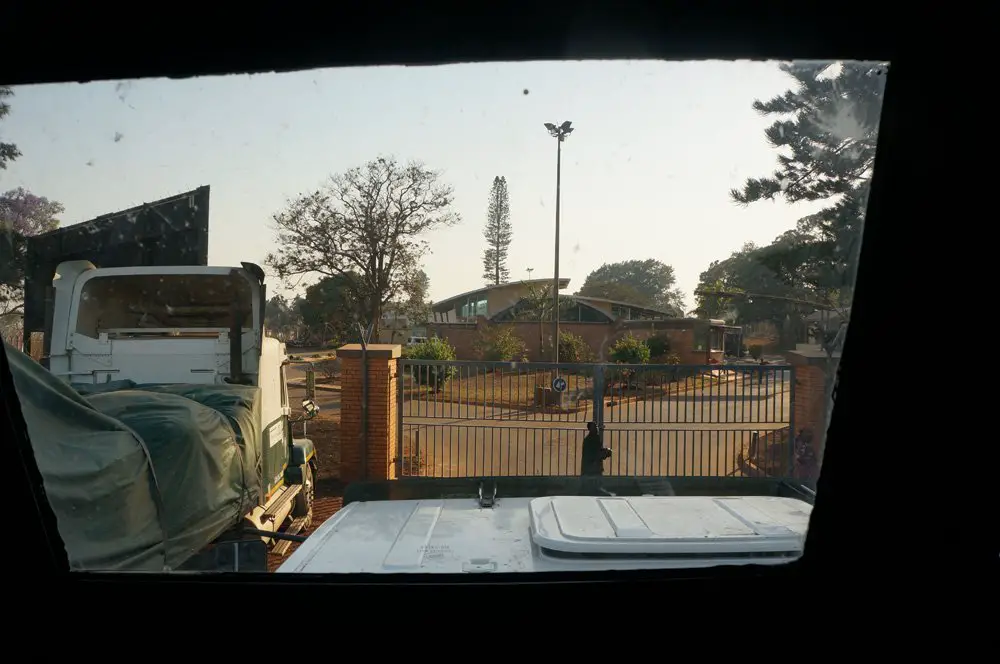
From Malawi
While traveling through the north, I met many travelers that overlanded via the Malawi/Mozambique border. This seemed a popular itinerary to spend a few nights in Lake Malawi and cross into Mozambique via the Mandimba border post , and travel by land through Cuamba to Ilha de Mozambique.
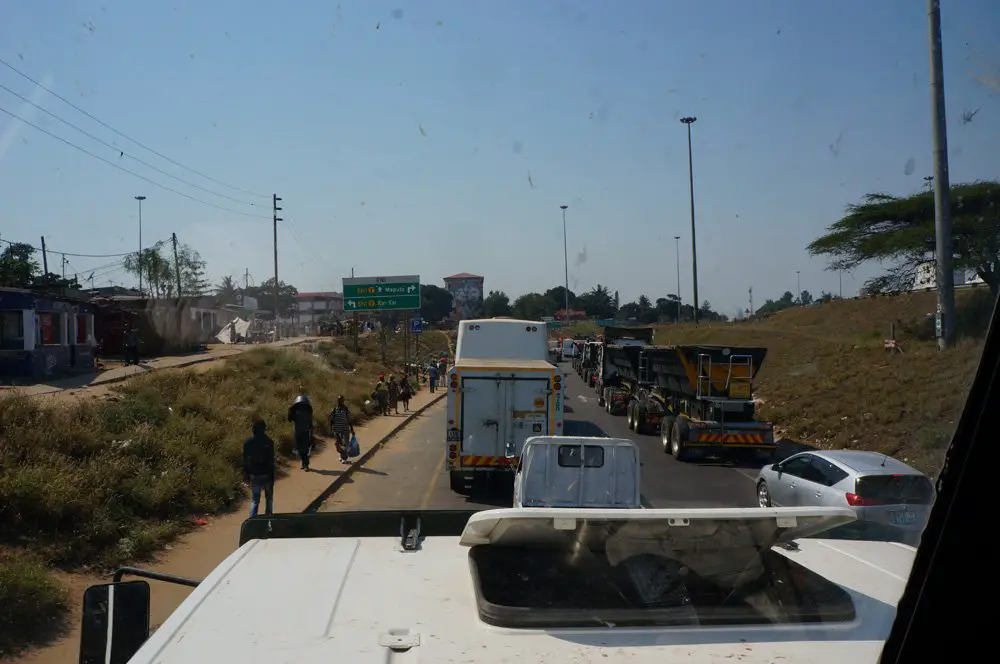
Air Travel in Mozambique
By air, South African flies direct from Johannesburg to most of Mozambique (Maputo, Inhambane/Tofo, Vilanculos, Pemba ). LAM airlines , Mozambique’s national airline also has flights, albeit expensive ones, throughout the country. Flying around Mozambique is not cheap, and one of the biggest complaints from talking to some expats living in Mozambique.
Flying around Africa in general is not cheap and Mozambique is no different. A flight from Maputo (the capital) to Pemba can easily be over $500 round trip. A flight from Johannesburg to Pemba via South African airways is over $800!
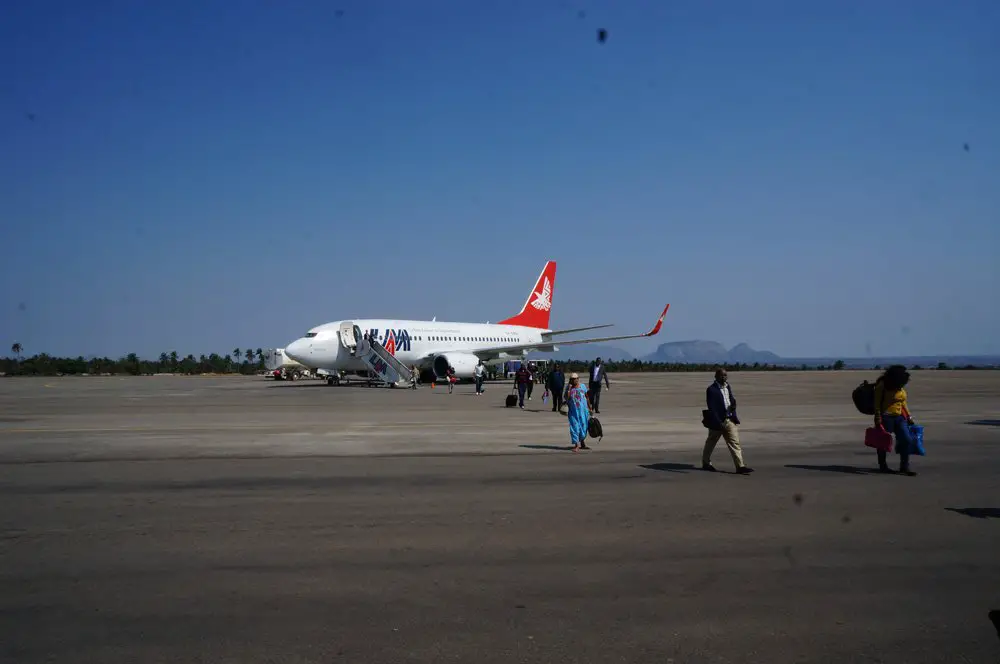
Getting the Mozambique Visa
This one is tricky. Prior to August 2014, visas could be bought upon arrival like all the surrounding countries. After Aug 2014 , visas MUST be obtained before arrival. Only a few surrounding African countries do not need visas.
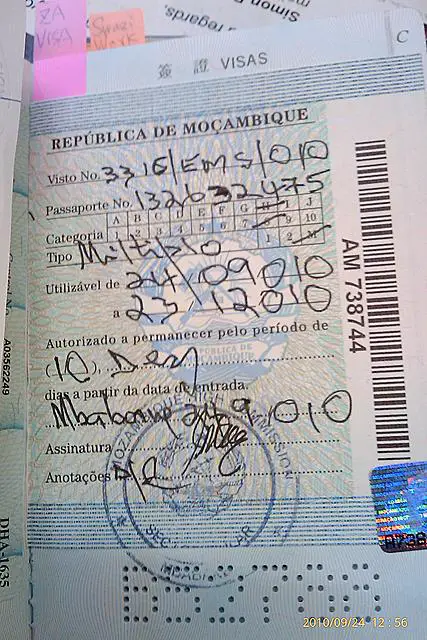
While it is a simple same day task if living in Johannesburg, this will likely be a painful process. Fear not however, after crossing the Swaziland/Mozambique border, there may be hope that visas can still be purchased at the border. While I already had my visa sorted out before hand, there were signs at the counters listing prices for Mozambican visas in dollars, rands, pounds, and euros. I’m not sure if they were just too lazy to update their policy, or if they still sold visas at the border.
Update 2019: As of 2019, Mozambique allows all visitors to obtain visas on arrival. This includes the major airports (Maputo, Vilanculos, Pemba, Inhambane) as well as the main land borders between South Africa and Swaziland.
Transportation and Getting Around in Mozambique
Mozambique is a large country, and overlanding will take some serious time. Driving is only recommended through the southern region and even then, there are some hectic stories of police corruption. Nothing dangerous per se but let’s just say that bribes are as common as seeing a beautiful beach in this country.
Driving from South Africa
Driving from South Africa into Mozambique is very popular. Car rental agencies in South Africa are familiar with the protocols and you’ll need a letter to carry with you to the border crossing. Most car rental agencies provide this for R500 or so. Mozambique also has requirements for cars entering the country but if you tell your car rental agency in South Africa beforehand, they should have all the necessities (although I’ve never been checked for this), including:
- two warning triangles
- one reflective vest (it’s better to have two to avoid long arguments with police)
- a belt holding down the battery
- Yellow triangle on blue background stickers on front of car and back of trailer if towing
You will also need to buy third party insurance in Mozambique, even if you have insurance from South Africa, or from a credit card. Doesn’t matter. Don’t buy it from any sketch people, just stick to the official people at the border post.
Chappas are how the locals get around. These questionable minivans are all over the country. It’s possible to take a chappa from Maputo all the way to Pemba if one had loads of time and patience. Like public vans in other African countries, chappas will only depart when they’re full. It’s also one of the cheapest ways to get around Mozambique.
For example, a chappa from Nampula to Ilha De Mozambique (200km) is about 300 mets I took a few and am pleasantly surprised at how efficient and quick these guys are. Aside from a few very curious stares, I had a great time riding these. The one or two people that could speak English made for great conversation!

Hitch-hiking through Mozambique
You may read this and think I’m a madman hitch-hiking by myself through a developing nation like Mozambique. I’m not saying it’s the safest way to go about things, especially for a lone female traveler, but the few times I did hitch-hike around this country, I had a great experience, and got to where I needed to go much quicker. Hitch-hiking is common among Mozambique backpackers, and likely more convenient than waiting around for a chappa to fill up.
Semi-trucks will frequently pick up hitch-hikers, and the unspoken payment is 1-2 mts per km. Truck drivers are already driving from point a to point b so if your destination is point b, then they’re just making an extra buck by picking you up. Win-win for all parties!
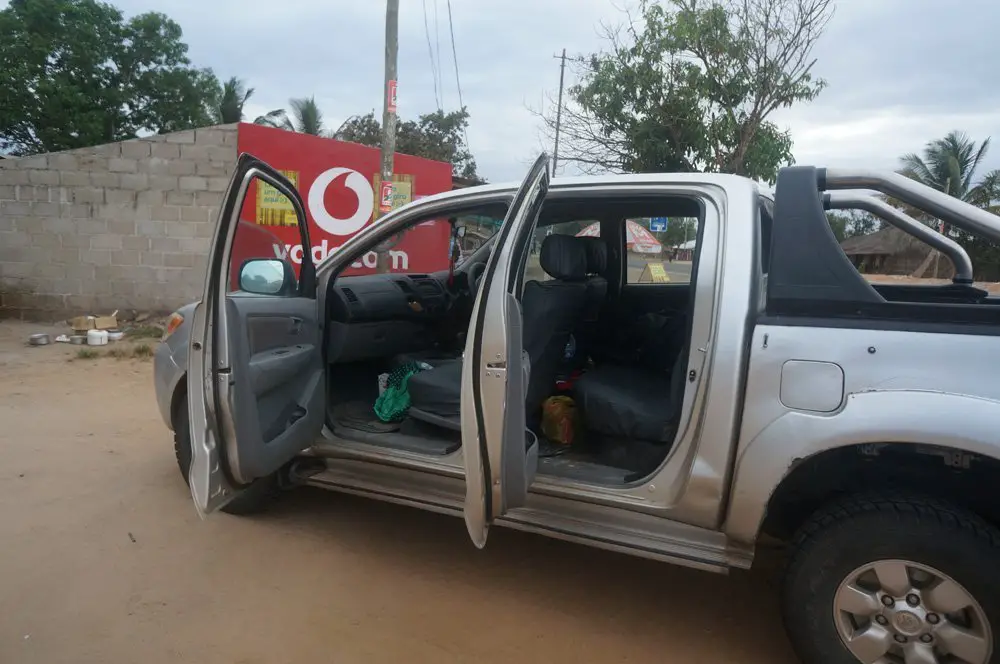
Tourism in Mozambique
Mozambique can be divided into three parts:
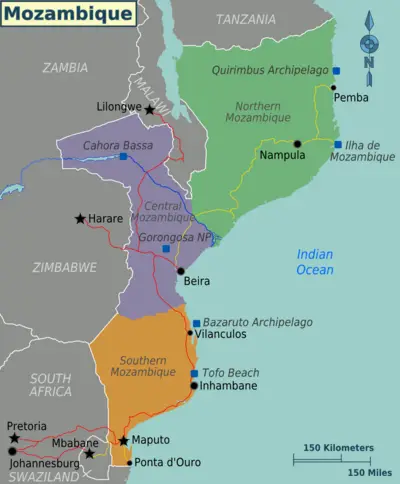
South Mozambique
Can also be referred to as South Africa’s Mozambique, the areas from Ponta D’ouro at the very south to Vilanculos (Bazaruto Archipelago) is prime South African getaway spots. Beaches here are more like the beaches along the Garden route and Durban. Maputo, the nation’s capital is in the very south, bordering South Africa.
There isn’t much to see in the middle besides the Gorongosa National Park (didn’t visit this one). This national park from what I’ve heard, used to be one of the most beautiful nature reserves in Africa, teeming with endless wildlife. During Mozambique’s civil war however, nothing in the country was spared and most of the animals in this park were killed off. Beira is a large port town that was once a popular destination for wealthy Zimbabweans (before that country went to shit). Anyone looking to overland through the entire country will likely pass through this town.
North Mozambique
Ilha De Mozambique, Pemba, and the Quirimbas Archipelago occupy the north. This part of the country was one of the least developed places I saw in Africa (with the exception of Pemba which is quickly becoming a big city due to natural gas discovery). The Quirimbas Archipelago has perhaps some of the most stunning and certainly the nicest beaches I’ve ever seen. It’s completely untouched and those that invest the time to get there will be substantially rewarded.
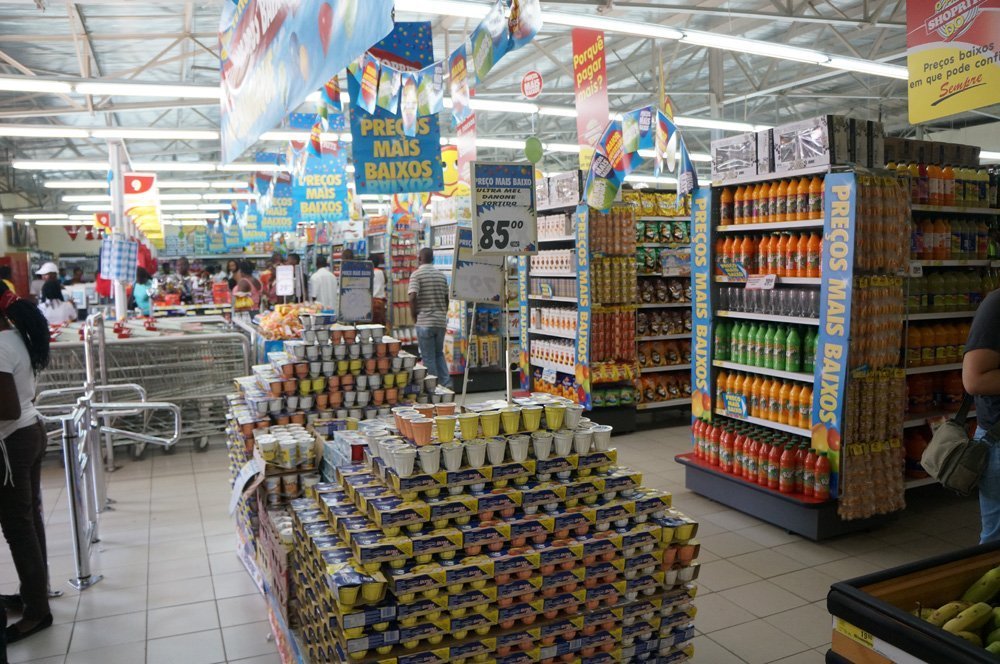
Comparing the Regions of Mozambique
Mozambique is a huge country. The coastline spans 2,500km and there are over 40 languages spoken in the country.
From my time spent in Moz, there is a stark contrast between the north and south. Tourism is far more developed in the south with places like Ponta do Ouro and Tofo being huge South Africa getaways. There are hundreds of hotels, backpackers, lodges in Tofo and it has that mass tourism beach getaway feel. While I never visited Ponta Do Ouro in the very south of Mozambique, many of my South African friends either have homes here or visit frequently.
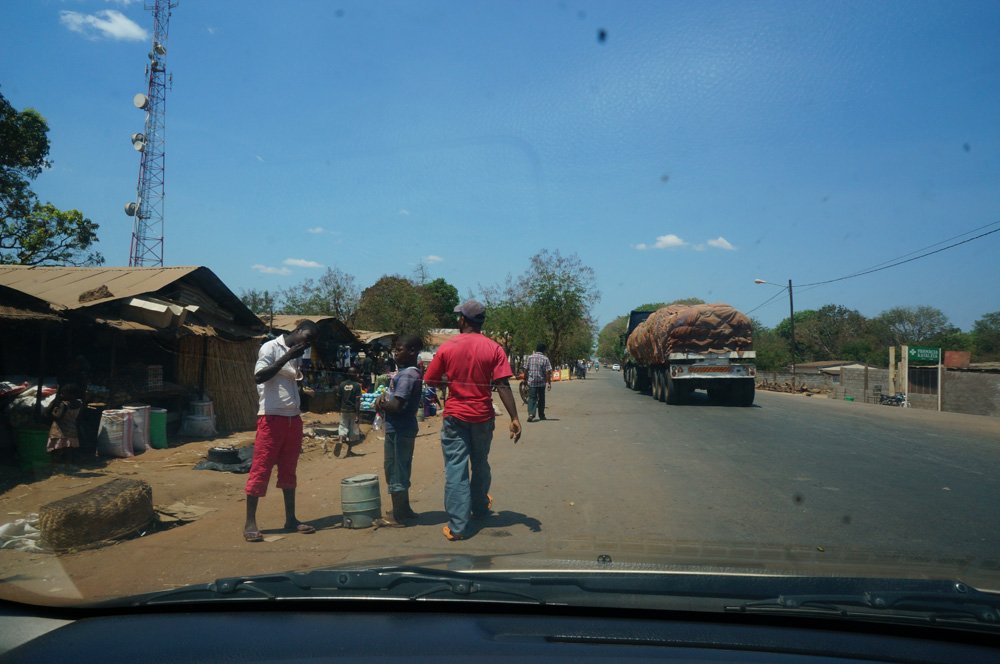
Vilanculos and the Bazaruto is still prime South African tourism territory with a few backpacker lodges in Vilanculos. The Bazaruto is a premium luxury location with some incredibly expensive private islands with private hotels. Places like Azura, Indigo Bay Lodge, and plenty others can easily run you over $1000 a night.
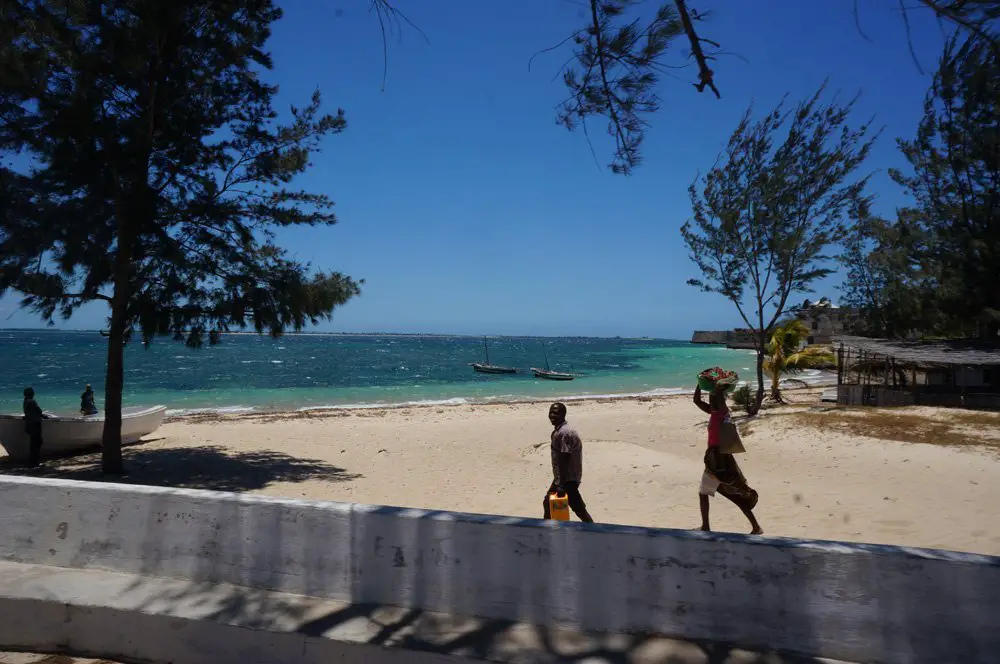
Northern Mozambique
Nevertheless, visiting Ilha De Mozambique, the former colonial capital of Mozambique is a magical and hauntingly beautiful place. The beaches of the Quirimbas are the nicest beaches I’ve ever seen, besting the Bazaruto in my opinion. The Quirimbas are also home to ultra luxury lodges like the Vamizi, Quilalea, and Medjumbe which will easily run over $1000 a night. Fortunately for the wandering traveler, camping is allowed on these islands making a dhow safari possible!
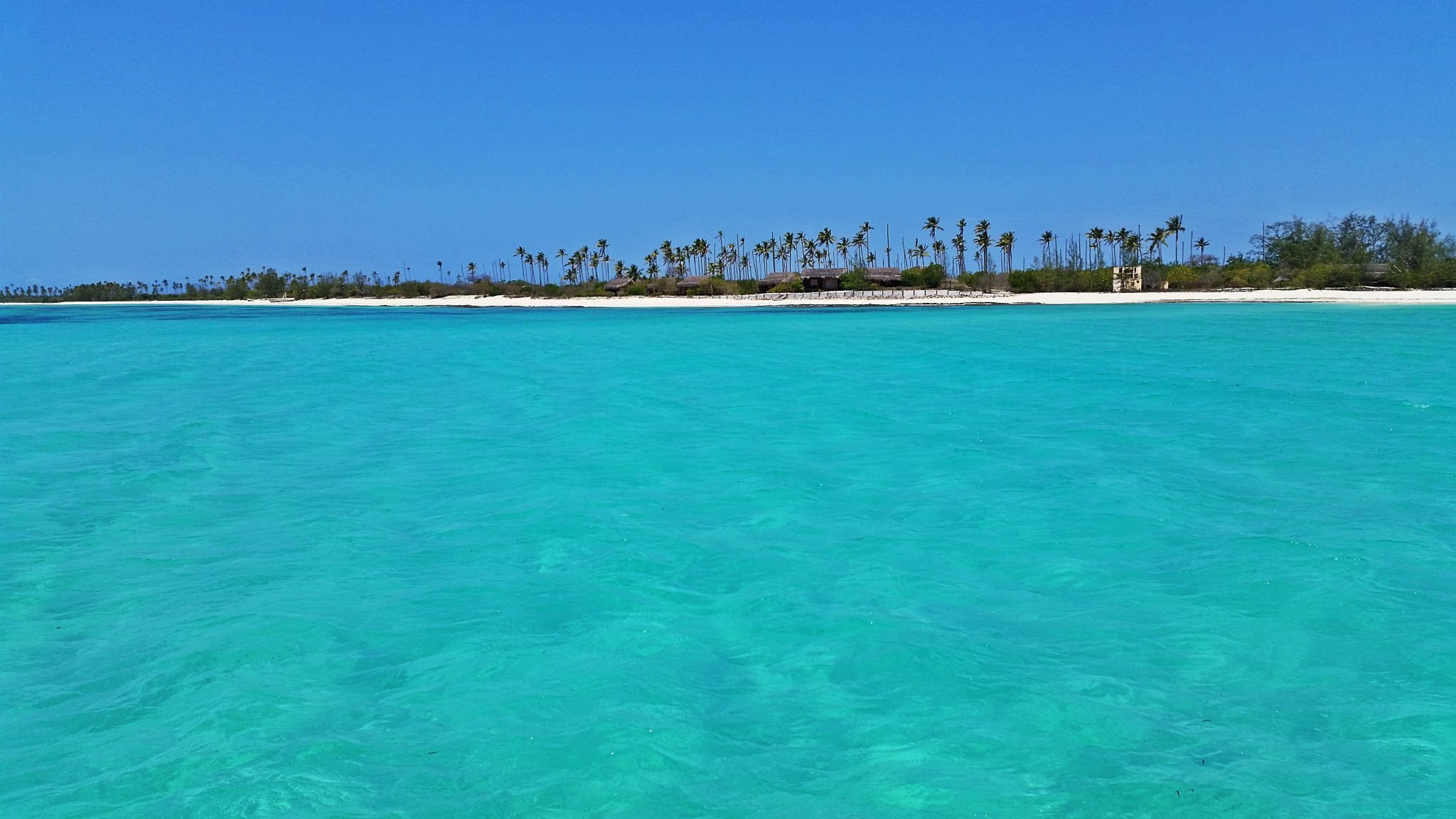
The north of Mozambique might as well be another country compared to the South. The landscape and languages are different to the South and it’s immediately visible how much less developed the North is. Nevertheless, this part is a special place to visit, easily one of my favorite places in all of Africa. Tourism is sparse in these parts but sadly, I feel like it will become much more commercialized in the next five years after huge natural gas reserves were discovered in Pemba.
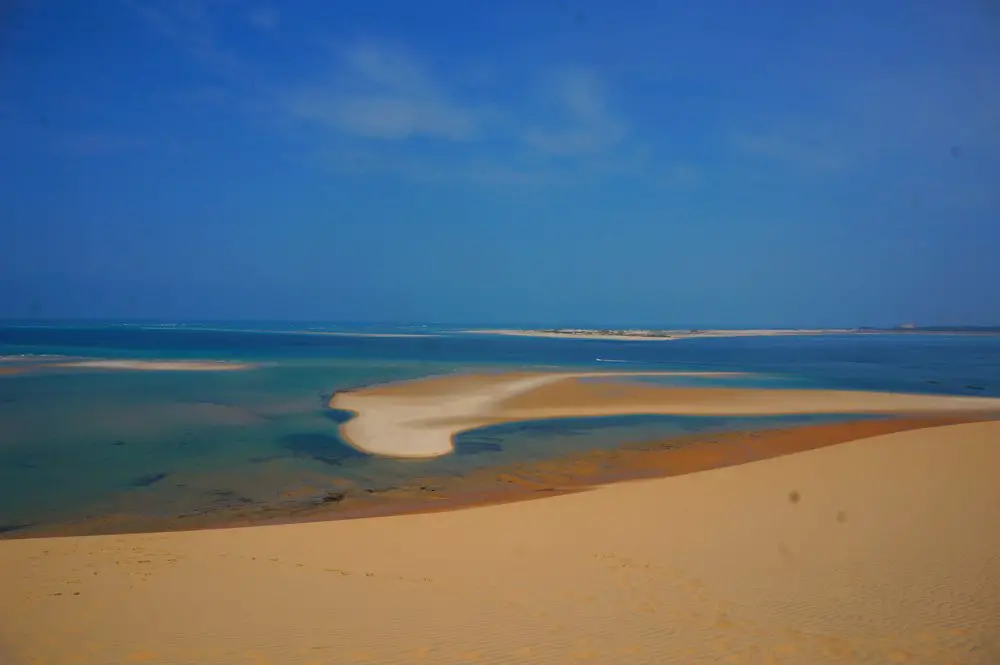
Overall, Mozambique is a different type of getaway to its neighbors. It is less developed, less infrastructure and English is rarely spoken outside of the touristy areas.
As Mozambique was a Portuguese colony, the official language is Portuguese. However, like every other African nation, only a small percentage speak the former colonial language, usually concentrated around the urban areas and the more educated. Many local languages are spoken throughout the country. English is spoken primarily in tourist areas and is more prevalent in the south due to the South African tourists.
Knowing some Portuguese will be extremely helpful here. I made sure to download the offline Portuguese package for my Google Translate app and as of 2015, Google Translate also allows you to speak into the phone translating it in real time. Huge life saver for Mozambique.
Money in Mozambique
Mozambique is a cheap country to travel around but is getting more expensive, especially in the north. With the discovery of gas in Pemba, prices in the north have skyrocketed, and this will inevitably trickle down through the rest of the country. Nevertheless, prices will still feel cheap, especially for things like beer and seafood.

The official currency in Mozambique is the Mozambican Metical (also called Mets, Meticais, Meticash). When I visited in Oct 2014, it was 30 mts to $1, and is at 60 mts to $1 in 2018. South African rand is readily accepted in the south, primarily in the popular South African spots like Tofo and Ponta Do Ouro. In fact, I know in Ponta, rands are preferred to Meticals.
US Dollars are accepted at most high end tourist hotels and easily exchanged at banks, although the best exchange rates are still via ATMs. ATMs are widely available throughout the urban centers of Mozambique.
Credit cards are accepted sparsely, primarily in Maputo, and high end tourist spots. If a vendor accepts credit card, they will likely charge a fee of a few percent. If you’re a backpacker, I’d visit Mozambique with a no credit card mindset, cash is king here!
Food in Mozambique
Having traveled through much of Africa, most culinary options are so bland (with the exception of South Africa of course). Mozambique, thankfully, is blessed with a coast full of delicious seafood. The Portuguese also left behind many of its culinary traditions, especially the use of peri-peri sauce, a spicy delicious sauce that goes good with everything. Pair this with their deliciously cheap seafood, and life is good.

Mozambique is famous for its giant tiger prawns that can grow up to 1ft long! Along with lobsters, calamari, octopus, and many fish, the seafood options are endless here. While in Tofo, I would regularly visit the beach where guys were ready to sell me lobsters or prawns and bargain the shit out of them. Eventually, I’d get the price of prawns down to 200mts ($6) for a kilo of giant prawns which is just ridiculous. I would then tell the chef at the hotel’s restaurant to grill it with some peri peri sauce, give him a buck or two, and be in food coma heaven.
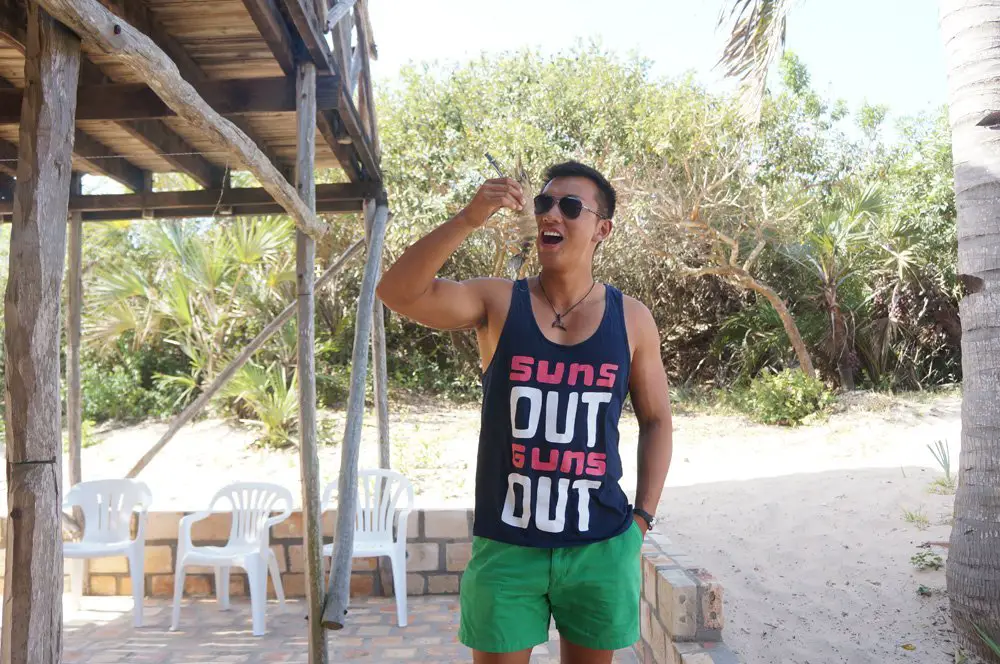
When to Visit
Mozambique enjoys a beautiful coastline of 2,500 km and is beautiful year round. Nevertheless, he heavy rains come between December to April and travel during this period may be difficult. May to October are considered the best months to visit. Temperatures in the north are generally warmer than the south. Maputo in the deep south can reach freezing temperatures in the winter months!
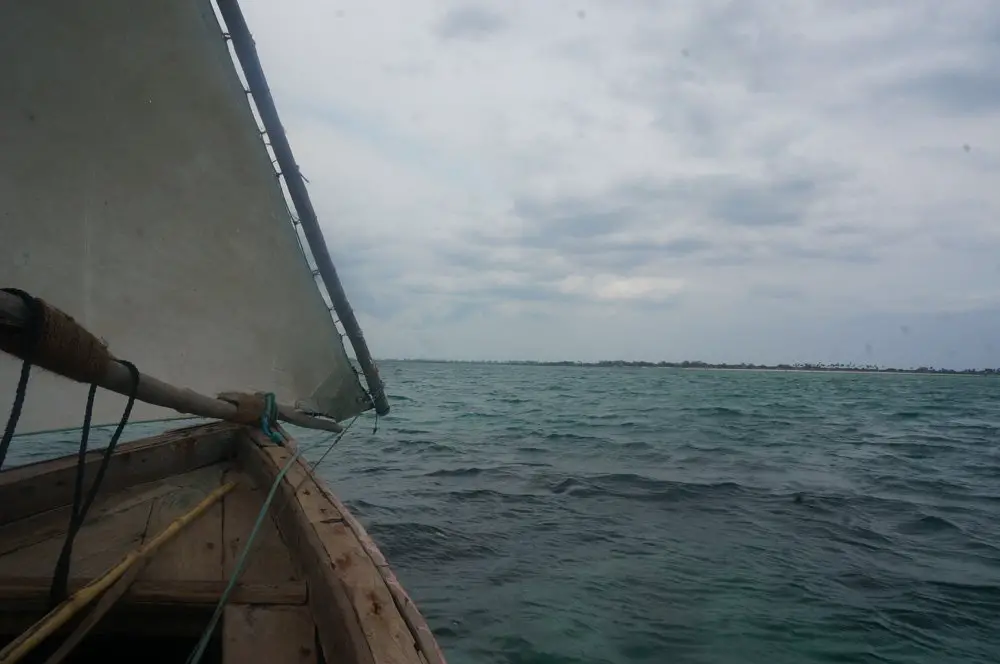
I went in October and this was approaching the rainy season but temperatures and climate were starting to become volatile. It was wildly inconsistent in Tofo, with winds constantly being the cause of cancellation for our dive trips. Vilanculos and the Bazaruto were mostly sunny but the mornings would always see clouds. Northern Mozambique seems to follow a more sub-tropical/tropical climate and it was sunny during my entire visit.
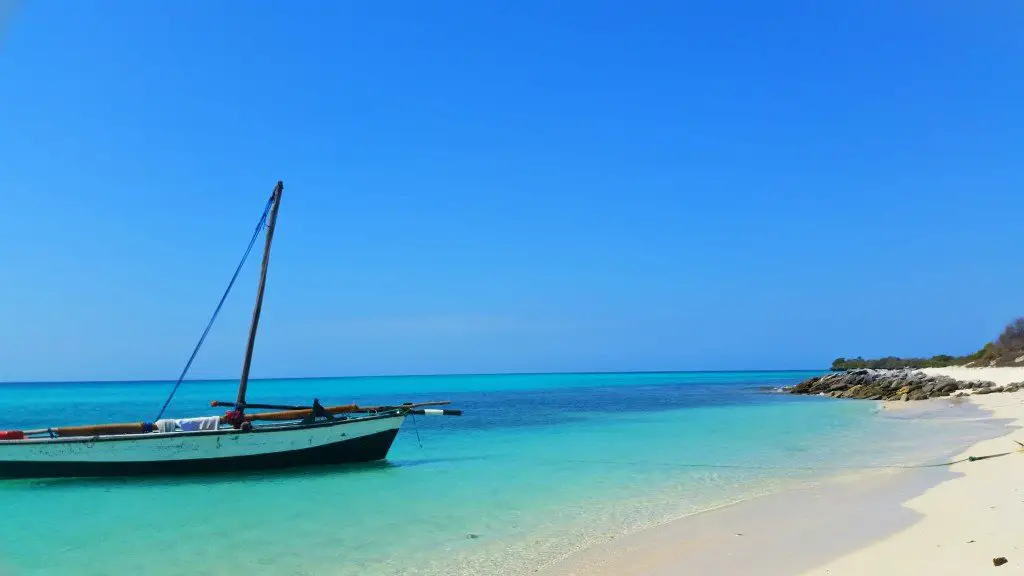
My Mozambique Travel Itinerary
And finally, my four week itinerary for Mozambique. I did the southern part with a Nomad overland tour, stopping in Tofo and the Bazaruto. Initially, I was planning on overlanding from Vilanculos to Nampula in the north (On the map it would be from point C to point G) but after talking to other travelers, this ride would have been long and extremely boring so I winged it and bought a last minute flight from Maputo to Nampula, before winging most of my northern Mozambique circuit.
Read my detailed Mozambique itinerary that follows the route below!
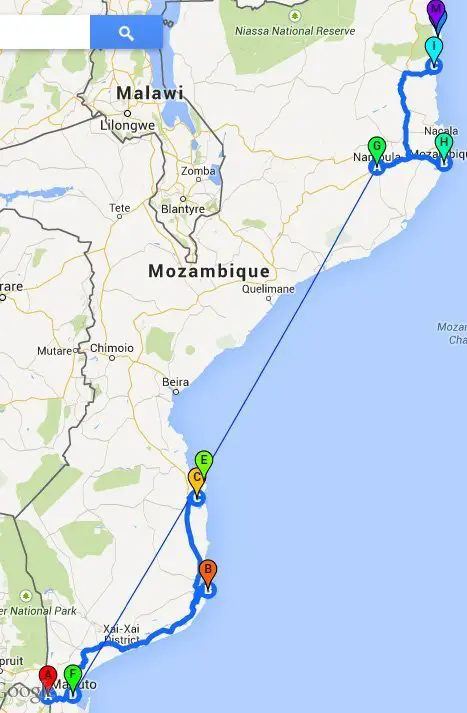
Continue Reading:
- The Best Gyms And Fitness Clubs In Athens, Greece
- The Perfect Travel Itinerary For Mozambique
- Why I Love Living in Singapore: Expat Life In The Lion City
- The Ultimate Pemba Island Travel And Diving Guide
- The Best Of Johnny Africa – Top Moments Traveling Through Africa
The Perfect Fiji Honeymoon Itinerary: One To Two Weeks
The perfect fiji travel itinerary: beaches, diving, and island paradise.
- Island Hopping In The Yasawas: Fiji’s True Island Paradise
- Diving the Rainbow Reef And Great White Wall in Taveuni, Fiji
- Ultimate Guide To Diving With Sharks In Fiji – Beqa Lagoon and Barefoot Koata
- The Perfect South Africa Honeymoon Itinerary And Guide
- Ultimate Guide To Traveling The Quirimbas Archipelago, Mozambique
- The Perfect One Week, Two Week, and Three Week Travel Itinerary For South Africa
- Aiyana Hotel Review: Pure Luxury In Pemba Island
Related Posts
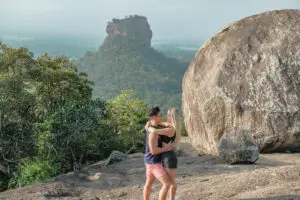
The Perfect Sri Lanka Travel Itinerary: One Week, 10 days, and Two Weeks
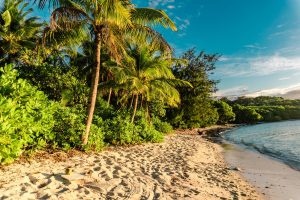
The Perfect Vietnam Travel Itinerary: One Week, Two Weeks, and Three Weeks
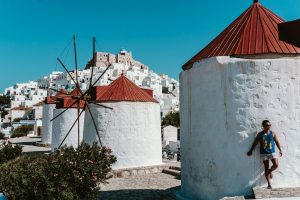
The Perfect Two Week Travel Itinerary For Greece
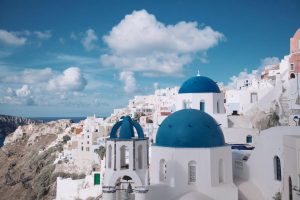
The Perfect One Week Itinerary For Greece
Leave a reply cancel reply.
Your email address will not be published. Required fields are marked *
Yes, add me to your mailing list
Add Comment *
Save my name, email, and website in this browser for the next time I comment.
Notify me of followup comments via e-mail. You can also subscribe without commenting.
Post Comment
Hi Johnny, Great blog. I have just made an interview with a bloke who walked 800 kms across Mozambique following the Zambezi river. Pretty crazy huh? https://wanderowl.com/trekking-zambezi-through-mozambique-interview-with-alasdair-campbell/
Hi Johnny, you didnt tell anything about the beaches directly on Ibo island? Are they fine to swim, hang up there and relax? If the other islands have them, I guess Ibo too? Saw also on your pics, there is beach on Ilha Mozambique in town? Do you think, as a solo female, 56, traveller I will be surrounded by local man on the beach? I am used to not so touristic areas as a backpacking woman, but guess f.e. in Ibo, beachboys have not yet began… I speak Portuguese…. Now I will read about Maledives, even I already worked there for half a year ????. Regards from Austria!
Hi Sylvia! The beaches around Ibo are not that great from what I saw. It’s really about getting to the other islands nearby that were breathtaking. As for ilha, I didn’t really get the feel of creepy local dudes harassing tourists like other places I’ve been to. Ilha doesn’t see many tourists so perhaps this is why or I’m just a guy and don’t notice it as much. I think you will be okay though!
Hi Johnny, thanks 4 the fast replay, nice. Hm, but 1 night out with a Dhow doesnt make sence 4 all the costs and the way…I m mostly out around 8 weeks and want to be longer on nice beach destinations, from one to the next… from Vilanculos there s already a girls blog about harassing beach boys, uff….and I cant go to the expensive islands, but thanks.
Hi Sylvia, you can stay out on Matemo for much longer if you want. I only stayed for 1 night because I didn’t have enough time, otherwise I would have loved to stay for longer. Sadly, affordable acommodations on the nicest of islands are not available.
Hi, thank you very much for your blog about Mozambique! I want to visit north of Mozambique at summer this year and also spend few days just relaxing and snorkeling. Do you think at Quirimbas is nice snorkeling (apart from ultra-luxury private islands) or this area is better for diving? Unfortunatelly I don’t dive. Thanks a lot.
Hi honza, I think you will find great snorkeling in the quirimbas as well as diving. However, I don’t recall any places on Ibo Island where you could just go out and snorkel from shore. You may need to go on a snorkeling trip to nearby reefs. Enjoy your trip there!!
Hi Johnny, thank you so much for your article. I wanted to do my Divemaster in Tofo for so long because of all the Megafauna. But wasnt sure because of usual cliches we Europeans have about Africa. Luckily, in the end I decided to go nevertherless, and ended up staying 6 months in Tofo! I worked as a DM after my Training was finished and couldnt have been more in love with the place. I reckon that Mozambique will get more touristier in the next few years with so many beautiful beaches and wildlife. x
Thanks Anja! Glad you enjoyed the read. Where did you do your DMT? I have been diving in Tofo and think I went too late in the season for any of the good things (Mid Oct). How was the diving while you were there??
I did it with Peri Peri Divers in Tofo. I dived 5 months Feb – June and saw it all: Whale sharks, giant and reef mantas, dolphins and humpback whales. There is no real colourful reef but the megafauna was sincerly breathtaking!
That’s amazing! I need to go back during those months it seems. Diving with a humpback would be the ultimate experience! Have yet to see a manta birostris too. I think the diving further north in the Quirimbas had extremely colorful corals but not much mega fauna.
nice Blog, I will check again your next post. I got a lot of information from your post. your are a good Blogger. I am Waiting to read your next Blog. Thank You.
Hey Johnny, I’m headed to Moz in January and I’ll be traveling solo. This will be my second trip; the first time I stuck around Maputo, so I want to see more of the country. I’m trying to decide between Vilanculos/Bazaruto Islands and Pemba/Quirimbas Islands. I feel like Vilanculos and the Bazurutos would be easier, but your post and photos of the Quirimbas have me absolutely intrigued. Due to the secluded nature of the place and lack of tourist infrastructure, I’m wondering how safe and costly this trip would be for a solo female. I’ll have 5-7 days to explore. What are your thoughts? Any tips for either?
Hi T. Michelle! I still have dreams about my time in the Quirimbas. It’s still one of the best travel experiences I can recall. It doesn’t look like it’s changed that much either as there is still little to no information when I look at Ibo tripadvisor. I think 5-7 days is likely to see the Quirimbas. It won’t be cheap because you’ll want to catch the private planes from Pemba to Ibo, otherwise taking the local transport to Ibo will shave off 1 day each way.
I was not as big of a fan of vilankulos but that’s perhaps I didn’t spend enough time there.
Also, January is the rainy season so keep that in mind as you may see hectic weather sometimes! Have a great trip though!
Yes, it’s difficult to find info about travel to the Quirimbas. That’s actually how I found your blog and it’s the most informative site out there! A couple more questions for you. Where can I find info about schedule and cost for the private planes to/from Ibo? I know you were lucky and were able to share with folks you’d previously met, but for others do they book once they arrive in Ibo or is there a website or contact to reserve in advance? Also, how far are the closest islands from Ibo? Are the waters very rough? Thanks!
So I rocked up to Ibo with really no plans. I stayed at the Miti Miwiri and met a group of travelers there that also had likeminded plans. In the end, it was great. You can try contacting them in advance but there aren’t many tourists in Ibo so these types of things are not running on any schedule. The waters are not rough and as you’ve seen from pics, everything is absolutely beautiful.
As for flights, I actually booked my flight at the airport (although I can’t recommend that because you never know what might happen). I would recommend contacting whichever guesthouse you decide to stay with and they will know the most up to date info on flights, as there are not many companies that make the flight.
Hey Johnny, loving your blog 🙂 We are thinking of going end of March/beginning April for just over a week, and wonder where you’d recommend divewise? It’s probably once in a lifetime sort of trip and we’ve been recommended Quirimbas but would we be missing out on the bigger stuff? We also wonder about Tanzania (Mafia was also mentioned) or other parts of Mozambique (Tofo (which is supposed to be hit n miss with whale sharks), and Bazruto (mixed reviews))? Also we read about difficult boat launches in some areas, which might not suit one of us.There’s also a possibility for one of us to extend with a safari type trip at the end/beginning. Thanks!
Hi Bridget, that sounds amazing! How long do you guys both have for your trips? For big stuff, Tofo is probably your better bet to see whale sharks and Mantas (although I’m not sure how the diving is during mar/apr). I only had three dives in the Quirimbas, off of Ibo Island but I must say that the soft corals there were some of the best I’ve ever seen. Not to mention that the Quirimbas as a whole is a very special place with likely the nicest beaches you’ll ever see. The only place that does diving that I could find is Ibo Island Lodge so make sure to contact them before hand to make sure they can accommodate you. I heard Bazaruto is only so so.
I did diving off of Zanzibar and that was pretty good as well. I have never been to Mafia but have heard great things. The good thing about Zanzibar area would be how easy it is to do a safari in the Serengeti before/afterwards would be.
Hey Johnny. We have at most 9 days including arrival/departure days for the diving bit. (Safari bit is more flexible and only one of us). So Mozambique I guess is famous for the big stuff like mantas and whale sharks? However, we’re probably not so able to do the tough beach launches so that might be out. It also might be rainy around March, so the vis would be down I suppose. Alternatively can you recommend other destinations? Perhaps Mozambique isn’t as great at that time of year as we hoped. We’ve dived around alot of Asia and some parts of Indian Ocean so warm water would be better and I’d say marine life is pretty important! Thanks 🙂
Ah yes, I do remember Tofo being quite rough. I went in Oct so Mar might be pretty similar. They were all boat launches and the waves could get quite hectic. I foudn the diving in the Quirimbas to be much better in terms of scenery. There aren’t much big things there but the corals and fish were out of this world. It is on par with SE Asia diving in my opinion (although perhaps not to the same level as Sipadan and Komodo). The visibility was also quite good and waters warm. If you’re set on doing Mozambique, I would recommend a visit to the northern part :). However, make sure that Ibo Lodge is still offering diving (and it’s not cheap unfortunately). Otherwise, stick to the Tanzanian islands as they are much more developed and have more variety with their dive shops.
I love Mozambique but trust me….If you want to travel here I recommend you visit: http://www.gobundu.com/ …these guys are Mozambique EXPERTS! The advantages of a trusted agent that knows Mozambique and how to travel there are priceless!
hi, im in my late 40s, male, single – just want the latest news of how to travel backpacking to maputo and surroundings. Any tips advise? I just wanna be away for a bitfrom jhb, but meet nice new companions with the same objective. Live and enjoy. Say from the 6 july onwards. Any small groups going that way whereby i could join in? I dont have trnsport, so bus, taxi, chappa etc advise for me? Cont numbers of anyone/group with same intention?
Did you ever travel to Mozambique? If so, did you end up going with overland tours or solo??

- Skip to main content
- Skip to "About this site"
Language selection
Search travel.gc.ca.
Help us to improve our website. Take our survey !
COVID-19: travel health notice for all travellers
Mozambique travel advice
Latest updates: The Health section was updated - travel health information (Public Health Agency of Canada)
Last updated: April 17, 2024 12:07 ET
On this page
Safety and security, entry and exit requirements, laws and culture, natural disasters and climate, mozambique - exercise a high degree of caution.
Exercise a high degree of caution in Mozambique due to crime, kidnapping and terrorism.
Some districts of Cabo Delgado province - Avoid all travel
- Chiúre
- Mocímboa da Praia
Rest of Cabo Delgado Province - Avoid non-essential travel
Avoid non-essential travel to the rest of Cabo Delgado province due to the risk that the insurgency expands to these areas. This includes Pemba City, which could be considered a target by militants.
Parts of Nampula Province - Avoid non-essential travel
Back to top
Cabo Delgado province
Militants continue to be active in several northern districts of Cabo Delgado. Violent clashes between militants and security forces occur frequently. Staged attacks against populated areas have targeted both security forces and civilians. Militants have burned villages, raided police stations, and conducted roadside ambushes and attacks with machetes and firearms against residents. This has resulted in hundreds of casualties and more than one million displaced persons.
There is a continued threat of kidnapping and criminal activity, such as contraband smuggling and illegal mining, in the entire province.
The Government of Canada’s ability to provide consular assistance to Canadians in Cabo Delgado Province is extremely limited.
Expect a heightened security presence in Cabo Delgado, especially in the northern and central districts.
Nampula Province – Erati and Memba districts
Militants have committed attacks in the Erati and Memba districts in the Nampula province.
While there have been no reports of recent clashes, the situation remains unpredictable.
Sofala Province
The security situation has improved significantly since the peace agreement signed between local political parties in August 2019 and the closure of the last military base in Gorongosa in 2023.
The district elections scheduled for 2024 could still lead to civil unrest.
Border with South Africa
Increased traffic along the highway leading to and from the land border with South Africa has led to:
- frequent traffic congestion
- border crossing delays
- an increase in road accidents, robberies, theft and assaults targeting truck drivers and travellers.
If you cross at this land border:
- expect long line-ups and delays
- plan your trip accordingly
- keep your windows and doors locked at all times
Petty crime
Petty crime, such as pickpocketing, muggings and purse snatching, occurs regularly in Mozambique, especially in Maputo. Travellers have been targeted at all hours of the day. Criminals will especially target individuals walking alone at night with bags, purses or visible items of value such as cell phones.
Theft of vehicle parts is frequent, especially around the holiday season, and occurs in these locations:
- shopping centers
- transportation hubs
During your trip:
- ensure that your personal belongings, including your passport and other travel documents, are secure at all times
- avoid showing signs of affluence or wearing expensive jewellery
- avoid leaving valuables in cars
- park your car in a secure area
- avoid walking alone in isolated areas, especially at night, even in well-known tourist areas
- stay in reputable hotels with good security measures
Violent crime
Violent crime, such as armed robbery and home burglary, occurs in and around large cities such as:
- Maputo/Matola
- avoid travelling alone, especially at night
- keep your doors and windows locked at all times
- if threatened by robbers, don’t resist
Tourists are usually not targeted, however you could be at the wrong place at the wrong time.
There is a threat of terrorism, particularly in certain parts of the Cabo Delgado and Nampula provinces where insurgent militants continue to operate and commit attacks. Militants are especially active in the central and northern districts of Mocimboa de Praia, Macomia, Muidumbe and Palma.
Further attacks are likely.
Targets could include:
- vehicle convoys travelling between towns
- pedestrians and civilian residences in rural villages
- government buildings, including schools
- places of worship
- airports and other transportation hubs and networks
- public areas such as tourist attractions, restaurants, bars, coffee shops, shopping centres, markets, hotels and other sites frequented by foreigners
Always be aware of your surroundings when in public places.
Kidnapping for ransom occurs in larger cities such as Maputo City, Matola and Beira.
While most victims are locals perceived as wealthy, foreigners have been targeted. Kidnappers frequently operate during the day.
Kidnappings also occur regularly in Cabo Delgado province. Foreign nationals and workers have been targeted. Further incidents are likely.
- Be aware of your surroundings at all times
- Change your travel patterns regularly
- Avoid showing signs of affluence
- If threatened by kidnappers, do not resist
Credit card and ATM fraud occurs including incidents of card cloning. When using your debit or credit cards:
- pay careful attention when your cards are being handled by others when making payments
- use ATMs located in well-lit public areas or inside a bank or business
- avoid using card readers with an irregular or unusual feature
- cover the keypad with one hand when entering your PIN
- check for any unauthorized transactions on your account statements
Overseas fraud
Cybersecurity
Cybercrime, malware attacks and online extortion may occur in Mozambique.
Cybercriminals can compromise public Wi-Fi networks to steal personal data or credit information.
They can also monitor social media and listen to your phone conversations.
- Avoid shopping on unencrypted websites
- Be cautious when posting information on social media
- Be especially cautious if you decide to meet someone you met online
- Be wary of unsolicited emails offering attractive business opportunities
- Don't click on suspicious links that ask for your banking information in an e-mail or text message
Demonstrations
Demonstrations occasionally occur, however a demonstration permit is required. Even peaceful demonstrations can turn violent at any time. In some instances, security forces have used tear gas and rubber bullets to disperse crowds. Demonstrations can also lead to significant disruptions to traffic and public transportation.
- Avoid areas where demonstrations and large gatherings are taking place
- Follow the instructions of local authorities
- Monitor local media for information on ongoing demonstrations
Mass gatherings (large-scale events)
Women’s safety
Women travelling alone may be subject to some forms of harassment and verbal abuse.
Advice for women travellers
Road safety
Road safety varies considerably across the country. Fatal accidents are common, and they often involve pedestrians. Fuel stations are rare in rural areas and police assistance can be unreliable.
Road conditions
Road conditions can vary greatly throughout the country. The streets are paved in Maputo and major cities but are usually crowded and narrow. Highways in the south and west of the country are generally well maintained but can be affected by seasonal weather conditions.
Driving conditions may be hazardous during the rainy season from December to April, and sometimes near-zero visibility poses a threat. You may need a four-wheel-drive vehicle to travel outside cities and off major highways.
Driving outside major cities can also be dangerous due to:
- lack of guardrails
- inadequate or non-existing street lighting
- lack of signage
- pedestrians walking on main roads
- stray livestock
Driving habits
Drivers often don’t respect traffic laws. They often drive at excessive speeds and have little consideration for pedestrians and other drivers’ right of way. Drinking and driving may occur at any time of the day or night.
After a car accident, a large crowd may gather at the scene of the incident and become hostile. If this happens, get away from the scene and go to the nearest police station.
On the road in Mozambique:
- keep doors locked and windows closed at all times
- don’t expect drivers to look out for pedestrians
- avoid travelling after dark, especially outside of major urban areas
- carry a cellphone and a charger with you
- maintain a full tank of gas
- keep a supply of water and non-perishable snacks
Checkpoints
Police checkpoints are common throughout the country. Only national police officers have the authority to establish checkpoints.
Traffic law enforcement consists of stationary traffic police officers on foot. They randomly stop vehicles for inspections or identification. Failure to produce identification documents can result in a large fine.
- Be prepared to present copies of your identification documents
- Don’t challenge the authority of requesting officials
There are reports of widespread corruption among the police ranks. Police officers sometimes try to extort drivers and pedestrians by threatening detention or confiscating identity documents. If you don’t carry proper documentation, the police may attempt to bribe you. They may also ask for items or tips.
If police threaten you with a fine:
- remain calm and courteous but firm
- show original documents but keep them in your possession
- try to cooperate by following the instructions of the police to avoid escalation
- ask for a clear explanation of the offence and a written fine that can be paid at a police station
- don’t pay a bribe or tips to anyone
Fuel shortages occur occasionally.
- Never let your tank go lower than half-full
- Keep fuel supplies on hand
- Carefully plan all road travel
Public transportation
Public transportation is limited.
Privately owned minibuses, known as chapas, are often overcrowded and poorly maintained. They are frequently involved in fatal accidents.
Private intercity buses are available, especially to South African destinations. They are often better maintained and only operate on roads in good conditions.
Taxis are widely available.
If you use a taxi in Mozambique:
- avoid hailing it on the street
- only use registered taxis from reputable providers, preferably arranged through your hotel
- avoid yellow and green taxis, in which there are reports of thefts
- ensure that there is no other passenger in the car
Domestic rail service is overcrowded and slow.
Pirate attacks and armed robbery against ships occur in coastal waters of the Indian Ocean. Mariners should take appropriate precautions.
Live piracy report - International Maritime Bureau
We do not make assessments on the compliance of foreign domestic airlines with international safety standards.
Information about foreign domestic airlines
Every country or territory decides who can enter or exit through its borders. The Government of Canada cannot intervene on your behalf if you do not meet your destination’s entry or exit requirements.
We have obtained the information on this page from Mozambican authorities. It can, however, change at any time.
Verify this information with the Foreign Representatives in Canada .
Entry requirements vary depending on the type of passport you use for travel.
Before you travel, check with your transportation company about passport requirements. Its rules on passport validity may be more stringent than the country’s entry rules.
Regular Canadian passport
Your passport must be valid at least 6 months beyond the date you expect to leave Mozambique.
Passport for official travel
Different entry rules may apply.
Official travel
Passport with “X” gender identifier
While the Government of Canada issues passports with an “X” gender identifier, it cannot guarantee your entry or transit through other countries. You might face entry restrictions in countries that do not recognize the “X” gender identifier. Before you leave, check with the closest foreign representative for your destination.
Other travel documents
Different entry rules may apply when travelling with a temporary passport or an emergency travel document. Before you leave, check with the closest foreign representative for your destination.
Useful links
- Foreign Representatives in Canada
- Canadian passports
Tourist visa: not required for stays up to 90 days per year Business visa: not required for stays up to 90 days per year Work visa: required Student visa: required Residency visa required
You can apply for a visa at the nearest embassy or consulate of Mozambique.
Visa information - Embassy of the Republic of Mozambique in the United States
Tourist and business visa exemption
Canadian tourists or business travelers may be exempt from applying for a visa under certain conditions. This exemption applies to stays up to 90 consecutive or interrupted days per year.
Upon arrival, you must provide:
- a return or onward ticket
- a passport valid for at least 6 months beyond the date you expect to leave Mozambique
- fees payment
- proof of a hotel reservation
You are not eligible for the visa exemption if you reside in private accommodations with a local citizen or resident.
Visa pre-authorizations
If you’re not eligible for the visa exemption, you can apply for an e-visa pre-authorization for certain types of visas through the Government of Mozambique’s e-visa portal.
Visa pre-authorizations are only available for the following types of visas:
- crew member travel
- humanitarian assistance efforts
- sports and cultural activity participation
- border and investment.
Visa pre-authorizations are not guaranteed visas. Upon arrival to Mozambique, you must submit all required documents to immigration authorities for a final decision.
You can pay the fees on arrival with a credit card or local currency.
E-visa portal – Government of Mozambique
Other entry requirements
Customs officials may ask you to show them a return or onward ticket and proof of accommodation.
Make sure customs officials properly inspect and stamp your passport and visa upon entry to avoid possible fines when leaving the country. If you overstay your authorized visa period, you may be fined for each day you illegally reside in Mozambique.
Children and travel
If you are transiting by road through South Africa with children under the age of 18, you may be subject to special entry requirements.
- Entry requirements for South Africa
- Travelling with children
Yellow fever
Learn about potential entry requirements related to yellow fever (vaccines section).
Relevant Travel Health Notices
- Global Measles Notice - 13 March, 2024
- COVID-19 and International Travel - 13 March, 2024
- Polio: Advice for travellers - 17 April, 2024
This section contains information on possible health risks and restrictions regularly found or ongoing in the destination. Follow this advice to lower your risk of becoming ill while travelling. Not all risks are listed below.
Consult a health care professional or visit a travel health clinic preferably 6 weeks before you travel to get personalized health advice and recommendations.
Routine vaccines
Be sure that your routine vaccinations , as per your province or territory , are up-to-date before travelling, regardless of your destination.
Some of these vaccinations include measles-mumps-rubella (MMR), diphtheria, tetanus, pertussis, polio, varicella (chickenpox), influenza and others.
Pre-travel vaccines and medications
You may be at risk for preventable diseases while travelling in this destination. Talk to a travel health professional about which medications or vaccines may be right for you, based on your destination and itinerary.
Yellow fever is a disease caused by a flavivirus from the bite of an infected mosquito.
Travellers get vaccinated either because it is required to enter a country or because it is recommended for their protection.
- There is no risk of yellow fever in this country.
Country Entry Requirement*
- Proof of vaccination is required if you are coming from or have transited through an airport of a country where yellow fever occurs.
Recommendation
- Vaccination is not recommended.
- Discuss travel plans, activities, and destinations with a health care professional.
- Contact a designated Yellow Fever Vaccination Centre well in advance of your trip to arrange for vaccination.
About Yellow Fever
Yellow Fever Vaccination Centres in Canada * It is important to note that country entry requirements may not reflect your risk of yellow fever at your destination. It is recommended that you contact the nearest diplomatic or consular office of the destination(s) you will be visiting to verify any additional entry requirements.
There is a risk of hepatitis A in this destination. It is a disease of the liver. People can get hepatitis A if they ingest contaminated food or water, eat foods prepared by an infectious person, or if they have close physical contact (such as oral-anal sex) with an infectious person, although casual contact among people does not spread the virus.
Practise safe food and water precautions and wash your hands often. Vaccination is recommended for all travellers to areas where hepatitis A is present.
Measles is a highly contagious viral disease. It can spread quickly from person to person by direct contact and through droplets in the air.
Anyone who is not protected against measles is at risk of being infected with it when travelling internationally.
Regardless of where you are going, talk to a health care professional before travelling to make sure you are fully protected against measles.
Hepatitis B is a risk in every destination. It is a viral liver disease that is easily transmitted from one person to another through exposure to blood and body fluids containing the hepatitis B virus. Travellers who may be exposed to blood or other bodily fluids (e.g., through sexual contact, medical treatment, sharing needles, tattooing, acupuncture or occupational exposure) are at higher risk of getting hepatitis B.
Hepatitis B vaccination is recommended for all travellers. Prevent hepatitis B infection by practicing safe sex, only using new and sterile drug equipment, and only getting tattoos and piercings in settings that follow public health regulations and standards.
Coronavirus disease (COVID-19) is an infectious viral disease. It can spread from person to person by direct contact and through droplets in the air.
It is recommended that all eligible travellers complete a COVID-19 vaccine series along with any additional recommended doses in Canada before travelling. Evidence shows that vaccines are very effective at preventing severe illness, hospitalization and death from COVID-19. While vaccination provides better protection against serious illness, you may still be at risk of infection from the virus that causes COVID-19. Anyone who has not completed a vaccine series is at increased risk of being infected with the virus that causes COVID-19 and is at greater risk for severe disease when travelling internationally.
Before travelling, verify your destination’s COVID-19 vaccination entry/exit requirements. Regardless of where you are going, talk to a health care professional before travelling to make sure you are adequately protected against COVID-19.
The best way to protect yourself from seasonal influenza (flu) is to get vaccinated every year. Get the flu shot at least 2 weeks before travelling.
The flu occurs worldwide.
- In the Northern Hemisphere, the flu season usually runs from November to April.
- In the Southern Hemisphere, the flu season usually runs between April and October.
- In the tropics, there is flu activity year round.
The flu vaccine available in one hemisphere may only offer partial protection against the flu in the other hemisphere.
The flu virus spreads from person to person when they cough or sneeze or by touching objects and surfaces that have been contaminated with the virus. Clean your hands often and wear a mask if you have a fever or respiratory symptoms.
Malaria is a serious and sometimes fatal disease that is caused by parasites spread through the bites of mosquitoes.
Malaria is a risk to travellers to this destination. Antimalarial medication is recommended for most travellers to this destination and should be taken as recommended. Consult a health care professional or visit a travel health clinic before travelling to discuss your options. It is recommended to do this 6 weeks before travel, however, it is still a good idea any time before leaving. Protect yourself from mosquito bites at all times:
- Cover your skin and use an approved insect repellent on uncovered skin.
- Exclude mosquitoes from your living area with screening and/or closed, well-sealed doors and windows.
- Use insecticide-treated bed nets if mosquitoes cannot be excluded from your living area.
- Wear permethrin-treated clothing.
If you develop symptoms similar to malaria when you are travelling or up to a year after you return home, see a health care professional immediately. Tell them where you have been travelling or living.
In this destination, rabies is commonly carried by dogs and some wildlife, including bats. Rabies is a deadly disease that spreads to humans primarily through bites or scratches from an infected animal. While travelling, take precautions , including keeping your distance from animals (including free-roaming dogs), and closely supervising children.
If you are bitten or scratched by a dog or other animal while travelling, immediately wash the wound with soap and clean water and see a health care professional. In this destination, rabies treatment may be limited or may not be available, therefore you may need to return to Canada for treatment.
Before travel, discuss rabies vaccination with a health care professional. It may be recommended for travellers who are at high risk of exposure (e.g., occupational risk such as veterinarians and wildlife workers, children, adventure travellers and spelunkers, and others in close contact with animals).
Polio (poliomyelitis) is an infectious disease that can be prevented by vaccination. It is caused by poliovirus type 1, 2 or 3. Wild poliovirus (WPV1) and/or circulating vaccine-derived poliovirus (cVDPV1 or cVDPV3)) is/are present in this destination.
This destination is subject to Temporary Recommendations under the World Health Organization’s polio Public Health Emergency of International Concern (PHEIC) .
Polio is spread from person to person and through contaminated food and water. Infection with the polio virus can cause paralysis and death in individuals of any age who are not immune.
Recommendations:
- Be sure that your polio vaccinations are up to date before travelling. Polio is part of the routine vaccine schedule for children in Canada.
- One booster dose of the polio vaccine is recommended as an adult .
- Make sure that the polio vaccinations are documented on the International Certificate of Vaccination or Prophylaxis. This is the only document accepted as proof of vaccination. It is provided at Yellow Fever Vaccination Centres .
- Carry the certificate as proof of vaccination.
Proof of vaccination:
- Travellers who are visiting for longer than 4 weeks may be required to receive a dose of polio vaccine 1 to 12 months before they leave this destination. This may be required even if you have previously received all the recommended polio vaccine doses as part of the routine vaccine schedule in Canada.
- Make sure that the polio vaccination is documented on the International Certificate of Vaccination or Prophylaxis.
Safe food and water precautions
Many illnesses can be caused by eating food or drinking beverages contaminated by bacteria, parasites, toxins, or viruses, or by swimming or bathing in contaminated water.
- Learn more about food and water precautions to take to avoid getting sick by visiting our eat and drink safely abroad page. Remember: Boil it, cook it, peel it, or leave it!
- Avoid getting water into your eyes, mouth or nose when swimming or participating in activities in freshwater (streams, canals, lakes), particularly after flooding or heavy rain. Water may look clean but could still be polluted or contaminated.
- Avoid inhaling or swallowing water while bathing, showering, or swimming in pools or hot tubs.
Cholera is a risk in parts of this country. Most travellers are at very low risk.
To protect against cholera, all travellers should practise safe food and water precautions .
Travellers at higher risk of getting cholera include those:
- visiting, working or living in areas with limited access to safe food, water and proper sanitation
- visiting areas where outbreaks are occurring
Vaccination may be recommended for high-risk travellers, and should be discussed with a health care professional.
Travellers' diarrhea is the most common illness affecting travellers. It is spread from eating or drinking contaminated food or water.
Risk of developing travellers' diarrhea increases when travelling in regions with poor standards of hygiene and sanitation. Practise safe food and water precautions.
The most important treatment for travellers' diarrhea is rehydration (drinking lots of fluids). Carry oral rehydration salts when travelling.
Typhoid is a bacterial infection spread by contaminated food or water. Risk is higher among children, travellers going to rural areas, travellers visiting friends and relatives or those travelling for a long period of time.
Travellers visiting regions with a risk of typhoid, especially those exposed to places with poor sanitation, should speak to a health care professional about vaccination.
There is a risk of schistosomiasis in this destination. Schistosomiasis is a parasitic disease caused by tiny worms (blood flukes) which can be found in freshwater (lakes, rivers, ponds, and wetlands). The worms can break the skin, and their eggs can cause stomach pain, diarrhea, flu-like symptoms, or urinary problems. Schistosomiasis mostly affects underdeveloped and r ural communities, particularly agricultural and fishing communities.
Most travellers are at low risk. Travellers should avoid contact with untreated freshwater such as lakes, rivers, and ponds (e.g., swimming, bathing, wading, ingesting). There is no vaccine or medication available to prevent infection.
Insect bite prevention
Many diseases are spread by the bites of infected insects such as mosquitoes, ticks, fleas or flies. When travelling to areas where infected insects may be present:
- Use insect repellent (bug spray) on exposed skin
- Cover up with light-coloured, loose clothes made of tightly woven materials such as nylon or polyester
- Minimize exposure to insects
- Use mosquito netting when sleeping outdoors or in buildings that are not fully enclosed
To learn more about how you can reduce your risk of infection and disease caused by bites, both at home and abroad, visit our insect bite prevention page.
Find out what types of insects are present where you’re travelling, when they’re most active, and the symptoms of the diseases they spread.
There is a risk of chikungunya in this country. The risk may vary between regions of a country. Chikungunya is a virus spread through the bite of an infected mosquito. Chikungunya can cause a viral disease that typically causes fever and pain in the joints. In some cases, the joint pain can be severe and last for months or years.
Protect yourself from mosquito bites at all times. There is no vaccine available for chikungunya.
- In this country, risk of dengue is sporadic. It is a viral disease spread to humans by mosquito bites.
- Dengue can cause flu-like symptoms. In some cases, it can lead to severe dengue, which can be fatal.
- The level of risk of dengue changes seasonally, and varies from year to year. The level of risk also varies between regions in a country and can depend on the elevation in the region.
- Mosquitoes carrying dengue typically bite during the daytime, particularly around sunrise and sunset.
- Protect yourself from mosquito bites . There is no vaccine or medication that protects against dengue fever.
Lymphatic filariasis , also known as elephantiasis, is caused by filariae (tiny worms) spread to humans through the bite of an infected mosquito. It can cause a range of illnesses. Risk is generally low for most travellers. Protect yourself from mosquito bites. There is no vaccine available for lymphatic filariasis although drug treatments exist.
Rift Valley fever is a viral disease that can cause severe flu-like symptoms. In some cases, it can be fatal. It is spread to humans through contact with infected animal blood or tissues, from the bite of an infected mosquito, or eating or drinking unpasteurized dairy. Risk is generally low for most travellers. Protect yourself from insect bites and avoid animals, particularly livestock, and unpasteurized dairy. There is no vaccine available for Rift Valley fever.
Animal precautions
Some infections, such as rabies and influenza, can be shared between humans and animals. Certain types of activities may increase your chance of contact with animals, such as travelling in rural or forested areas, camping, hiking, and visiting wet markets (places where live animals are slaughtered and sold) or caves.
Travellers are cautioned to avoid contact with animals, including dogs, livestock (pigs, cows), monkeys, snakes, rodents, birds, and bats, and to avoid eating undercooked wild game.
Closely supervise children, as they are more likely to come in contact with animals.
Person-to-person infections
Stay home if you’re sick and practise proper cough and sneeze etiquette , which includes coughing or sneezing into a tissue or the bend of your arm, not your hand. Reduce your risk of colds, the flu and other illnesses by:
- washing your hands often
- avoiding or limiting the amount of time spent in closed spaces, crowded places, or at large-scale events (concerts, sporting events, rallies)
- avoiding close physical contact with people who may be showing symptoms of illness
Sexually transmitted infections (STIs) , HIV , and mpox are spread through blood and bodily fluids; use condoms, practise safe sex, and limit your number of sexual partners. Check with your local public health authority pre-travel to determine your eligibility for mpox vaccine.
Tuberculosis is an infection caused by bacteria and usually affects the lungs.
For most travellers the risk of tuberculosis is low.
Travellers who may be at high risk while travelling in regions with risk of tuberculosis should discuss pre- and post-travel options with a health care professional.
High-risk travellers include those visiting or working in prisons, refugee camps, homeless shelters, or hospitals, or travellers visiting friends and relatives.
HIV (Human Immunodeficiency Virus) is a virus that attacks and impairs the immune system, resulting in a chronic, progressive illness known as AIDS (Acquired Immunodeficiency Syndrome).
High risk activities include anything which puts you in contact with blood or body fluids, such as unprotected sex and exposure to unsterilized needles for medications or other substances (for example, steroids and drugs), tattooing, body-piercing or acupuncture.
Medical services and facilities
Health care is limited throughout the country.
Basic medical facilities are available. Most physicians and medical providers don’t speak English or French. They expect immediate cash payment.
You may require medical evacuation to South Africa in case of serious illness or injury.
Make sure you get travel insurance that includes coverage for medical evacuation and hospital stays.
Travel health and safety
Medication
Some prescription medications may not be available in Mozambique.
If you take prescription medications, you’re responsible for determining their legality in the country.
- Bring sufficient quantities of your medication with you
- Always keep your medication in the original container
- Pack them in your carry-on luggage
- Carry a copy of your prescriptions
Keep in Mind...
The decision to travel is the sole responsibility of the traveller. The traveller is also responsible for his or her own personal safety.
Be prepared. Do not expect medical services to be the same as in Canada. Pack a travel health kit , especially if you will be travelling away from major city centres.
You must abide by local laws.
Learn about what you should do and how we can help if you are arrested or detained abroad .
Penalties for possession, use or trafficking of illegal drugs are severe. Convicted offenders can expect jail sentences and heavy fines.
Drugs, alcohol and travel
Photography
Photography of sensitive installations is prohibited. This includes:
- military sites
- government buildings
- bridges, harbours and airports
Seek permission before taking photos of official buildings and individuals.
Identification
Local authorities may request to see your ID at any time.
- Carry valid identification or a photocopy of it at all times
- Keep a photocopy of your passport in a safe place in case it’s lost or seized
- Keep a digital copy of your ID and travel documents
Dual citizenship
Dual citizenship is legally recognized in Mozambique.
If you are a Canadian citizen, but also a citizen of Mozambique, our ability to offer you consular services may be limited while you're there. You may also be subject to different entry/exit requirements .
Travellers with dual citizenship
International Child Abduction
The Hague Convention on the Civil Aspects of International Child Abduction is an international treaty. It can help parents with the return of children who have been removed to or retained in certain countries in violation of custody rights. It does not apply between Canada and Mozambique.
If your child was wrongfully taken to, or is being held in Mozambique by an abducting parent:
- act as quickly as you can
- consult a lawyer in Canada and in Mozambique to explore all the legal options for the return of your child
- report the situation to the nearest Canadian government office abroad or to the Vulnerable Children’s Consular Unit at Global Affairs Canada by calling the Emergency Watch and Response Centre.
If your child was removed from a country other than Canada, consult a lawyer to determine if The Hague Convention applies.
Be aware that Canadian consular officials cannot interfere in private legal matters or in another country’s judicial affairs.
- International Child Abduction: A Guidebook for Left-Behind Parents
- Travelling with children
- Canadian embassies and consulates by destination
- Emergency Watch and Response Centre
Traffic drives on the left.
You must have third-party insurance, which you can obtain at any port of entry.
All cars must be equipped with:
- two reflective triangles
- a reflective vest that you must wear when repairing, loading or unloading a vehicle
You must carry an international driving permit.
International Driving Permit
Dress and behaviour
To avoid offending local sensitivities:
- dress conservatively
- behave discreetly
- respect religious and social traditions
The currency in Mozambique is the metical (MZN). The import or export of local currency is limited to a small amount of MZN.
When entering Mozambique, you must declare the amounts exceeding 10,000.00 USD or 10000 meticals in your possession. This includes:
- traveller’s cheques
The U.S. dollar and South African rand are the easiest currencies to exchange in banks or exchange bureaus. Only use authorized currency exchange bureaus.
Credit cards are widely accepted in larger cities. However, most businesses outside major cities only accept payment in meticals, U.S. dollars or South African rand.
Hotels often only accept foreign currency.
Rainy season
The rainy season extends from November to April. Seasonal flooding can hamper overland travel and reduce the provision of essential services. Roads may become impassable and bridges, damaged.
- Monitor local news and weather reports
- Follow the instructions of local authorities, including evacuation orders
Mozambique National Meteorology Institute (INAM) – Government of Mozambique (in Portuguese)
Cyclones occur mainly along the coast from November to April. If you decide to travel to Mozambique during this time:
- know that you expose yourself to serious safety risks
- be prepared to change your travel plans on short notice, including cutting short or cancelling your trip
- stay informed of the latest regional weather forecasts
- carry emergency contact information for your airline or tour operator
- Tornadoes, cyclones, hurricanes, typhoons and monsoons
- Large-scale emergencies abroad
Heat waves and droughts
Humidity and heat may be most severe during the hot season, from November to April. Mozambique is also subject to periods of drought.
Local services
In case of emergency, dial:
- police: 112
- ambulance (local service provider Aeromed):
- firefighters: + 258 82 476 8990
You should also carry contact information for local police and medical facilities.
Consular assistance
Eswatini, Angola
For emergency consular assistance, call the High Commission of Canada in Mozambique, in Maputo, and follow the instructions. At any time, you may also contact the Emergency Watch and Response Centre in Ottawa.
The decision to travel is your choice and you are responsible for your personal safety abroad. We take the safety and security of Canadians abroad very seriously and provide credible and timely information in our Travel Advice to enable you to make well-informed decisions regarding your travel abroad.
The content on this page is provided for information only. While we make every effort to give you correct information, it is provided on an "as is" basis without warranty of any kind, expressed or implied. The Government of Canada does not assume responsibility and will not be liable for any damages in connection to the information provided.
If you need consular assistance while abroad, we will make every effort to help you. However, there may be constraints that will limit the ability of the Government of Canada to provide services.
Learn more about consular services .
Risk Levels
take normal security precautions.
Take similar precautions to those you would take in Canada.
Exercise a high degree of caution
There are certain safety and security concerns or the situation could change quickly. Be very cautious at all times, monitor local media and follow the instructions of local authorities.
IMPORTANT: The two levels below are official Government of Canada Travel Advisories and are issued when the safety and security of Canadians travelling or living in the country or region may be at risk.
Avoid non-essential travel
Your safety and security could be at risk. You should think about your need to travel to this country, territory or region based on family or business requirements, knowledge of or familiarity with the region, and other factors. If you are already there, think about whether you really need to be there. If you do not need to be there, you should think about leaving.
Avoid all travel
You should not travel to this country, territory or region. Your personal safety and security are at great risk. If you are already there, you should think about leaving if it is safe to do so.
Update April 12, 2024
Information for u.s. citizens in the middle east.
- Travel Advisories |
- Contact Us |
- MyTravelGov |
Find U.S. Embassies & Consulates
Travel.state.gov, congressional liaison, special issuance agency, u.s. passports, international travel, intercountry adoption, international parental child abduction, records and authentications, popular links, travel advisories, mytravelgov, stay connected, legal resources, legal information, info for u.s. law enforcement, replace or certify documents.
Before You Go
Learn About Your Destination
While Abroad
Emergencies
Share this page:
Travel Advisory July 31, 2023
Mozambique - level 2: exercise increased caution.
Reissued with obsolete COVID-19 page links removed.
Exercise increased caution in Mozambique due to health issues , crime and terrorism . Some areas have greater risk. Read the entire Travel Advisory.
Do Not Travel To:
- Certain districts in Cabo Delgado Province due to terrorism .
Reconsider Travel To:
- Pemba, the provincial capital of Cabo Delgado, due to threat of terrorism.
Country Summary: Violent crime, such as mugging, is common.
Terrorist groups in northern Mozambique continue to be active. Public areas may be attacked with little or no warning.
Mozambique’s health infrastructure is limited: there are only three doctors per 100,000 people, frontline health providers are often poorly trained, and medicine shortages are common. More than 1.2 million people in Mozambique have HIV/AIDS, representing a sizable population with compromised immune systems. In the event of a public health emergency, access to an ICU and ventilator support is highly unlikely.
Read the country information page for additional information on travel to Mozambique.
If you decide to travel to Mozambique:
- Stay alert in locations frequented by Westerners.
- Have travel documents up to date and easily accessible.
- Keep a low profile.
- Be aware of your surroundings.
- Monitor local media for breaking events and be prepared to adjust your plans.
- Consider hiring a professional security organization if traveling to the affected areas of Cabo Delgado.
- Be aware of increased government security checkpoints in Cabo Delgado Province.
- Enroll in the Smart Traveler Enrollment Program ( STEP ) to receive Alerts and make it easier to locate you in an emergency.
- Follow the Department of State on Facebook and Twitter .
- Review the Country Security Report for Mozambique.
- Have a contingency plan for emergency situations. Review the Traveler’s Checklist .
- Visit the CDC page for the latest Travel Health Information related to your travel.
Certain districts in Cabo Delgado Province – Level 4: Do Not Travel
Terrorists continue to conduct and plot attacks on government forces, villages, and key supply routes in the districts of Ancuabe, Chuire, Ibo, Macomia, Meluco, Metuge, Mocimboa da Praia, Mueda, Muidumbe, Nangade, Palma, and Quissanga in the northern province of Cabo Delgado.
Pemba, Capital of Cabo Delgado Province – Level 3: Reconsider Travel
Terrorist attacks in multiple districts in Cabo Delgado Province present the possibility that the provincial capital of Pemba is vulnerable to attack due to the proximity of violent extremist forces and their increasing sophistication.
Visit our website for Travel to High-Risk Areas .
Embassy Messages
View Alerts and Messages Archive
Quick Facts
6 months from entry into Mozambique.
2 for visa and entry/exit stamps.
No, for those traveling to the country and not residing with a citizen or resident of Mozambique (i.e., hotel, guest house, or lodge). Yes, for those visiting a citizen or resident of Mozambique .
Yellow Fever if endemic country recently visited (although sometimes applied more broadly to travelers from other places).
USD $5000 and 10,000 Mozambican Meticais (without declaration).
Embassies and Consulates
U.S. Embassy Maputo Avenida Marginal, 5467 Maputo, Mozambique Telephone:+(258) 84-095-8000 Emergency After-Hours Telephone:+(258) 85-591-1911 Email: [email protected]
Destination Description
Learn about the U.S. relationship to countries around the world.
Entry, Exit and Visa Requirements
*** Due to technical issues on the Mozambican e-visa website, U.S. citizen travelers wishing to obtain a visitor visa are advised to follow the guidance below related to tourism and business travelers until further notice. Please note an invitation letter is still required.***
- U.S. citizens wishing to enter Mozambique for the purposes of tourism or business are not required to obtain a visa at this time. Entry requirements are determined by the traveler’s length of stay which is decided by immigration officials at the time of visa issuance. Trips spanning more than 30 days likely will require the receipt of an approval to remain extension from the provincial Direcção Nacional De Migração closest to the traveler. Administrative fees may apply. Tourist and business travelers are required to show proof of a round-trip flight and hotel reservation. These travelers may stay no more than 90 days (consecutive or interrupted) in a year . Travelers are eligible for tourist visas only if they do not intend to reside with a citizen or resident of Mozambique during their stay in the country. Due to the absence of a physical visa in travelers’ passports, the Direcção Nacional De Migração encourages travelers under this category to retain their receipt as proof of payment while in Mozambique. Tourist and business travelers from countries not eligible for visa exemption must apply for a visa using the electronic visa (e-visa) platform.
- Travelers intending to reside with a citizen or resident of Mozambique during their stay in the country must obtain a visitor visa. Pre-approval for visitor visas can be obtained via the e-visa platform. Travelers must submit a notarized letter of support from their host as well as proof of the host’s status in Mozambique (i.e., valid visa, foreign residency document known as a DIRE, or passport) with the application. Visitor visa pre-approvals are located under the “Border Visa” section of the e-visa platform.
- Visa pre-authorizations are accessed via the e-visa platform ( https://evisa.gov.mz/ ). In addition to tourist, business, and visitor visa pre-approvals, the site also provides pre-approvals for those engaging in crew member travel, humanitarian assistance efforts, sports and cultural activity participation, and investment.
- Pre-approvals are not guaranteed visas, travelers must be sure to travel with all requirements related to their visa category for official review and acceptance at the time of arrival to Mozambique.
- In the case of diplomatic, courtesy, official, transit, student, work, temporary residency, and residential visas, the Mozambican government requires travelers to obtain visas from their nearest embassy or consulate before arriving at Mozambican borders. Those wishing to obtain a visa instead of a pre-authorization prior to arrival in Mozambique can apply for visas at their nearest embassy or consulate.
- Travelers 18 years and below traveling with one parent or unaccompanied must obtain a parental consent for the absent parent(s). The document must be notarized and in written in Portuguese. For additional assistance with this requirement, please contact: [email protected] .
- All travelers to Mozambique must be in possession of a passport at least six months validity after arrival that contains least two clean (unstamped) visa pages each time entry is sought. This does not include endorsement pages.
- Please pay attention to the authorized period of stay on your visa (" Autorizado a permaneçer pelo período de [number of days]"). This is the maximum number of days you may remain in the country before you must depart Mozambique. This is distinct from the validity of the visa which indicates when you may enter Mozambique.
- Travelers not in possession of a valid visa will be fined for each day they illegally reside in Mozambique. Trips spanning more than 30 days likely will require the receipt of an approval to remain extension from the provincial Direcção Nacional De Migração closest to the traveler. Administrative fees may apply.
- All travelers except those traveling on diplomatic, courtesy, and official visas have associated fees. Visa-related fees are assessed and paid only at the following locations: embassies or consulates, local immigration offices once in Mozambique, and ports of entry (i.e., air, land, and sea borders). Fees are payable by credit card and local currency. Currency exchange options may be available at larger ports of entry for those not in possession of a credit card or local currency. Fee payment is not requested online .
- Travelers have 60 days from the date of visa issuance to use their visa. Unused visas will expire after the 60 th day.
- Please also visit the Embassy of the Republic of Mozambique’s website to review entry and exit requirements. Visa queries can be directed to the Mozambican Embassy of Mozambique located at 1525 New Hampshire Ave NW, Washington, DC 20036 or by phone at (202) 293-7146 between the hours of 3-5 p.m. or online at Portal eVisa de Moçambique .
- Travel to Mozambique often requires transit through South Africa. If traveling with minors, please visit the South African Department of Home Affairs website for the most up-to-date requirements as the requirements can change without notice.
Vaccinations:
- A valid certification of vaccination for Yellow Fever is required if you are coming from a country where Yellow Fever is present.
- Border authorities can require all travelers to present a yellow vaccination books. See the CDC website for further information on suggested vaccinations for travel to Mozambique.
- If you cannot present a certificate at the port of entry, you will be vaccinated at your own expense.
- The U.S. Department of State is unaware of any HIV/AIDS entry restrictions for visitors to or foreign residents of Mozambique. Find information on dual nationality , prevention of international child abduction and customs regulations on our websites.
Safety and Security
Please read the full Travel Advisory for Mozambique.
Road travel outside the city after dark is dangerous. U.S. government personnel are prohibited from traveling outside the major cities after dark by car, and are encouraged not to travel outside the city alone. You should be vigilant when you travel in Mozambique and if you travel to/from South Africa, as both countries have high crime rates.
Crime: Street crimes, including mugging, purse-snatching, and pick-pocketing are common in Maputo and in secondary cities. Carjackings are rare, but still occur.
- Pedestrians have been mugged at all hours of the day. Avoid isolated areas and walking at night, even in well-known tourist areas.
- Avoid walking along the Marginal south of the Southern Sun Hotel and Avenida Friedrich Engels and Rua Caracol.
- Avoid walking along roads bordered by wooded areas, as criminals may hide there.
Johannesburg International Airport:
- Secure your bags. Use an airport plastic wrapping service.
- Avoid placing currency and high value items in checked luggage when transiting.
Landmines: Mozambique was declared free of all known landmines in 2015; however, there could remain unknown mines in very rural areas. Seek local information before going off-road outside major cities.
Information about specific safety and security issues can be found on the U.S. Embassy Maputo’s website . Victims of Crime:
Report crimes to the local police and contact the U.S. Embassy at +258 21-49-0723. Local authorities are responsible for investigating and prosecuting crimes. See our webpage on help for U.S. victims of crime overseas .
- help find appropriate medical care
- assist in reporting a crime to the police
- contact relatives or friends with your written consent
- help explain the local criminal justice process
- provide a list of local attorneys
- provide our information on victim’s compensation programs in the U.S.
- provide an emergency loan for repatriation to the United States and/or limited medical support in cases of destitution
- help find accommodation and arrange flights home
- replace a lost/stolen passport
Domestic Violence: U.S. citizen victims of domestic violence may contact the Embassy for assistance.
Fraud: The U.S. Embassy in Maputo has received reports of scams which originate online, and involve promises of large inheritances that require international travel. Victims of this type of scam are asked to deliver suitcases from one location to another, and become unwitting narcotics traffickers. Be skeptical about financial promises made by an online contact, and never carry anything that you did not pack yourself.
See the Department of State page for more information on scams.
Tourism: The tourism industry is unevenly regulated and safety inspections for equipment and facilities do not commonly occur. There is some tourism infrastructure, often operated by expatriates, but the host government has limited capacity to regulate. Hazardous areas/activities are not always identified with appropriate signage, and staff may not be trained or certified, either by the host government or by recognized authorities in the relevant field. In the event of an injury, appropriate medical treatment is typically available only in/near major cities. First responders are generally unable to access areas outside major cities to provide urgent medical treatment, especially outside normal working hours. U.S. citizens are encouraged to purchase medical evacuation insurance .
Local Laws & Special Circumstances
Criminal Penalties: You are subject to host country laws. If you violate local laws, even unknowingly, you may be deported, arrested or imprisoned. It’s very important to know what’s legal and what’s not wherever you go.
- Penalties for possession, use, or trafficking in illegal drugs in are severe. Convicted offenders can expect long jail sentences and heavy fines.
- Some laws are also prosecutable in the U.S., regardless of local law. For examples, see our website on crimes against minors abroad and the Department of Justice website.
- Carry your passport with you at all times. You can be taken in for questioning if you cannot present your passport.
- Photography of some government buildings may be illegal. Ask before taking pictures.
- Driving under the influence can land you immediately in jail.
- Your U.S. passport will not help avoid arrest or prosecution.
Arrest Notification: If you are arrested or detained, ask police or prison officials to notify the U.S. Embassy immediately. See our webpage for further information. Faith-Based Travelers: See the Department of State’s International Religious Freedom Report . LGBTI Travelers: Mozambique is a very tolerant society. Consensual same-sex relations are not criminalized and there is increasing space in public conversation regarding LGBTI issues. There remains, however, some societal stigmatization and room for progress in terms of full equal treatment, such as in the registration of LGBTI groups. See our LGBTI Travel Information page and section 6 of our Human Rights report for further details. Travelers Who Require Accessibility Assistance: Although the government legislatively mandates access to public buildings, transportation, and government services for persons with disabilities, few buildings are accessible.
- Restaurants, hotels, and residential buildings have stairs at the entrance without wheelchair ramps, except perhaps at a few major hotels and retail areas.
- Pedestrian paths and transportation are extremely difficult for persons with disabilities.
- Sidewalks are not commonplace and, if they exist, are poorly maintained and dangerous to walk on at night.
- Pedestrian crossings are infrequent and drivers seldom obey traffic signals.
- Buses and taxis do not have special accommodations for disabled persons.
Students: See our Students Abroad page and FBI travel tips .
Women Travelers:
- Rape: The law prohibits rape, including spousal rape, but it is not effectively enforced and is largely unknown in rural areas where the majority of rapes take place. Penalties range from two to eight years’ imprisonment if the victim is 12 years of age or older and 20 to 24 years’ imprisonment if the victim is under 12, according to the new penal code.
- Domestic Violence: The law prohibits violence against women. Domestic violence against women, particularly spousal rape and beatings, remain widespread. Abuse of a spouse or unmarried partner is punishable with one to two years in prison, or a greater penalty if in conjunction with another crime.
- See our travel tips for Women Travelers .
Consult the CDC website for the Mozambique prior to travel. Medical facilities are rudimentary, and most medical providers do not speak fluent English. Medications are not always available. Public and private medical facilities exist in the city of Maputo and most provincial capitals.
- All health care providers require payment at the time of or before providing service. Most do not accept credit cards.
- You are responsible for all medical costs. U.S. Medicare does not cover you overseas.
- Prescriptions Medications: Check with Ministry of Foreign Affairs to ensure the medication is legal to bring into the country. Always, carry your prescription medication in original packaging with your doctor’s prescription.
Medical Insurance : Make sure your health insurance plan provides coverage overseas. Most care providers overseas only accept cash payments. See our webpage for more information on insurance coverage. We strongly recommend supplemental insurance to cover medical evacuation.
Vaccinations : Be up-to-date on all vaccinations recommended by the U.S. Centers for Disease Control and Prevention.
Further health information :
- World Health Organization
- U.S. Centers for Disease Control and Prevention (CDC)
Travel and Transportation
Road Conditions and Safety : The EN4 toll road between Maputo and South Africa is well-maintained. The road network connecting provincial capitals is in fair condition, but can be riddled with potholes and other obstacles. Vehicles on certain sections of the EN1 roadway in Sofala and Manica provinces and the EN6 between Beira and Chimoio have been shot at and the Government of Mozambique has instituted convoys on some stretches of the road. U.S. Embassy officials are restricted from traveling in Sofala or Manica on the EN1 between the Save River (in the south) and the city of Caia (in the north) and on the EN6 between Beira and Chimoio. Restrictions are also in place on the EN7 from Nova Vanduzi to Luenha.
- U.S. government personnel are prohibited from traveling outside cities after dark because of the increased risk of banditry, poor road conditions in some areas, poor maintenance of many vehicles in the country (e.g., no headlights or rear lights), as well as the threat imposed by livestock grazing on roadsides and intoxicated drivers.
- Travel outside Maputo often requires a four-wheel drive vehicle, which creates an additional security risk since these vehicles are high-theft items. Public transportation is limited and often has poor safety standards.
Accidents Serious traffic accidents are one of the greatest threats to U.S. citizens in Mozambique. Accidents involving drivers and pedestrians are common and sometimes fatal. The potential for accidents increases at night due to unseen holes and obstructions, poor lighting conditions, pedestrians on the highways, and other vehicles driving without headlights. If a serious accident occurs or if a driver hits a pedestrian, crowds quickly gather.
- Mozambican law requires parties to an accident to render assistance ; however, you should exercise your best judgment. Render assistance if necessary and practical, but only if you feel you can do so without placing yourself at risk.
- Report the accident to the nearest police station and contact the U.S. Embassy immediately.
Traffic Laws : Drivers should obey police signals to stop at checkpoints, which are common throughout Mozambique. Foreigners visiting Mozambique for more than 90 days are required to have an International Driver’s License or to obtain a Mozambican driver’s license. Public Transportation : The U.S. Embassy advises U.S. citizens not to use “ chapas ” (local minibuses) as a method of transportation due to frequent, often fatal accidents involving these vehicles. See our Road Safety page for more information. Visit the website of Mozambique’s national tourist office . Aviation Safety Oversight : As there is no direct commercial air service to the United States by carriers registered in Mozambique, the U.S. Federal Aviation Administration (FAA) has not assessed the government of Mozambique’s Civil Aviation Authority for compliance with International Civil Aviation Organization (ICAO) aviation safety standards. Further information may be found on the FAA’s safety assessment page .
For additional travel information
- Enroll in the Smart Traveler Enrollment Program (STEP) to receive security messages and make it easier to locate you in an emergency.
- Call us in Washington, D.C. at 1-888-407-4747 (toll-free in the United States and Canada) or 1-202-501-4444 (from all other countries) from 8:00 a.m. to 8:00 p.m., Eastern Standard Time, Monday through Friday (except U.S. federal holidays).
- See the State Department’s travel website for the Worldwide Caution and Travel Advisories .
- Follow us on Twitter and Facebook .
- See traveling safely abroad for useful travel tips.
Review information about International Parental Child Abduction in Mozambique . For additional IPCA-related information, please see the International Child Abduction Prevention and Return Act ( ICAPRA ) report.
Travel Advisory Levels
Assistance for u.s. citizens, mozambique map, learn about your destination, enroll in step.

Subscribe to get up-to-date safety and security information and help us reach you in an emergency abroad.
Recommended Web Browsers: Microsoft Edge or Google Chrome.
Make two copies of all of your travel documents in case of emergency, and leave one with a trusted friend or relative.
Afghanistan
Antigua and Barbuda
Bonaire, Sint Eustatius, and Saba
Bosnia and Herzegovina
British Virgin Islands
Burkina Faso
Burma (Myanmar)
Cayman Islands
Central African Republic
Cote d Ivoire
Curaçao
Czech Republic
Democratic Republic of the Congo
Dominican Republic
El Salvador
Equatorial Guinea
Eswatini (Swaziland)
Falkland Islands
France (includes Monaco)
French Guiana
French Polynesia
French West Indies
Guadeloupe, Martinique, Saint Martin, and Saint Barthélemy (French West Indies)
Guinea-Bissau
Isle of Man
Israel, The West Bank and Gaza
Liechtenstein
Marshall Islands
Netherlands
New Caledonia
New Zealand
North Korea (Democratic People's Republic of Korea)
Papua New Guinea
Philippines
Republic of North Macedonia
Republic of the Congo
Saint Kitts and Nevis
Saint Lucia
Saint Vincent and the Grenadines
Sao Tome and Principe
Saudi Arabia
Sierra Leone
Sint Maarten
Solomon Islands
South Africa
South Korea
South Sudan
Switzerland
The Bahamas
Timor-Leste
Trinidad and Tobago
Turkmenistan
Turks and Caicos Islands
United Arab Emirates
United Kingdom
Vatican City (Holy See)
External Link
You are about to leave travel.state.gov for an external website that is not maintained by the U.S. Department of State.
Links to external websites are provided as a convenience and should not be construed as an endorsement by the U.S. Department of State of the views or products contained therein. If you wish to remain on travel.state.gov, click the "cancel" message.
You are about to visit:

IMAGES
VIDEO
COMMENTS
I did an overlanding tour through southern Africa which was a good way to travel solo, meet a few people and have the logistics taken care of for me. Gap Adventures. 10/10 would recommend. Africa doesnt really have the same travel infrastructure as other tourist places so harder to get around without a rental or your own transportation.
There's nothing particularly interesting there, but it's a quiet, beautiful mountain town. You can get there either by cutting off the EN-1 and going through Machaze, or by going south from Chimoio through Sussundenga and Dombe. If you go the route through Machaze, you'll likely be riding in the back of open trucks.
There are kite boarders too. Cost of living is definitely cheaper than SA but it has been rising since I first came here. I get 220 gigs of Movitel data for 4000 mets (just over R1000) and its usually around 30 megs download or more. Also no load shedding.
Like, it's one of the top five countries affected by malaria, with its prevalence ranging from 46% for children in rural areas to 17% in the cities. 26% of hospital deaths in Mozambique are due to malaria and every single local and expat I spoke to had contracted it a dozen times or more.
Best Time for Birding. Mozambique is home to over 600 species of bird, all of which are best spotted during the months between November and February. This time of year is the country's green season, with the rainfall attracting many migratory species, including rare species of cuckoo. High Season. Low or Green Season.
The weather in Mozambique can be quite unpredictable, making picking the best time to visit a little tricky. From December to March, the country is met with steamy thunderstorms, random downpours, and high humidity. During this season, you may not have the ideal Indian Ocean conditions, however, the water is warm, prices are low, and makes for ...
Table of Contents. Getting to Mozambique. Getting around Mozambique. Day 1: Maputo to Pemba. Pemba accommodation. Days 2 - 7: Quirimbas Islands. Days 8 - 9: Quirimbas to Gorongosa. Days 10 - 11: Gorongosa. Gorongosa National Park accommodation.
Tofo and Barra in the Inhambane province. Vilanculos and Bazaruto Archipelago. Island of Mozambique. There are of course many other things to do and see in Mozambique. But if you're visiting for the first time, this 10-day Mozambique travel itinerary got you covered.
Lets explore the best places to visit in Mozambique: 1. Bazaruto Archipelago. Source: flickr. Bazaruto Archipelago. There's nothing quite like the Bazaruto Archipelago. A speckling of elongated isles in the Indian Ocean, they are a patchwork of shimmering, aquamarine seas and coral gardens, windblown sand dunes and ochre-hued coastal hills ...
Traveling the Mozambique coast has not just been a highlight of our time in Africa, but has been one of our favorite regions to travel ever. I have to admit that there is police and governmental corruption, a small rebel army, economic uncertainty, poor roads, slowly improving infrastructure, and add a visa fee.
Tofo/Inhambane. Vilanculos and the Bazaruto Archipelago. Ilha de Mozambique. Pemba. Quirimbas Archipelago. If these places ring a bell and sound like the places you want to visit, this is the perfect itinerary for you! Also, Mozambique is the perfect place to visit after a trip the Rainbow Nation of South Africa.
Throughout this comprehensive travel guide, we will delve into the various aspects of Mozambique, including how to get there, visa requirements, the best time to visit, top tourist destinations, cultural experiences, local cuisine, transportation options, and more. By the end of this guide, you will be equipped with all the information you need ...
Mozambique enjoys a beautiful coastline of 2,500 km and is beautiful year round. Nevertheless, he heavy rains come between December to April and travel during this period may be difficult. May to October are considered the best months to visit. Temperatures in the north are generally warmer than the south.
Mozambique Travel Tips. After traveling around Mozambique for a month, we compiled this quick list of 10 useful Mozambique travel tips: 1. Be Prepared: Before you travel to Mozambique, make sure you have all the necessary travel documents such as a passport, visa (if required), health insurance, and any other relevant documents.
Mozambique was a Portuguese colony for nearly five centuries, from the late 15th century until its independence in 1975. The official language in Mozambique is Portuguese, and knowing some of the basics will make any experience when you travel there more enjoyable. "Obrigado" means Thank you, and "Bom Dia" means Good Day.
Before you travel, check with your transportation company about passport requirements. Its rules on passport validity may be more stringent than the country's entry rules. Regular Canadian passport. Your passport must be valid at least 6 months beyond the date you expect to leave Mozambique. Passport for official travel. Different entry rules ...
Tipping. A 10% tip for service in most Mozambique restaurants is standard. Tipping tour guides is at your discretion and depends on the size of your group and the level of service you feel you've received. For in-depth tipping guidelines, enquire with one of our Africa Safari Experts - they'd be happy to share their knowledge with you.
More than 1.2 million people in Mozambique have HIV/AIDS, representing a sizable population with compromised immune systems. In the event of a public health emergency, access to an ICU and ventilator support is highly unlikely. Read the country information page for additional information on travel to Mozambique. If you decide to travel to ...
Call us in Washington, D.C. at 1-888-407-4747 (toll-free in the United States and Canada) or 1-202-501-4444 (from all other countries) from 8:00 a.m. to 8:00 p.m., Eastern Standard Time, Monday through Friday (except U.S. federal holidays). See the State Department's travel website for the Worldwide Caution and Travel Advisories.